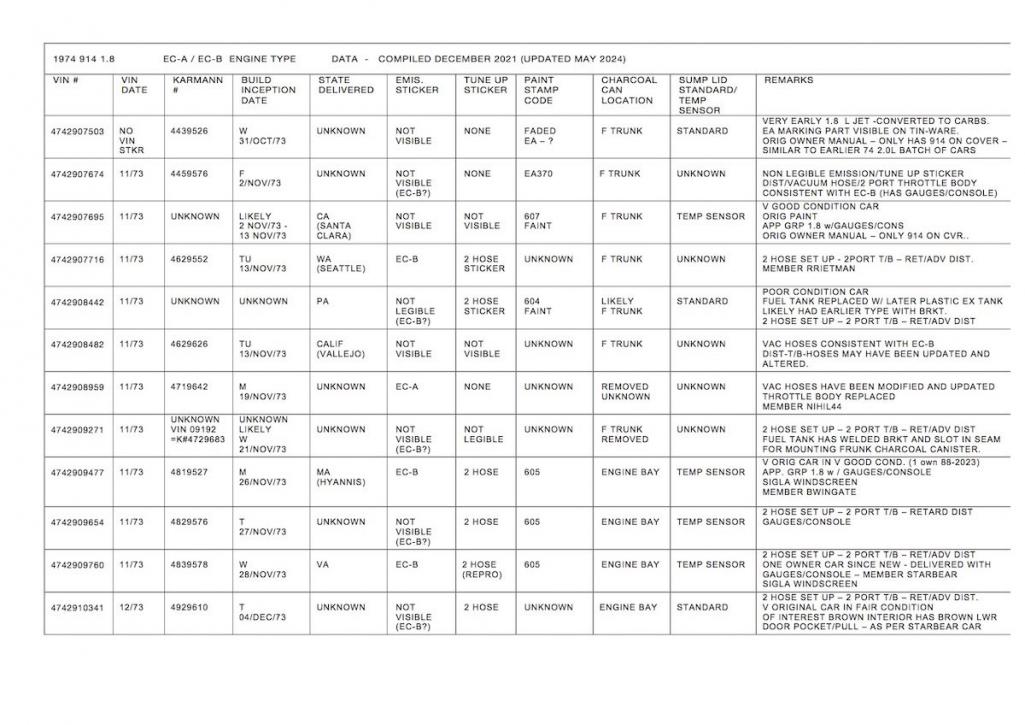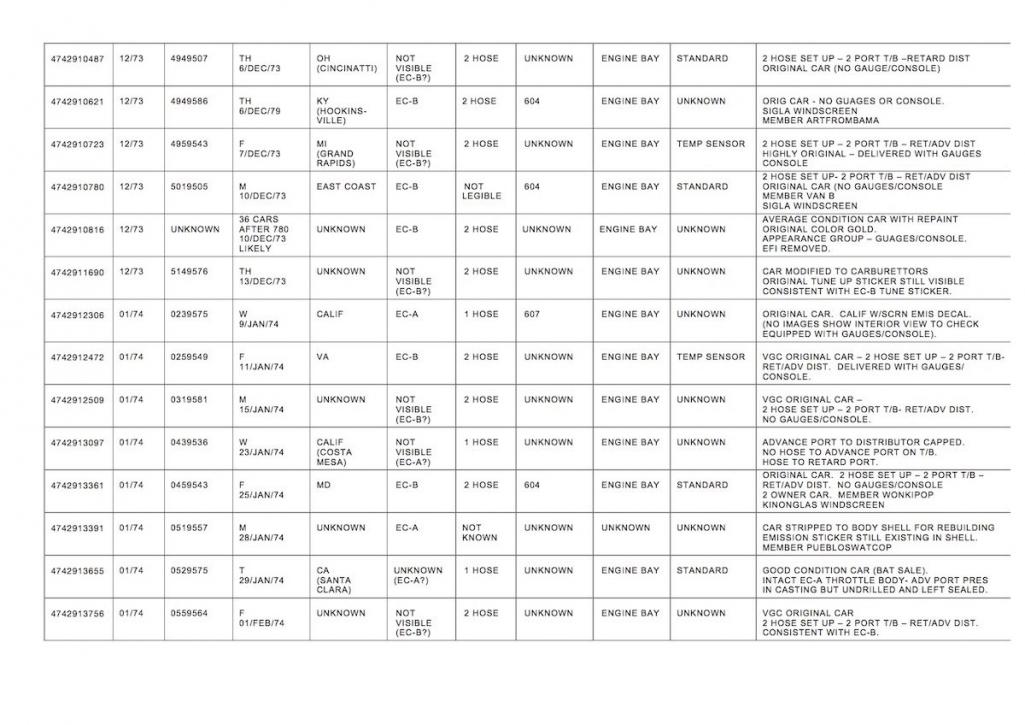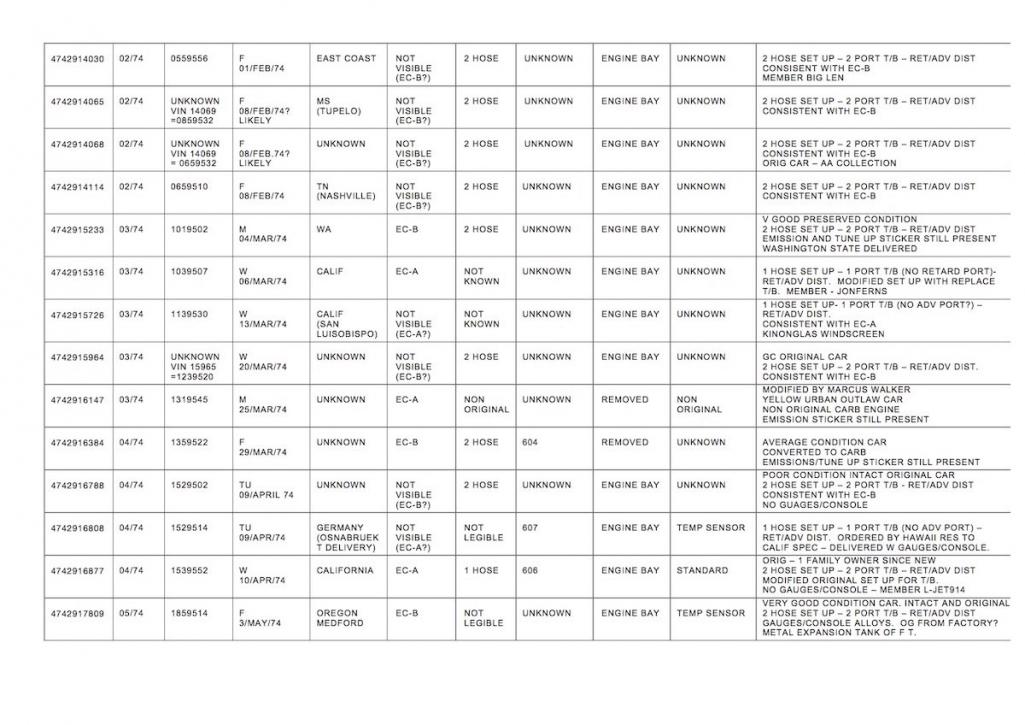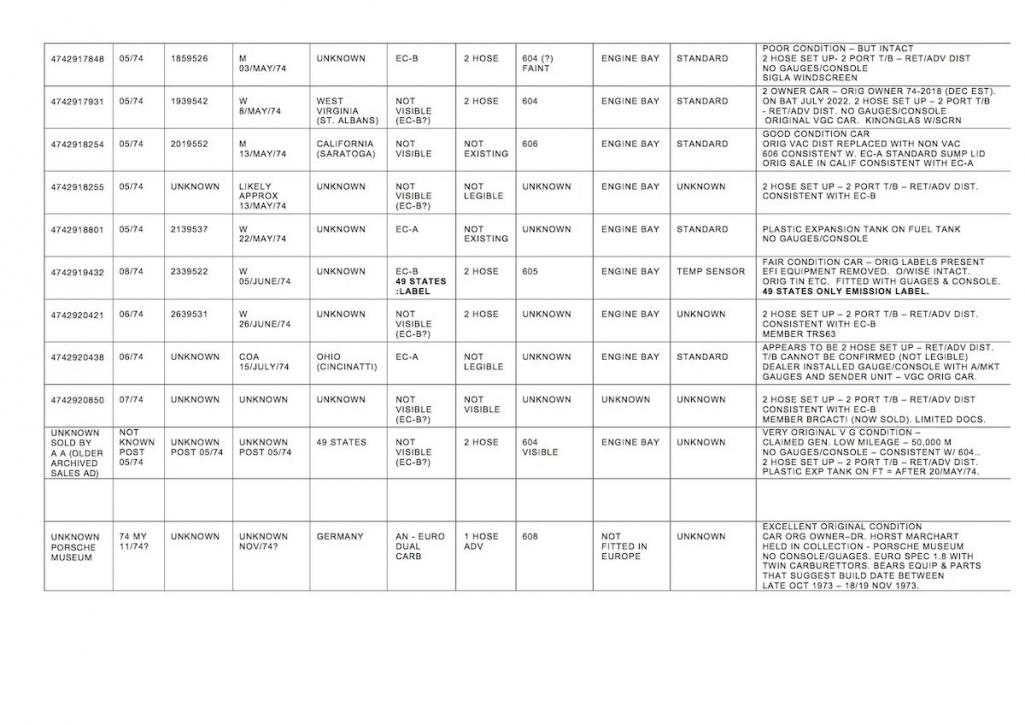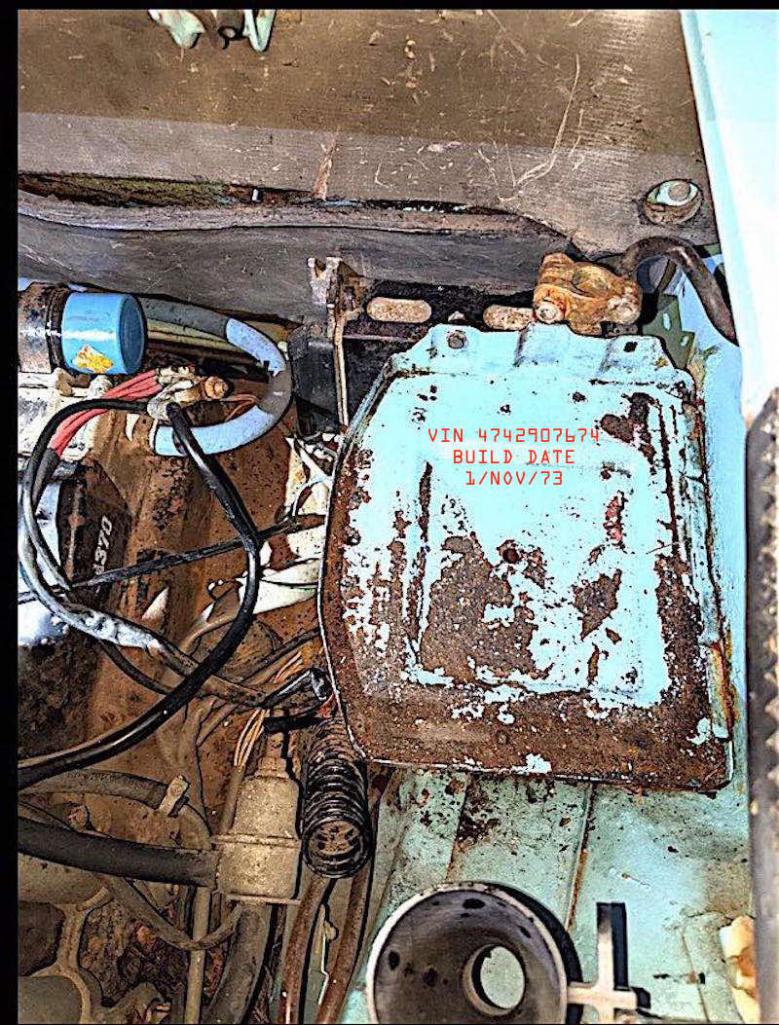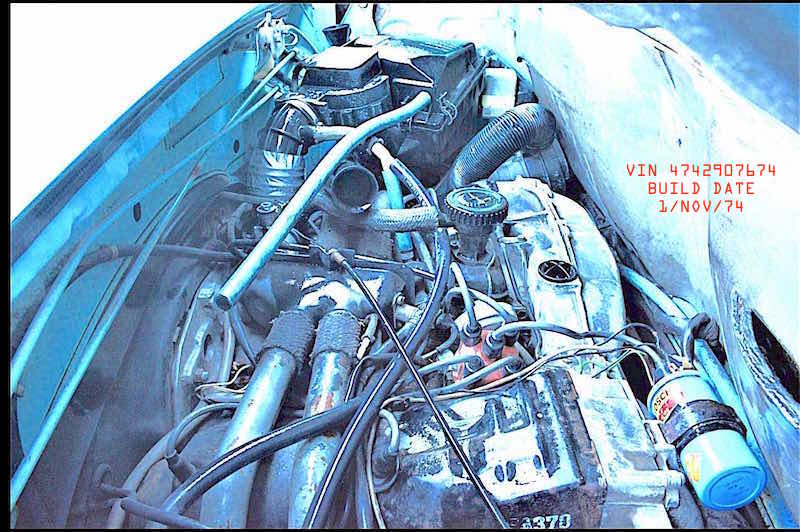|
|

|
Porsche, and the Porsche crest are registered trademarks of Dr. Ing. h.c. F. Porsche AG.
This site is not affiliated with Porsche in any way. Its only purpose is to provide an online forum for car enthusiasts. All other trademarks are property of their respective owners. |
|
|
 Model Specific Information
Model Specific Information
914/4: 70 71 72 73 74 75 76 914/6: 70 71 72
  |
| wonkipop |
 Dec 25 2021, 05:12 PM Dec 25 2021, 05:12 PM
Post
#1
|
|
Advanced Member     Group: Members Posts: 4,670 Joined: 6-May 20 From: north antarctica Member No.: 24,231 Region Association: NineFourteenerVille 
|
i'll be dropping the information we have gathered over Dec 2021 in with a set of posts.
the material was prompted by mr b ( @JeffBowlsby ) who observed that for the 74 MY there was an EC-A and an EC-B engine. mr b's thought was that the EC-A was a 49 states car and and EC-B was a californian car for emissions. mr b's view was rational and reasoned. 73 EA engines are 49 states. 73 EB engines are california. 75 engines are documented in factory literature as EC-a (49 states) and EC-b (california). the logic should follow? BUT as per the mystery of the 914, the truth about 74 1.8s turns out stranger than fiction (or common sense?). the material is not necessary to running a 1.8 or having fun with a 14. (IMG:style_emoticons/default/smile.gif) its for historical purposes and as information to 74 1.8 owners to assist with restoration if they want it. |
| wonkipop |
 Dec 25 2021, 05:14 PM Dec 25 2021, 05:14 PM
Post
#2
|
|
Advanced Member     Group: Members Posts: 4,670 Joined: 6-May 20 From: north antarctica Member No.: 24,231 Region Association: NineFourteenerVille 
|
|
| wonkipop |
 Dec 25 2021, 05:19 PM Dec 25 2021, 05:19 PM
Post
#3
|
|
Advanced Member     Group: Members Posts: 4,670 Joined: 6-May 20 From: north antarctica Member No.: 24,231 Region Association: NineFourteenerVille 
|
DATE - UP DATE OF VAPOR EMISSION CONTROL SYSTEM.
location of charcoal canister location changed from front trunk to engine bay. 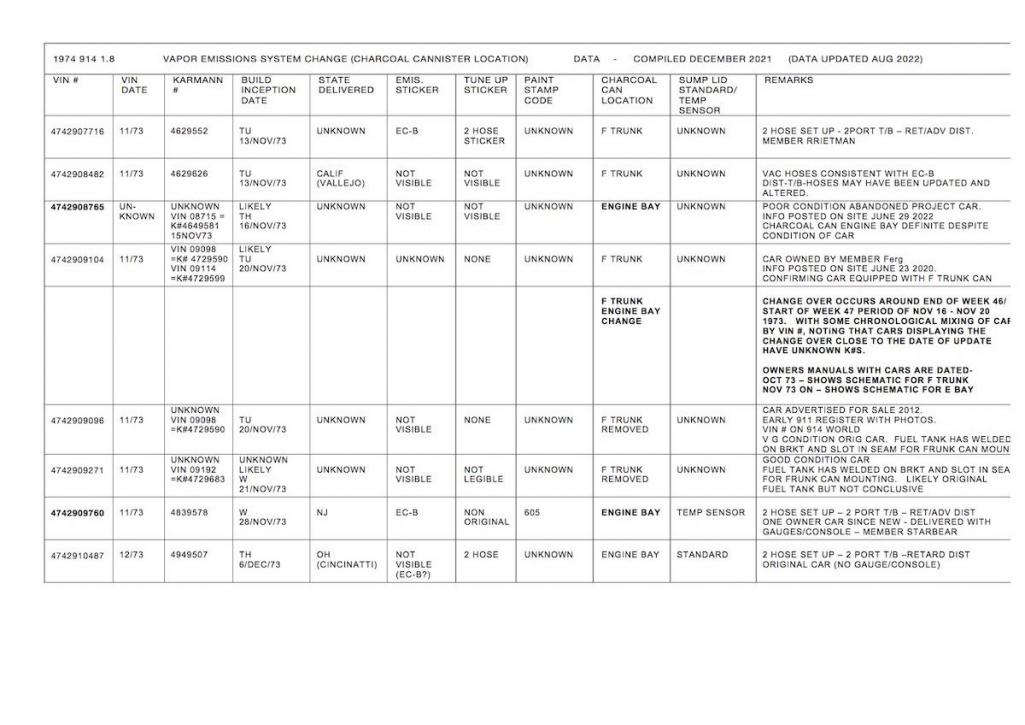 EDIT MAY 2022 changeover from frunk canister to engine bay canister occurs after VIN 4742909096 and 4742909104 on 20 Nov 1973. refer page 2 of this thread for information/data. EDIT JUNE 2022 a further example came to light. VIN 4742908765 with engine can. indicates changeover either side of weekend 17/18 Nov 1973. Vins may not be in strict chronological order exhibiting the can location change as some Vin cars are completed in a different order to the production plate #s. refer page 2 of this thread for information/data. EDIT AUG 2022 to note regarding 4742909096 & 4742909271 - insufficient data was available to determine if these cars may have had earlier fuel tank type fitted while canister location had been updated to engine bay. it remains a possibility that the charcoal can location was updated as early as 4742908765 and stocks of earlier fuel tanks were used until depleted to be replaced by updated fuel tank with mounting bracket and seam slot no longer included. |
| wonkipop |
 Dec 25 2021, 05:41 PM Dec 25 2021, 05:41 PM
Post
#4
|
|
Advanced Member     Group: Members Posts: 4,670 Joined: 6-May 20 From: north antarctica Member No.: 24,231 Region Association: NineFourteenerVille 
|
EC-A and EC-B engines are most obviously identified by (1) and characterised by (2) & (3).
1) emission sticker located on the lhs of the engine bay above the relay board container. 2) engine tune-up sticker located on the lhs of the engine on the upper tin next to the fan housing casting. 3) a painted number stamp located on the engine tinware in various locations. ----------------- EC-A 1. emission sticker. 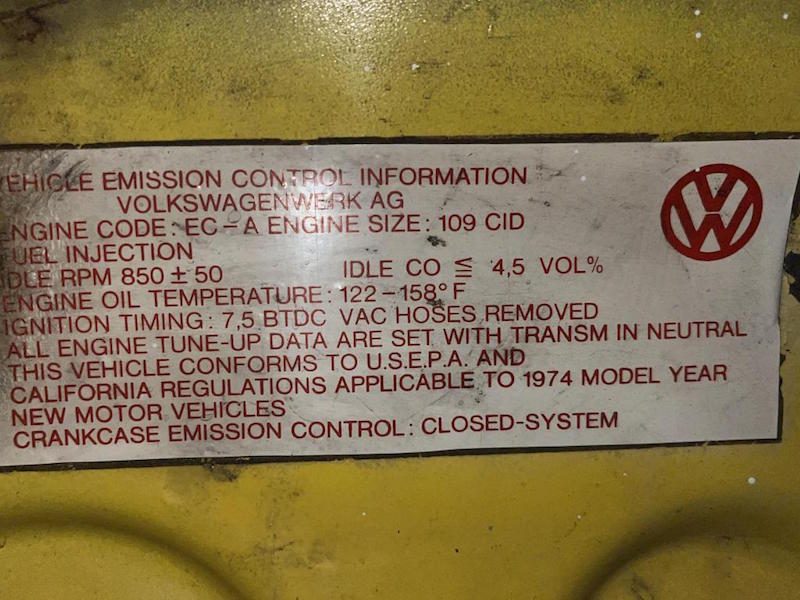 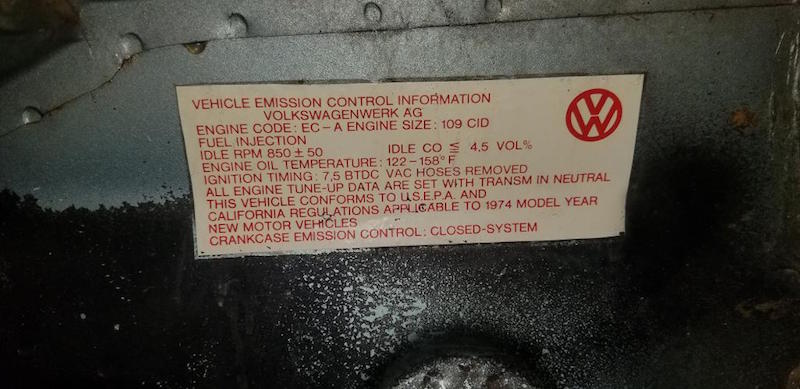 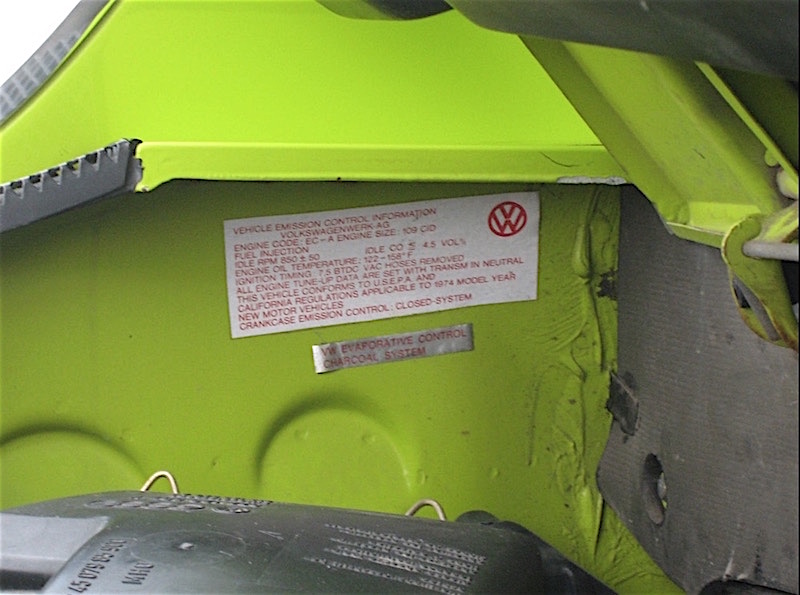 note - indicates USEPA and California conforming. 2. engine tune-up sticker 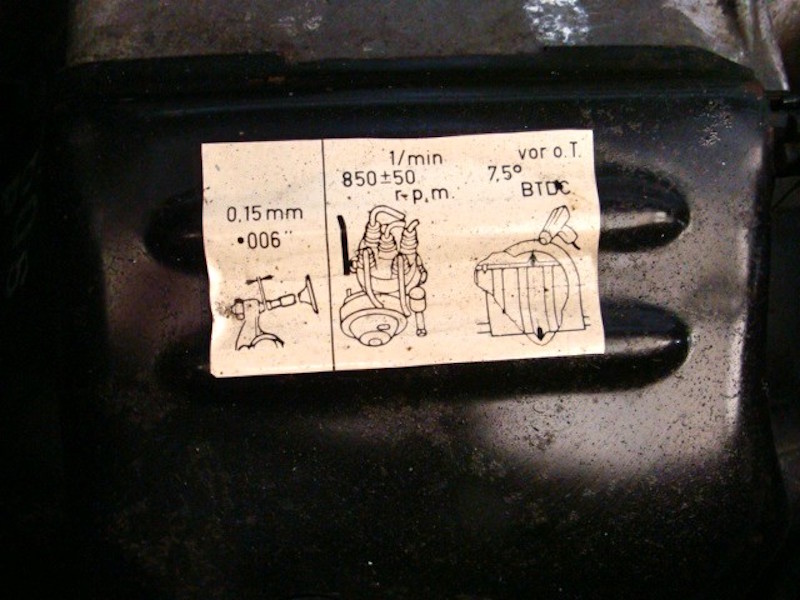 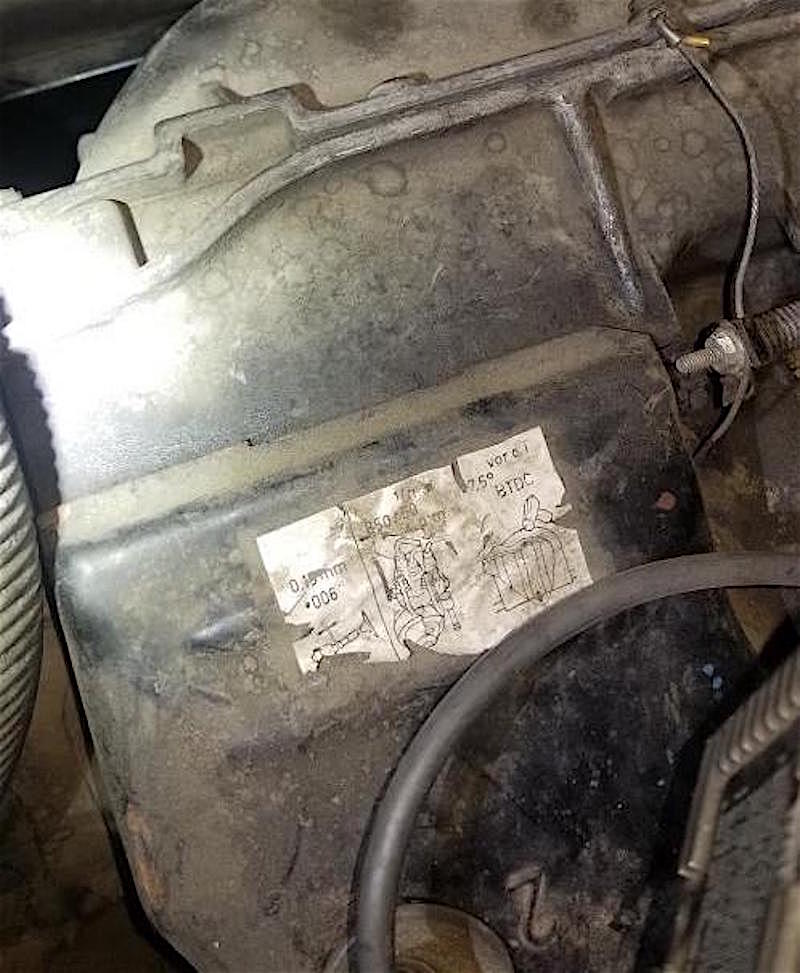 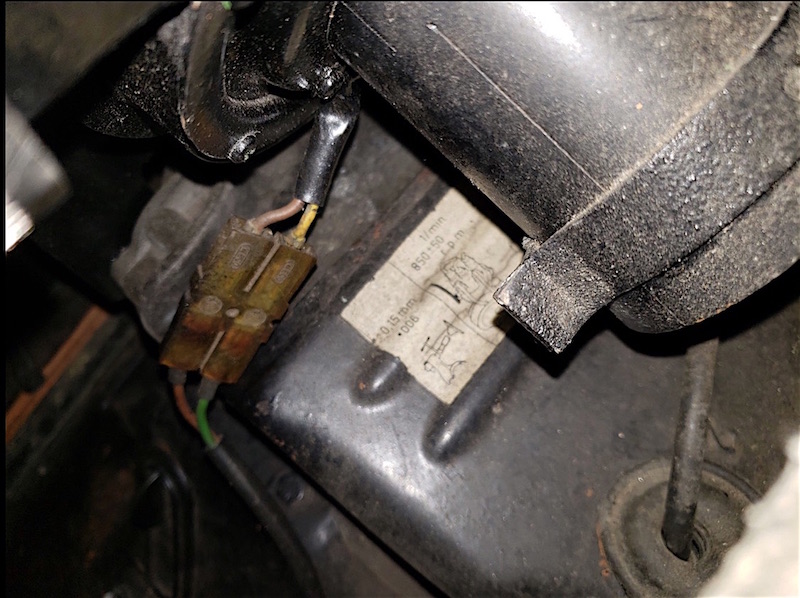 note - tune-up sticker indicates one vac hose to distributor (disconnected for tune up settings). 3. painted number stamp 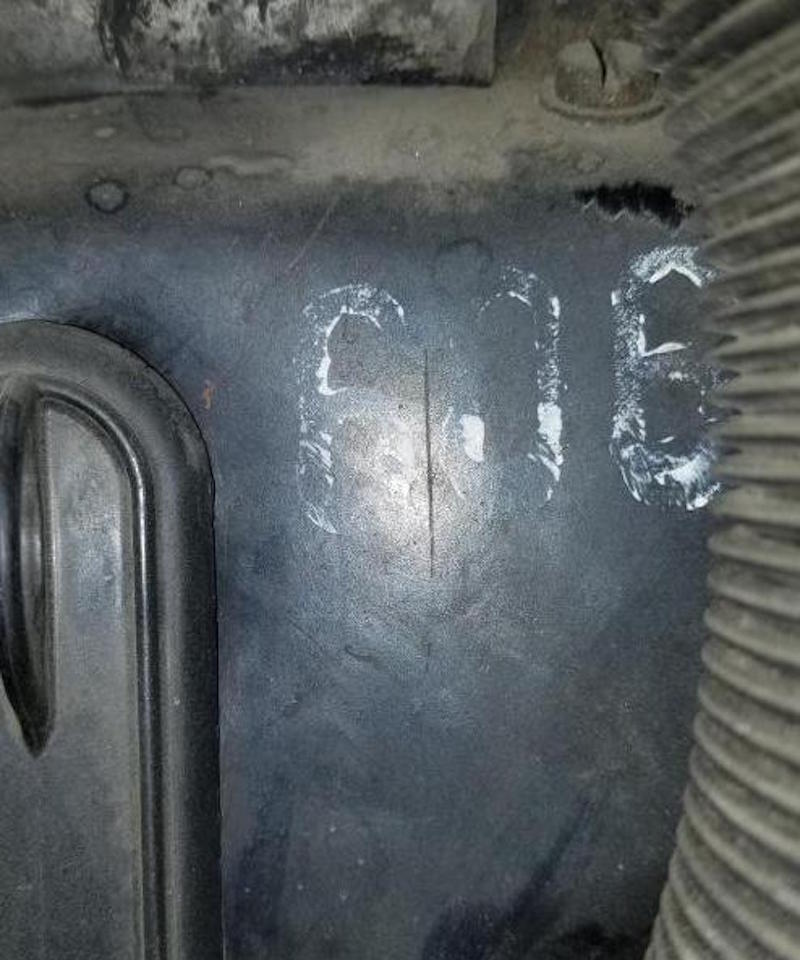 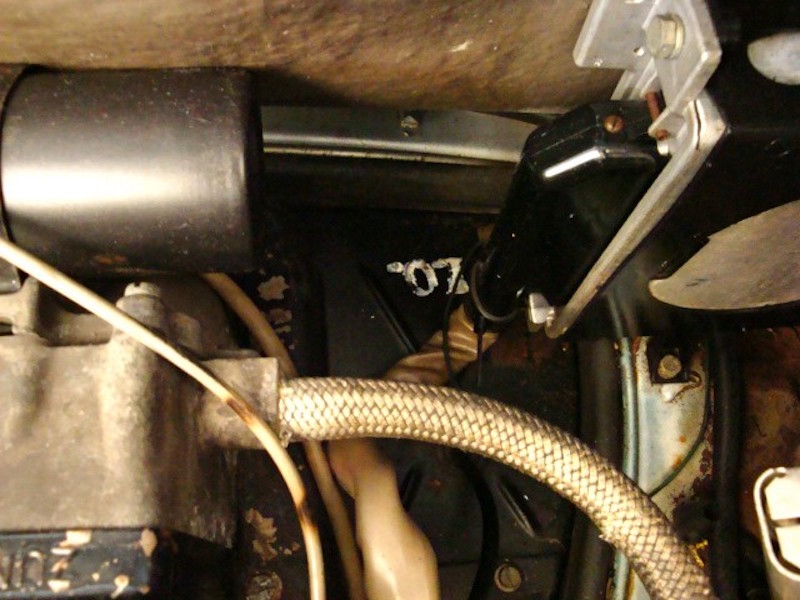 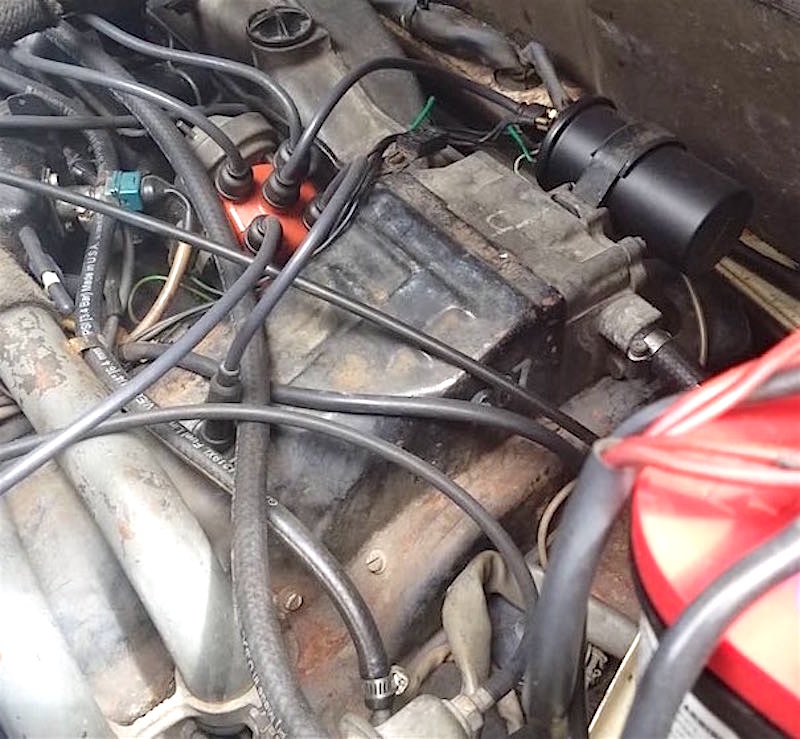 numbers documented on EC-A were 606 and 607. location - lhs or rhs engine tin or rhs engine tin apron. ----------------------- EC-B 1. emission sticker 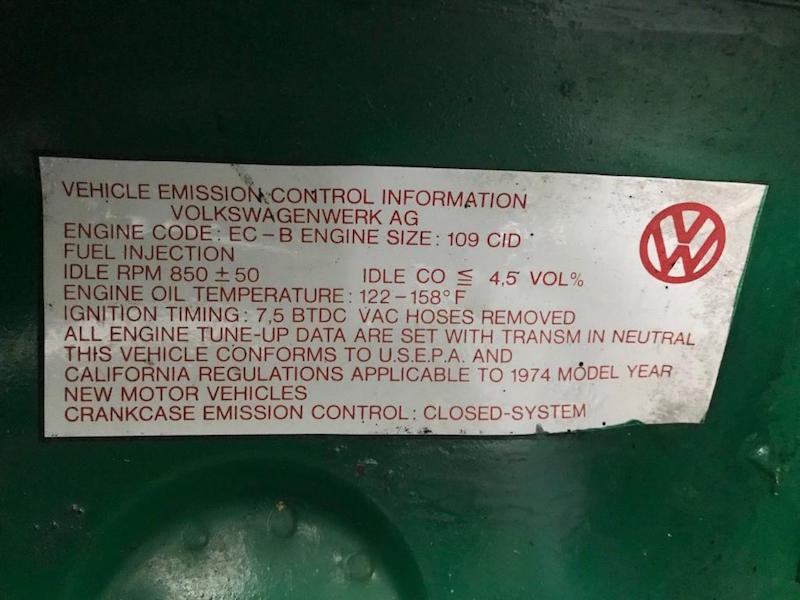 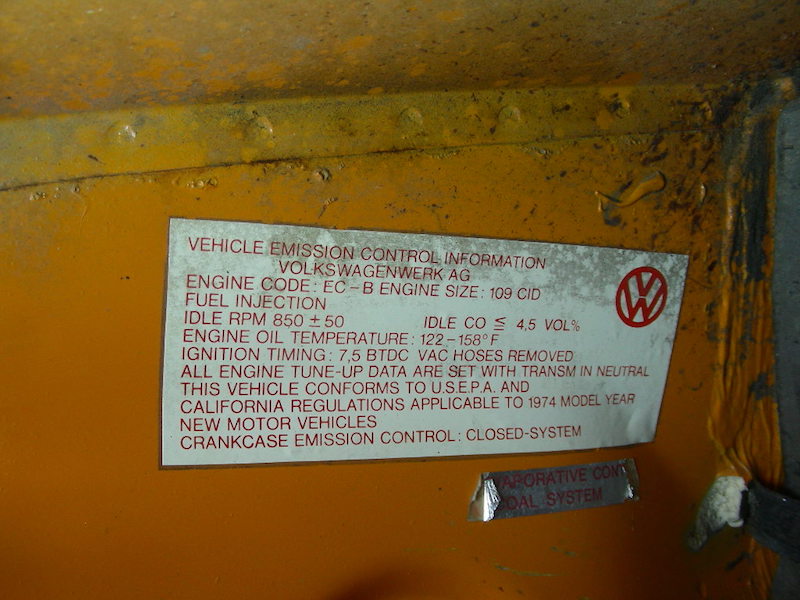 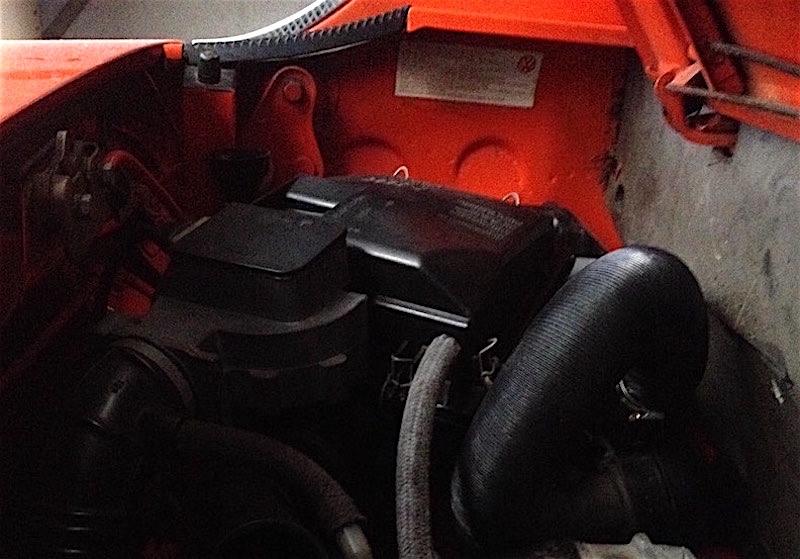 note - indicates USEPA and California conforming. 2. tune-up sticker 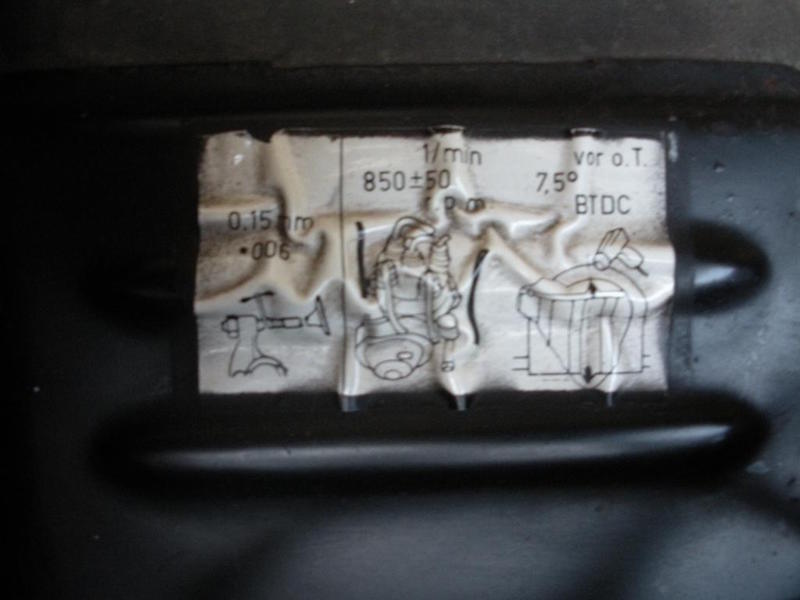 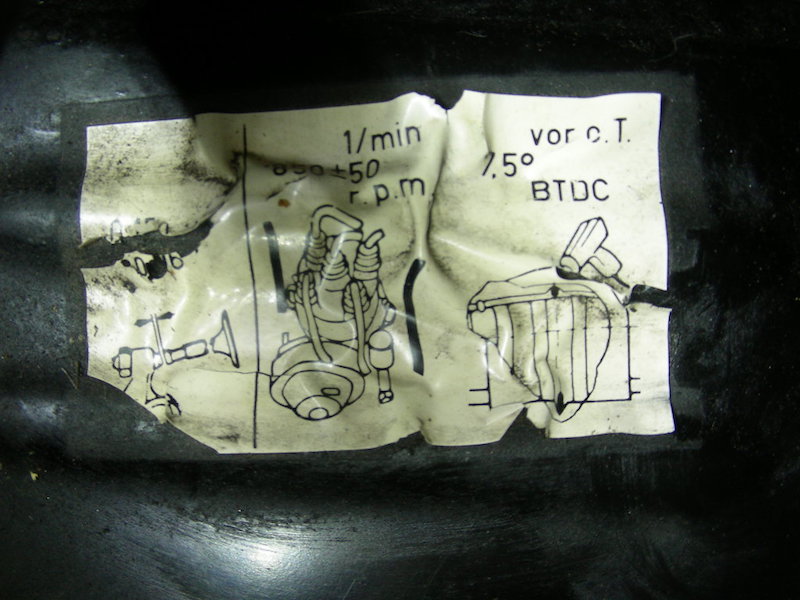 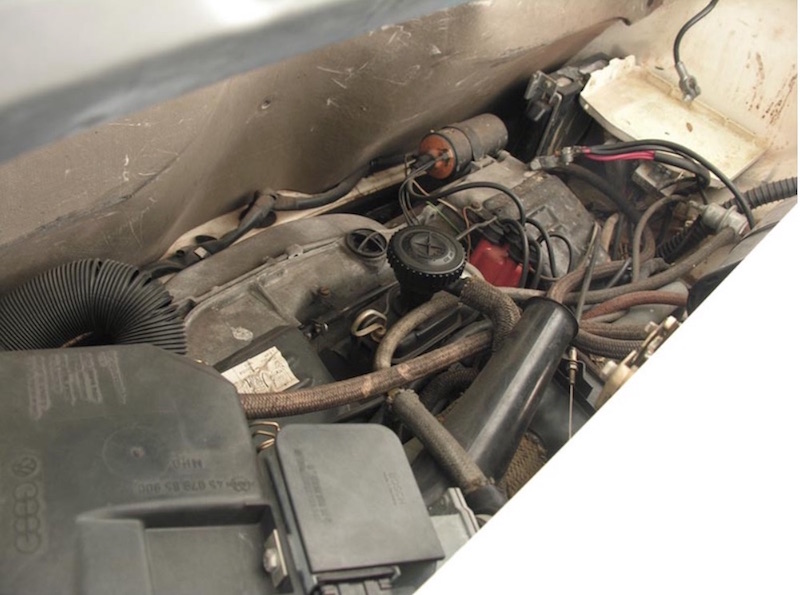 note - tune-up sticker indicates two vac hoses to distributor (disconnected for tune up settings). 3. painted number stamp 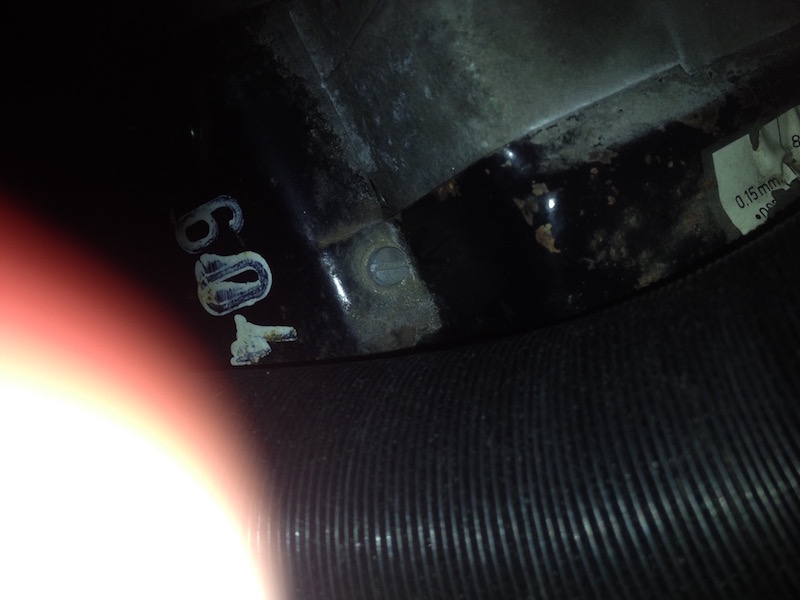 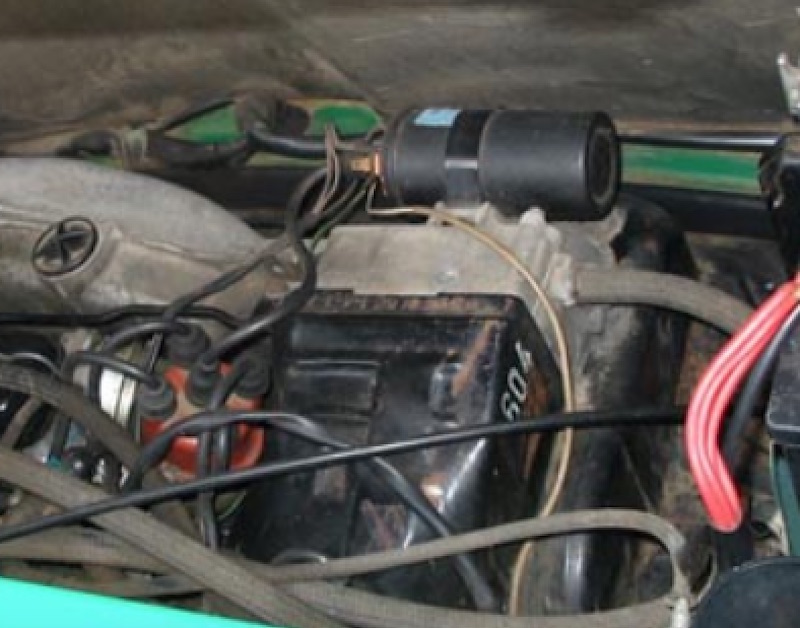 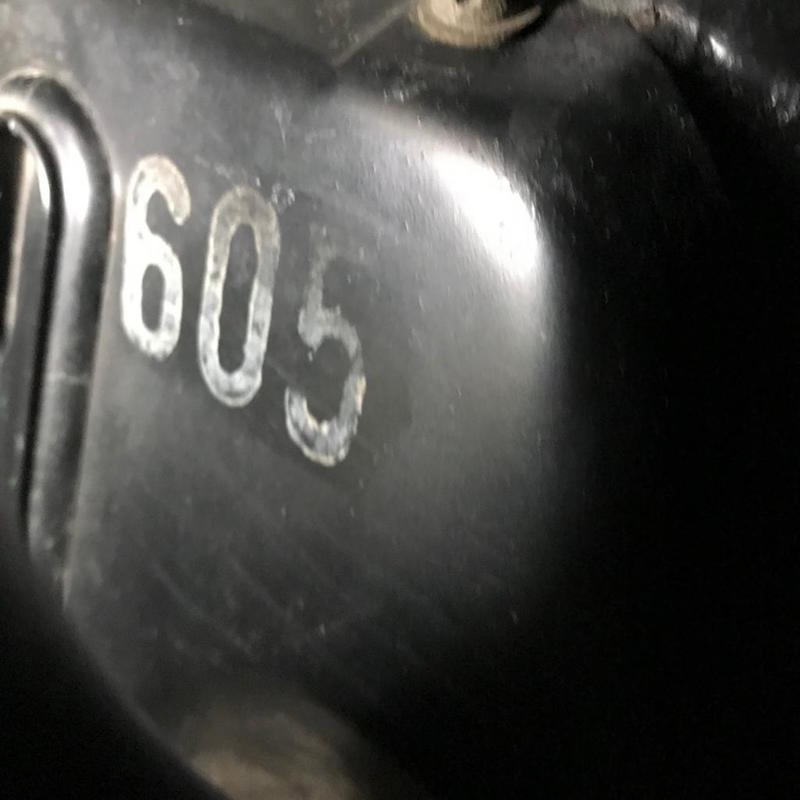 numbers documented for EC-B engines were 604 and 605. location - lhs or rhs engine tin. |
| wonkipop |
 Dec 25 2021, 05:47 PM Dec 25 2021, 05:47 PM
Post
#5
|
|
Advanced Member     Group: Members Posts: 4,670 Joined: 6-May 20 From: north antarctica Member No.: 24,231 Region Association: NineFourteenerVille 
|
emission stickers indicate that both engine versions are california + USA conforming and there is no distinction between EC-A and EC-B (more on that later).
tune-up stickers indicate there is a difference between EC-A and EC-B. EC-B engines make use of both vacuum advance and retard feature of the distributor. (2 hoses shown disconnected) EC-A engines make use only of the vac retard feature. (1 hose shown - on retard side and disconnected) the vac cannister on the distributor is connected to the throttle body. the tune up sticker implies - a) a different throttle body for the EC-A with only a vac connection for retard. b) a throttle body for the EC-B with vac connections for advance and retard. the parts catalogue has the following information: 1. replacement engine. two part numbers are noted for replacement engines up to EC0 037 551 (end of 74 MY). one for california. other for USA.  2. throttle body two throttle bodies are noted for engines up to EC0 037 551. one for california. other for USA. 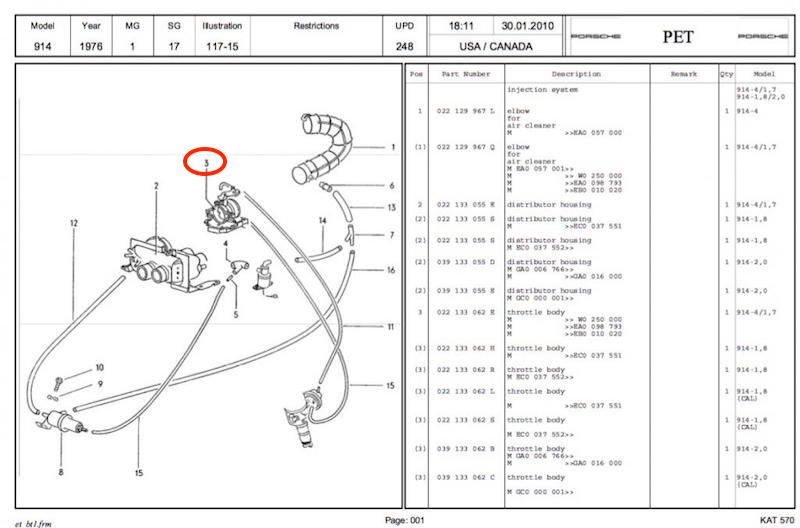  3. distributor only one distributor is noted for engines up to EC0 037 551.  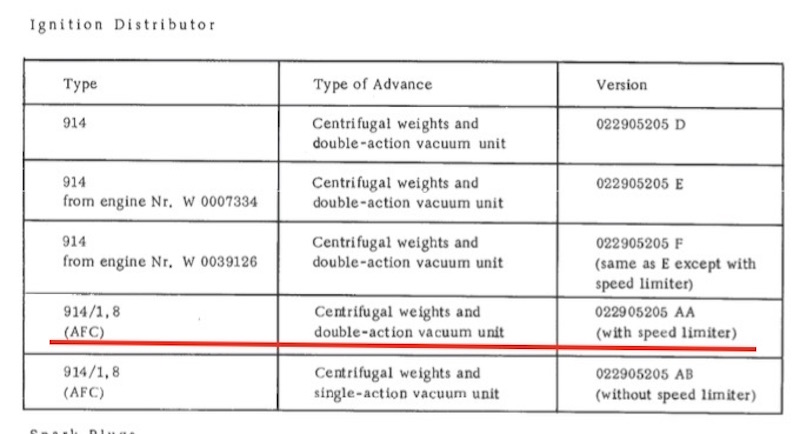 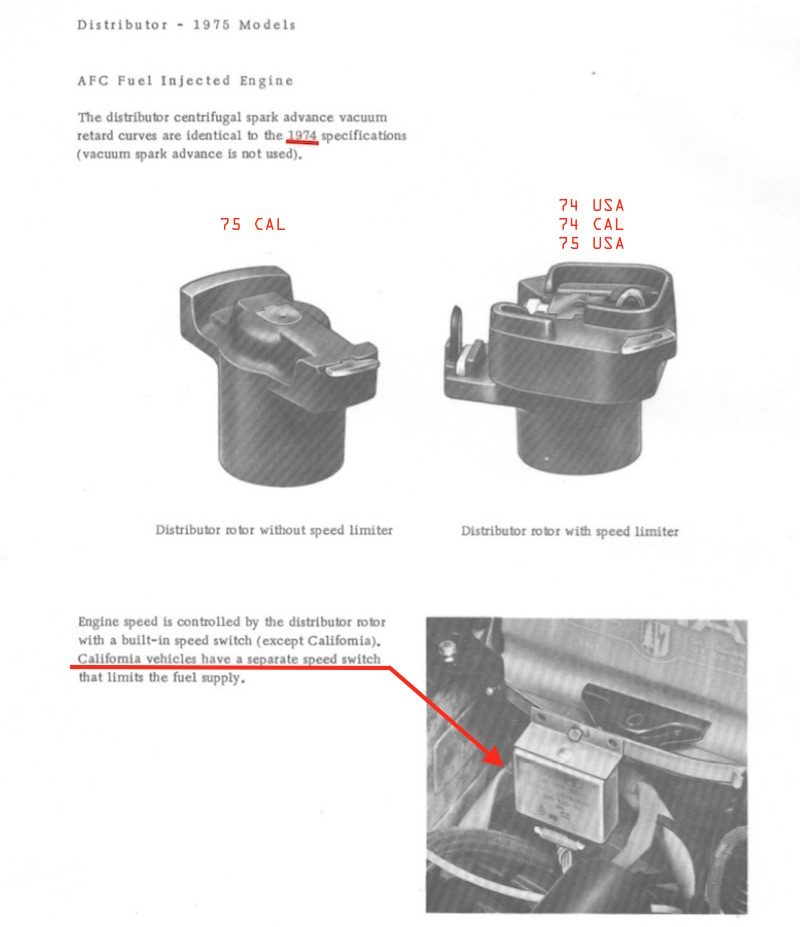 4. ecu the ecu for 1974 was a single unit for all 1.8s 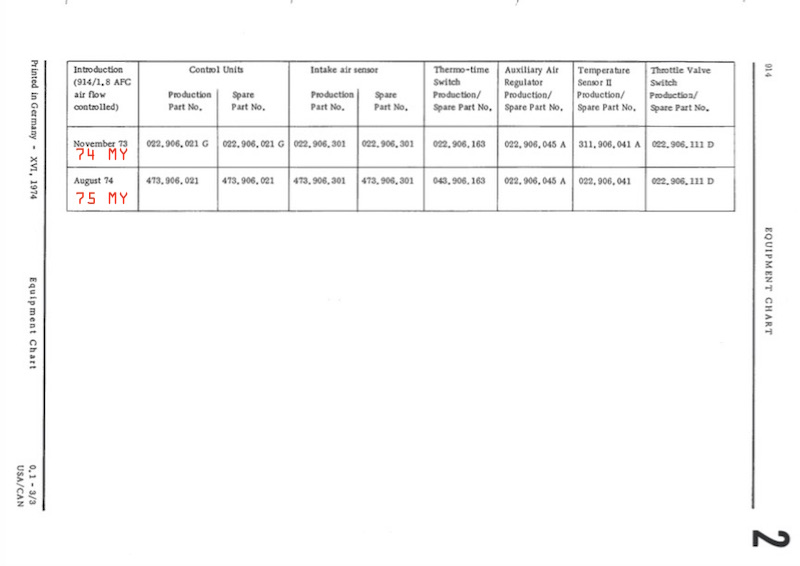 neither the parts manual or the factory workshop manual makes it absolutely clear what the difference between 1974 USA/california models is in terms of distributor vacuum hose set up and throttle body appearance. nor does the parts manual link the differences it does indicate to either an EC-A or EC-B designation. ----------------------- CARB (californian air resources board) EXECUTIVE ORDER A-7-5. (information provided by member L-JET914 the executive order covers approval for the sale of 914 models in california. it was first issued 29 Jan 74 for 3 months, then rescinded on 25th Mar 1974 with a further approval for 3 months and a further 30 days (to the end of MY 74). the order also indicates that 74 1.8s were not available/approved for sale until jan 74 - almost one third into the 74 MY. the document makes it clear that the approval is for engine type EC-a. the engine type has a distributor with only centrifugal advance and vacuum retard function (no vac advance function). this document supports the EC-A as the california only engine (with associated parts) indicated in the parts catalogue. 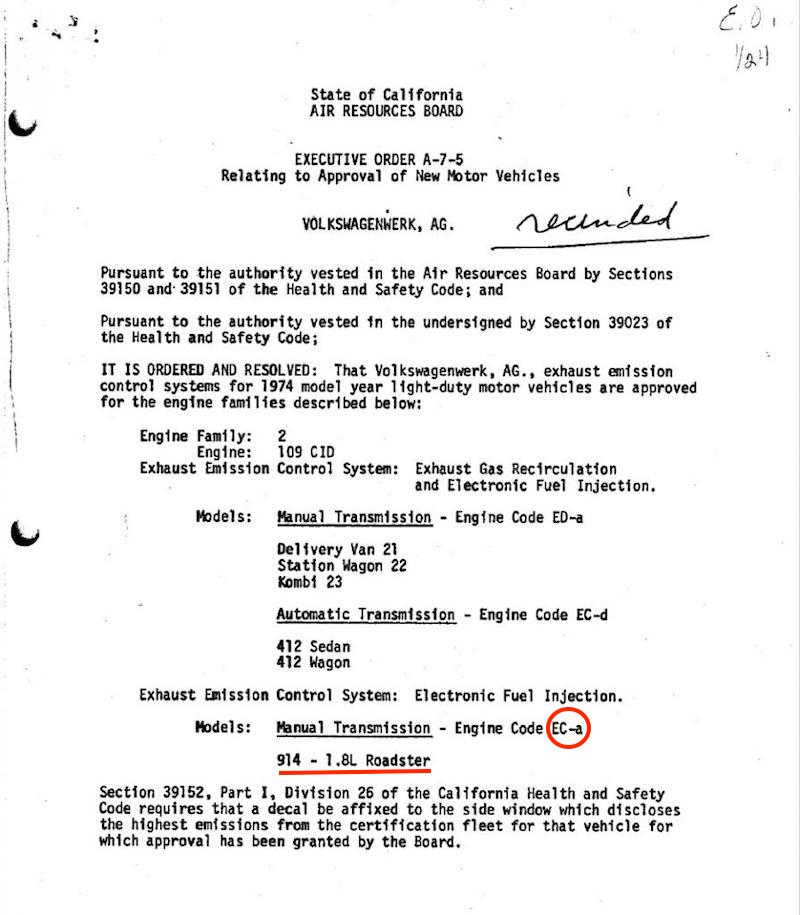 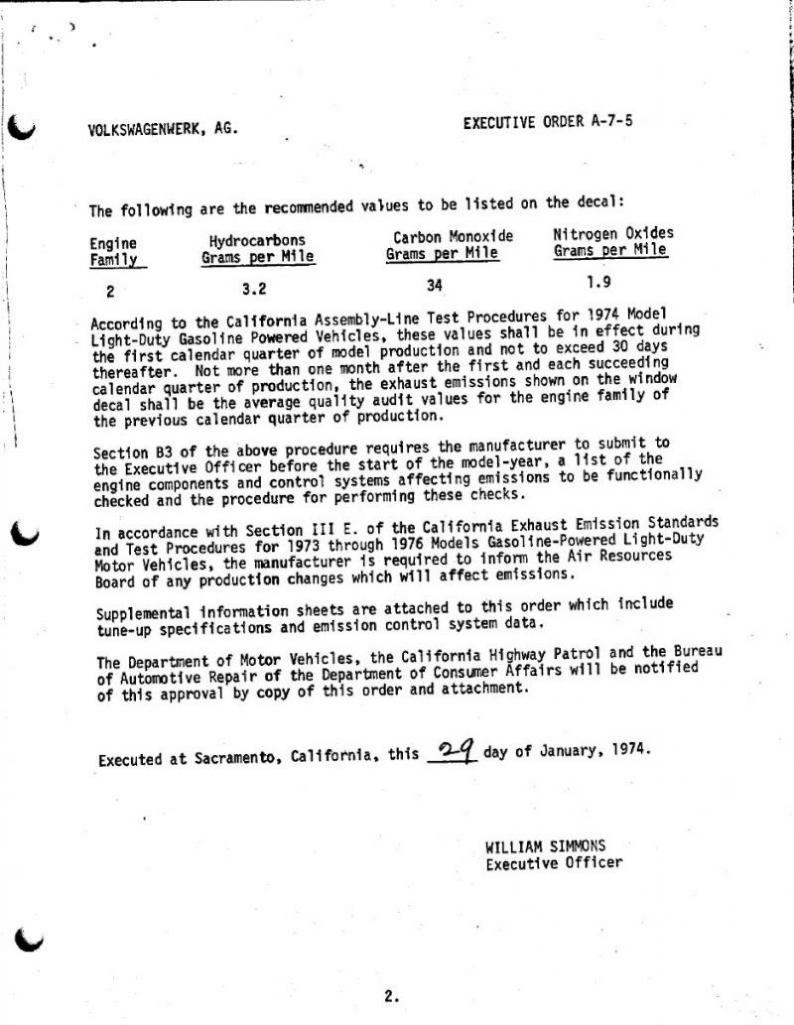 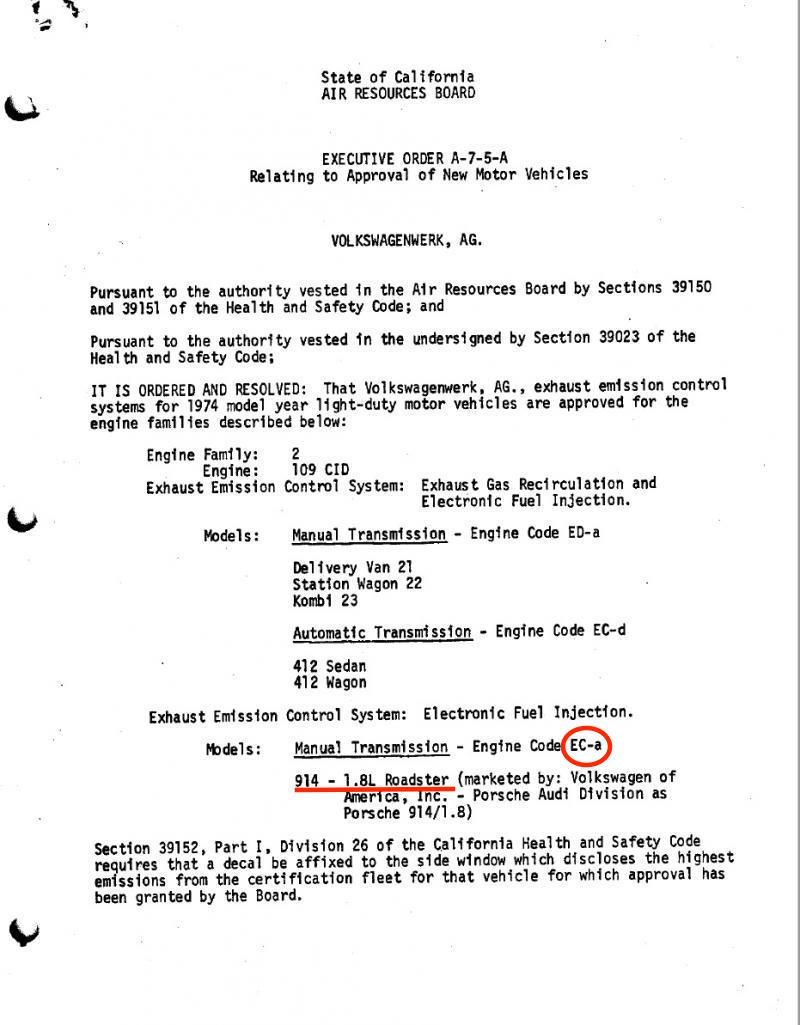 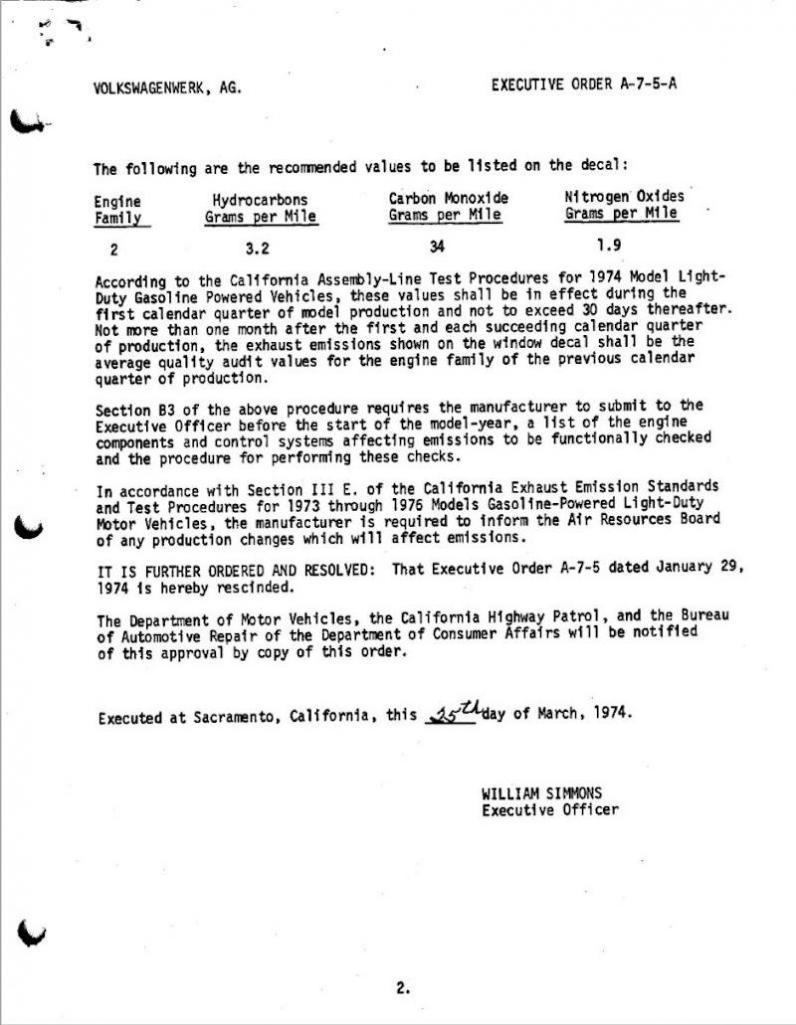 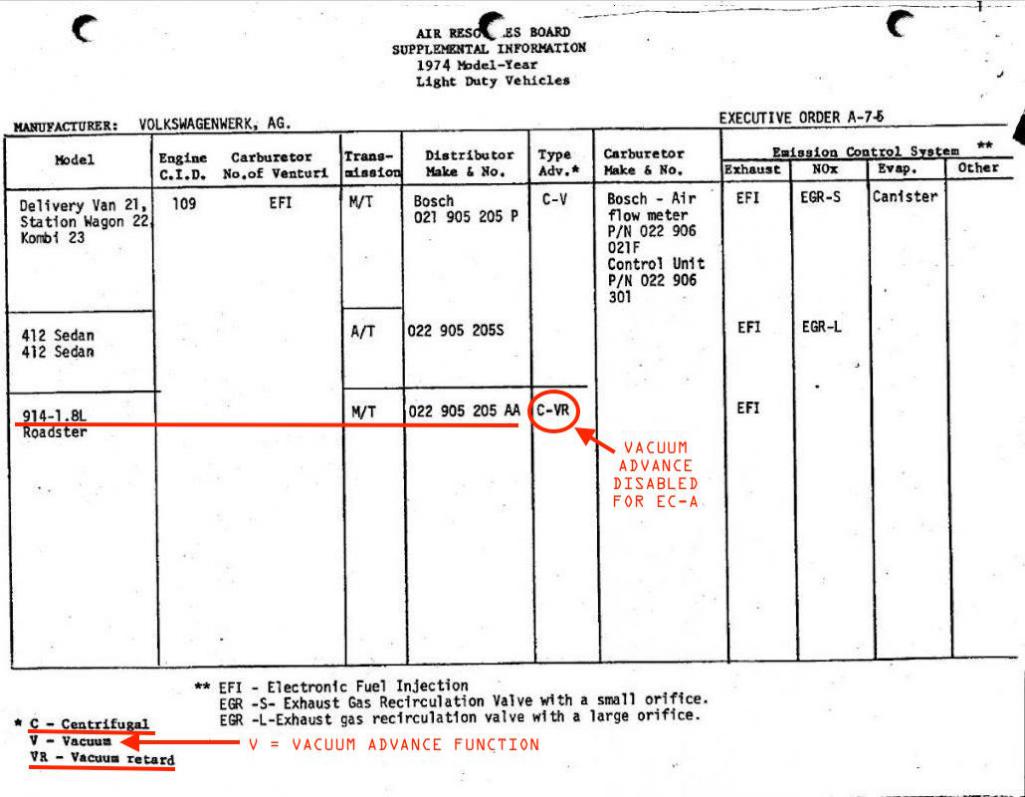 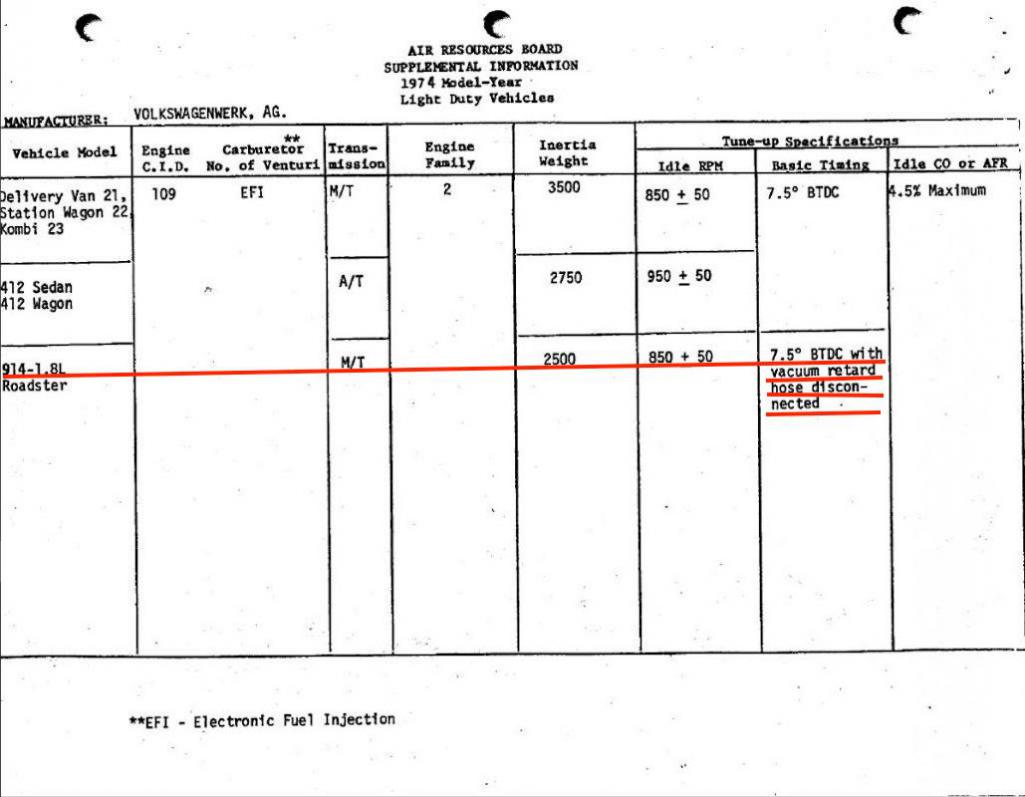 member survey / advertised cars data indicates EC-A engined cars were sold new in california (established by original sale receipts / orders). there was one exception (more on that later). the same data indicates EC-B engined cars were sold new in the 49 states. this does not explain emission stickers that do not distinguish between california and 49 states. there may be an explanation for that (more on that later). however it would seem on the basis of factory documents, CARB documents and sales documents that the EC-A engines were california and the EC-B engines were 49 state. |
| wonkipop |
 Dec 25 2021, 06:29 PM Dec 25 2021, 06:29 PM
Post
#6
|
|
Advanced Member     Group: Members Posts: 4,670 Joined: 6-May 20 From: north antarctica Member No.: 24,231 Region Association: NineFourteenerVille 
|
more to come
|
| RRietman |
 Dec 25 2021, 07:41 PM Dec 25 2021, 07:41 PM
Post
#7
|
|
Member   Group: Members Posts: 102 Joined: 13-December 09 From: Pacific Northwest USA Member No.: 11,124 Region Association: None 
|
|
| wonkipop |
 Dec 25 2021, 08:24 PM Dec 25 2021, 08:24 PM
Post
#8
|
|
Advanced Member     Group: Members Posts: 4,670 Joined: 6-May 20 From: north antarctica Member No.: 24,231 Region Association: NineFourteenerVille 
|
thanks for that info randy
i revised the schedule to get that info in. point of sale confirms the pattern - yours being an EC-B. all this is thanks to mr. b he asked the question. we just looked for the answer. its not that hard to do now thanks to the internet. for a start its easy for us to all communicate through this website. and its amazing what you can pull down from EPA archives etc with the right search terms. the american bureaucracy really has digitized their records to an extent that is astonishing. (IMG:style_emoticons/default/beerchug.gif) + there are cars like yours and starbears. he knows everything that has been done to his car since the day he drove it out of the showroom. not many cars and owners like that still around. (IMG:style_emoticons/default/smile.gif) may as well get it all down on the record. we are not here forever. |
| wonkipop |
 Dec 25 2021, 09:06 PM Dec 25 2021, 09:06 PM
Post
#9
|
|
Advanced Member     Group: Members Posts: 4,670 Joined: 6-May 20 From: north antarctica Member No.: 24,231 Region Association: NineFourteenerVille 
|
EC-A / EC-B THROTTLE BODY AND DISTRIBUTOR WITH VAC HOSE SET UP.
-------------------- EC-A note. few if any EC-A set ups seem to have survived intact. or if present on very original cars as found in well documented BAT sales photo galleries the images did not present clear views of the throttle body. the cars were known to wear out throttle bodies so many could have been replaced with throttle bodies either from EC-Bs or other model VWs with similar dimensioned throttle bodies. it is also possible that EC-As were revised by owners to EC-B set ups (more on that later). what is known is that the 49 state 1975 1.8 had a similar set up to the 1974 EC-A california car. it utilised only the vac retard side of the distributor. (refer factory workshop manual regarding distributors for 1975). a photo of an intact 1975 1.8 is used here. the 1974 EC-A 1.8 either used this throttle body or it utilized the 74 EC-B throttle body with the vacuum advance port capped by the factory with a seal. 1. Throttle body. (75 EC-a 49 state car). 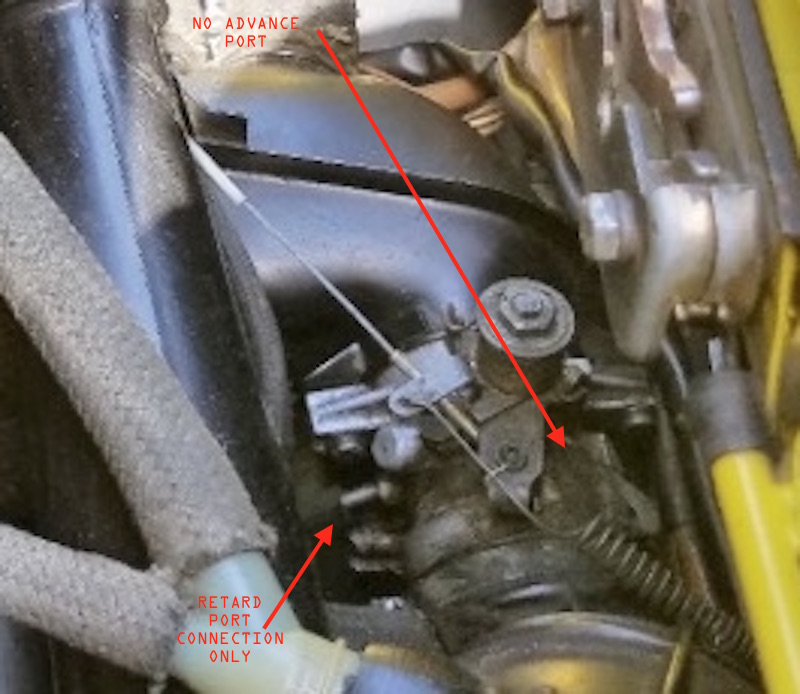 2. Distributor and vac hose set up. 74 EC-A california. from known EC-A cars documented with either an EC-A emission sticker visible or with a matching EC-A single hose tune-up sticker visible in documented images. 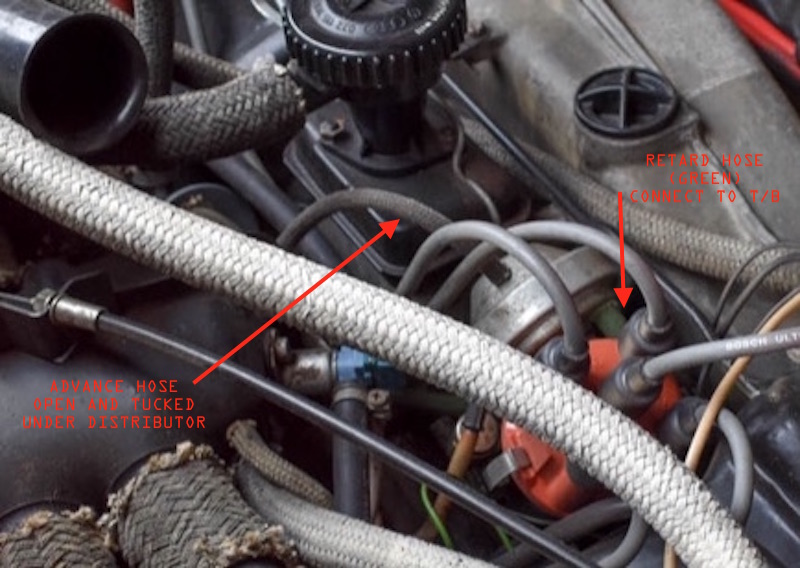 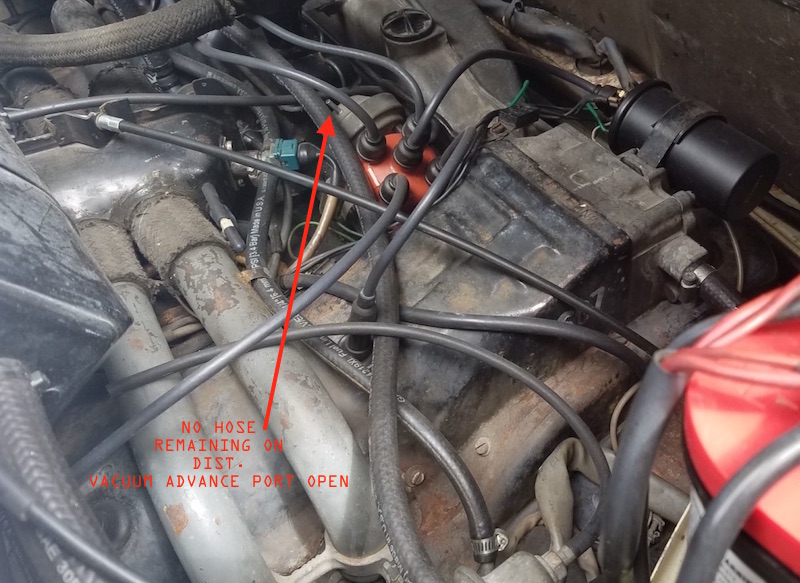 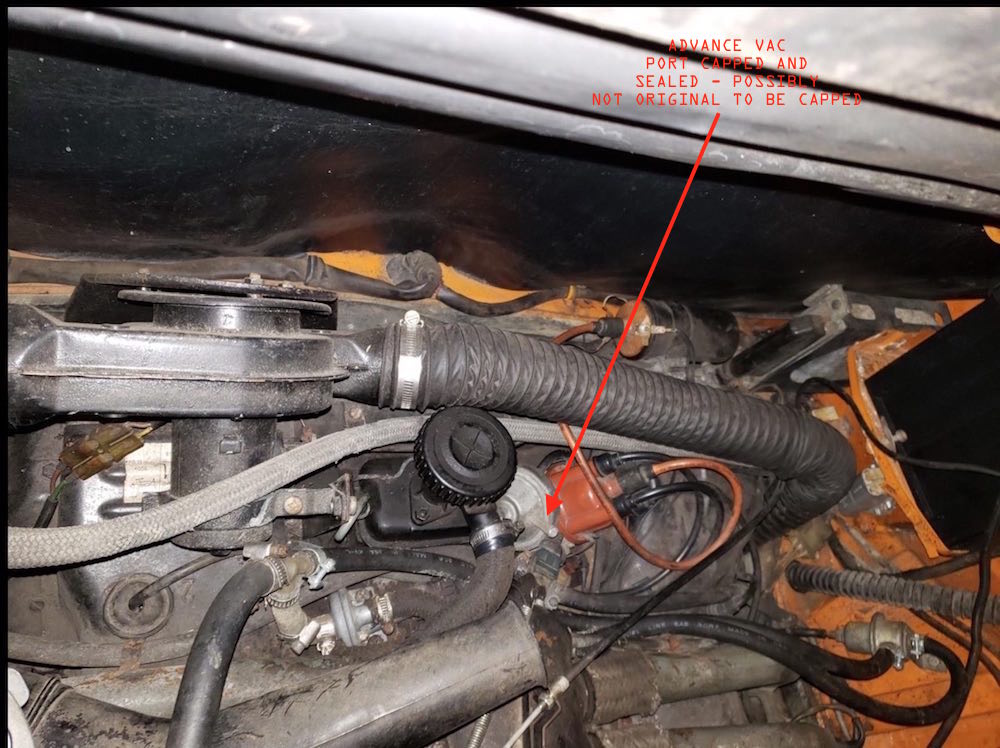 ----------------------- EC-B images are of known original condition EC-B cars. (StarBear car & wonkipop car). all member EC-B cars matched. all well documented recent sales with extensive image galleries had matching set ups. 1. Throttle body 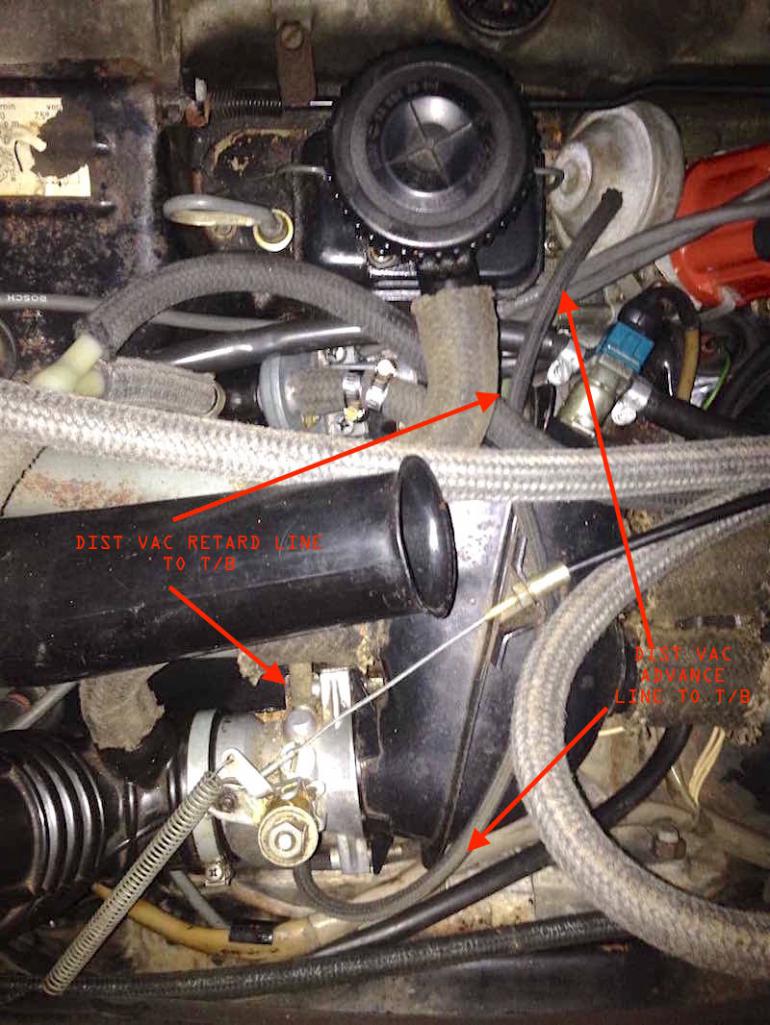 early throttle body (StarBear car) nov 73 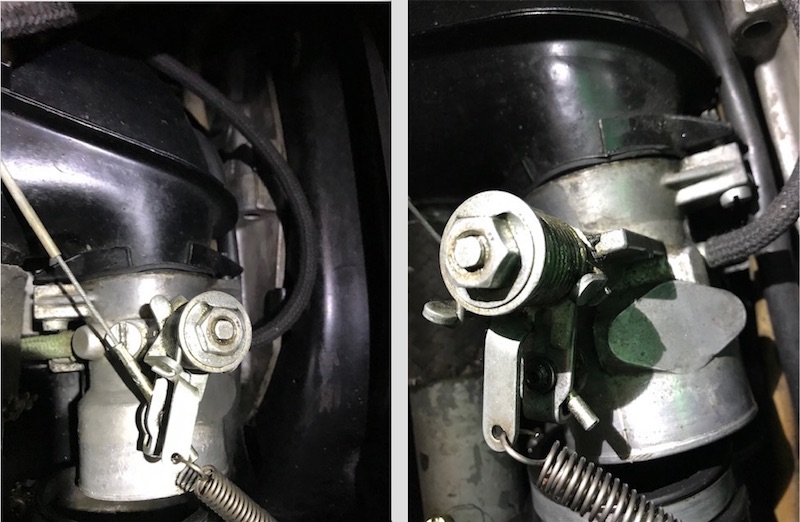 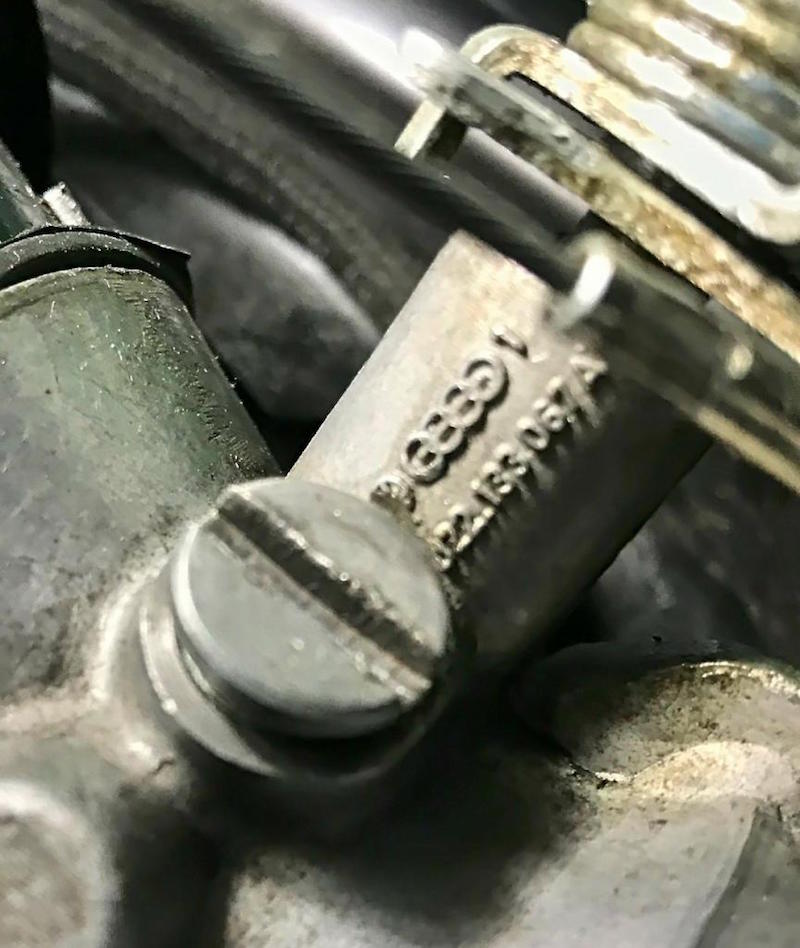 slightly later throttle body (wonkipop car) jan 74 part number stamping location altered. 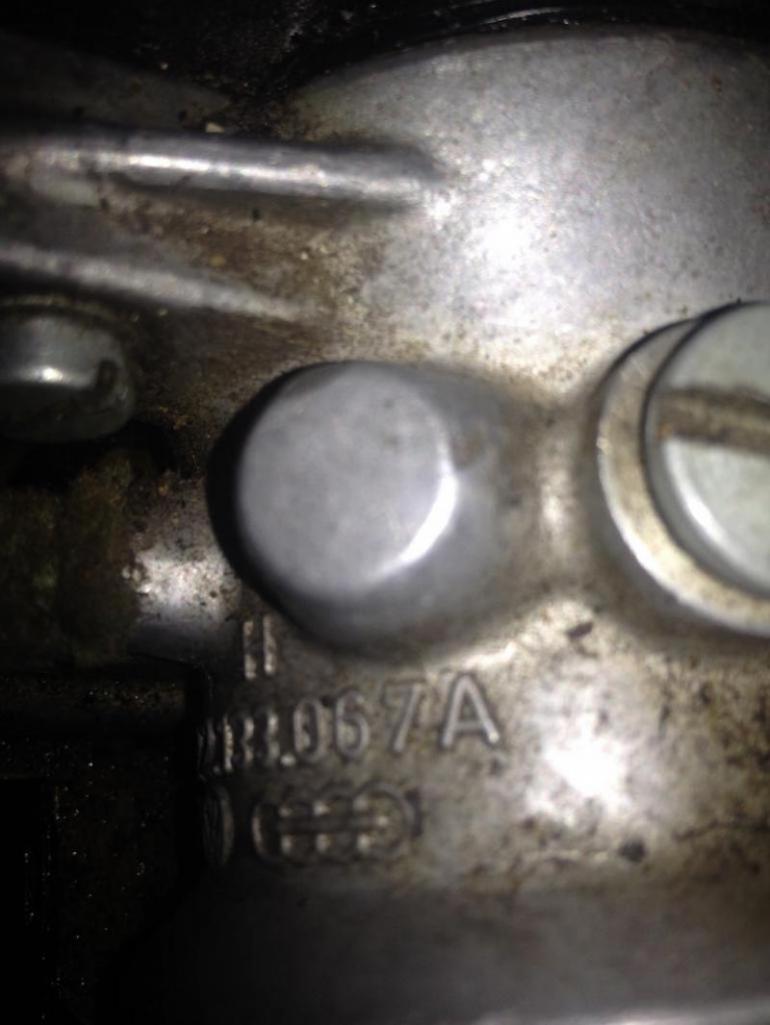 2. Distributor and vac hose set up 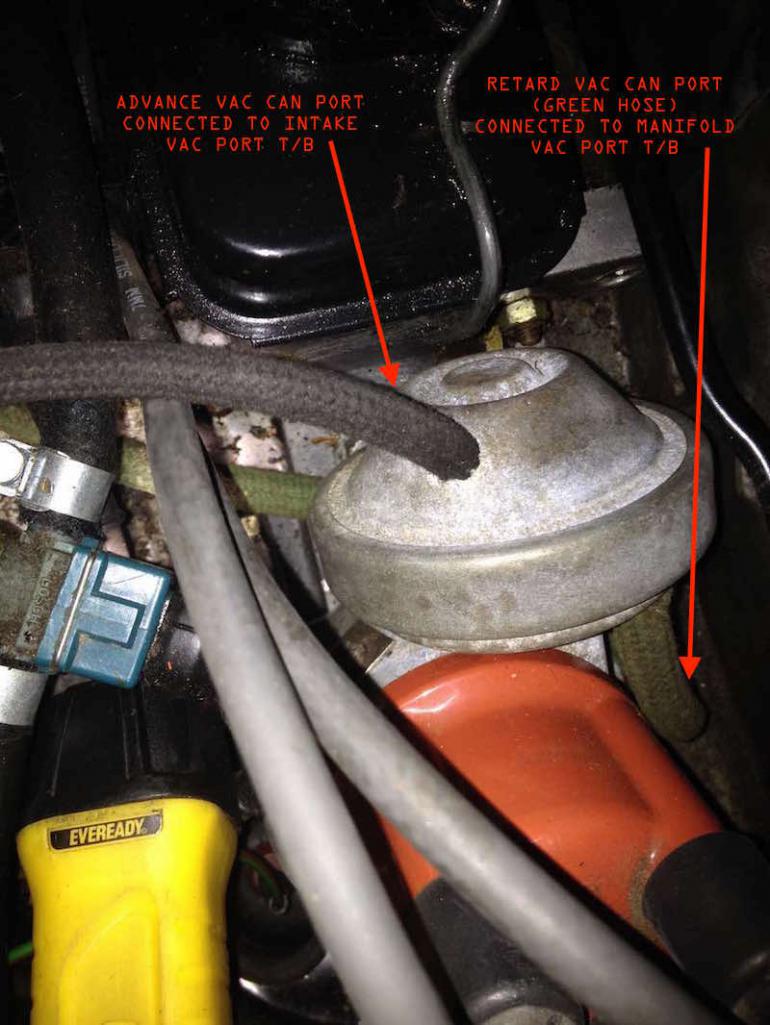 |
| wonkipop |
 Dec 25 2021, 09:06 PM Dec 25 2021, 09:06 PM
Post
#10
|
|
Advanced Member     Group: Members Posts: 4,670 Joined: 6-May 20 From: north antarctica Member No.: 24,231 Region Association: NineFourteenerVille 
|
EXCEPTIONAL DATA 1
MYSTERY CAR mr. b has documented this emission sticker. EC-B USEPA conforming. not california conforming. no car was turned up with this sticker in survey/car sales documentation. still to be determined. 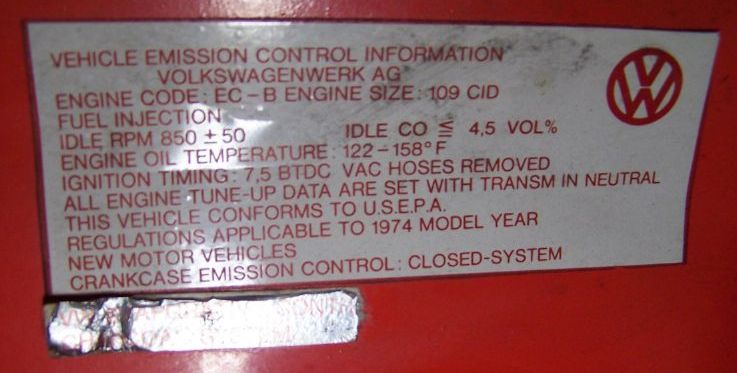 image courtesy of Jeff Bowlsby. EDIT - MAY 2024 mystery solved. see pg 12 of this thread. the USEPA only emissions sticker appears for the last month of 1974 1.8 L jet production in June 1974. An example was found that linked Vin and K number to the sticker on the car. examples of emission stickers for EC-B engined cars indicate the more usual pattern of being stated USEPA and California compliant for all months of production up until June 1974. |
| wonkipop |
 Dec 25 2021, 09:43 PM Dec 25 2021, 09:43 PM
Post
#11
|
|
Advanced Member     Group: Members Posts: 4,670 Joined: 6-May 20 From: north antarctica Member No.: 24,231 Region Association: NineFourteenerVille 
|
|
| wonkipop |
 Dec 25 2021, 10:12 PM Dec 25 2021, 10:12 PM
Post
#12
|
|
Advanced Member     Group: Members Posts: 4,670 Joined: 6-May 20 From: north antarctica Member No.: 24,231 Region Association: NineFourteenerVille 
|
EXCEPTIONAL DATA 3
EC-A engined car (california/CARB conforming) sold new in Cincinatti OHIO (49 states). 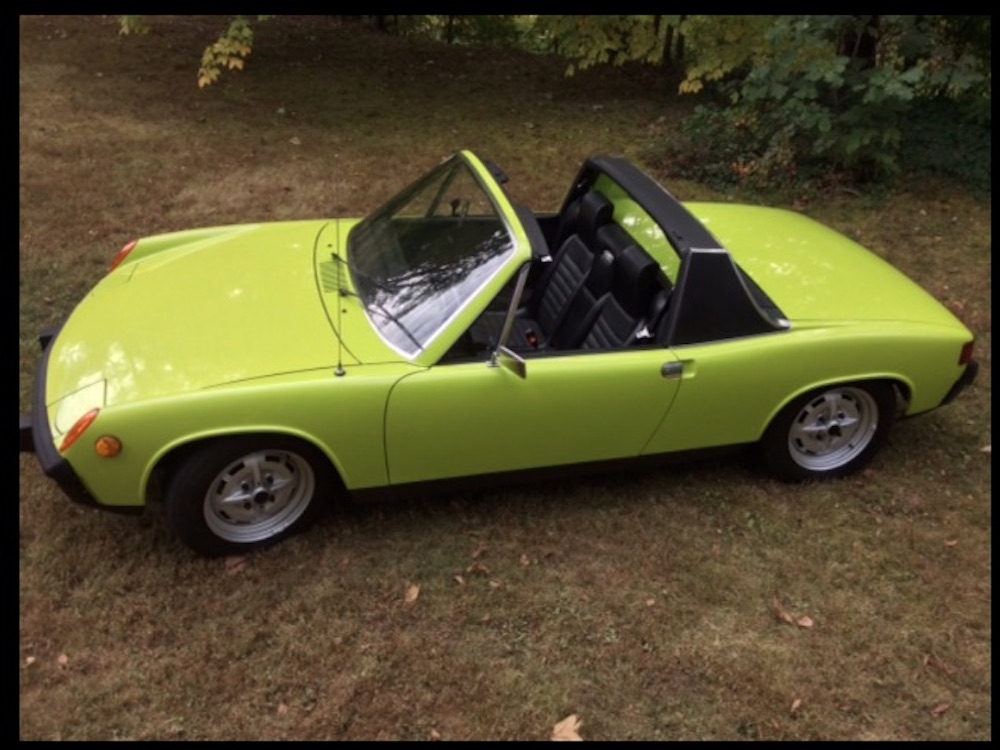 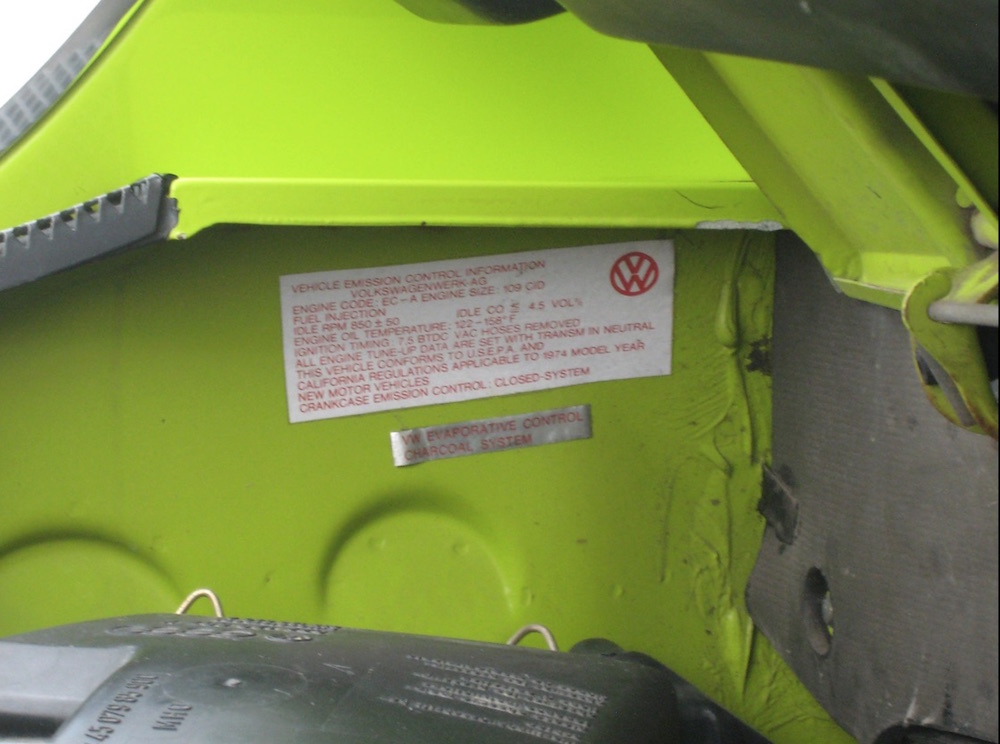 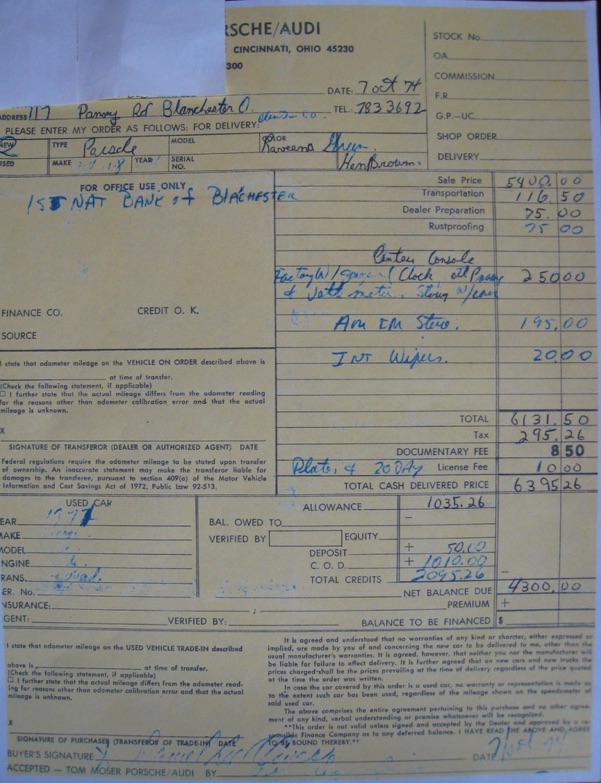 this car VIN 6/74 was not sold until early october 1974. well into the 75 MY. 75 MY 1.8s were available on sale from commencement of 75 MY in Aug/Sept. one explanation is the car may have been specifically sought by the customer for 1 of 2 or both reasons. a) cheaper deal on superseded model. b) strong preference for earlier car without later collision bumpers. a car may have been sourced from remaining 74 stock. that stock may have been found in california. nothing stopped a CARB conforming car from being sold in the 49 states. only 49 state cars were prohibited for new sales in california. |
| wonkipop |
 Dec 25 2021, 10:32 PM Dec 25 2021, 10:32 PM
Post
#13
|
|
Advanced Member     Group: Members Posts: 4,670 Joined: 6-May 20 From: north antarctica Member No.: 24,231 Region Association: NineFourteenerVille 
|
A HYPOTHETICAL.
PAINT STAMP ENGINE NUMBER. this is a guess at this stage. the statistical sample of data confirmed is too small for any degree of certainty. we only have examples of 1 or 2 cars in each case. # 604 was found on two cars. both EC-B. neither car was fitted with a gauge pack/console from new or ordered with the gauge pack/console. (the pack was more normally an option for 2.0 L cars and part of their appearance group option package). the history of one of these cars is well documented and it remains with the second owner. # 605 was found on one car. EC-B the car was fitted with the gauge /console from new. the history of the car is known from new. it remains with the original owner. #606 was found on one car. EC-A this car was not fitted with gauge/console when sold new. the car history is known from new and remains with the original purchaser family. #607 was found on two cars. EC-A only one car had sufficient documentation to determine that it was special ordered from the factory with an "app group" option (gauge/console). the car was tourist delivered to the original owner at the karmann factory in germany. there is one distinguishing feature of 1.8 engines when fully assembled that sets them apart from 2.0 L engines. 1.8 engines came with a standard type second sump lid without provision for a temp guage sensor and electrical connection unless it was ordered. 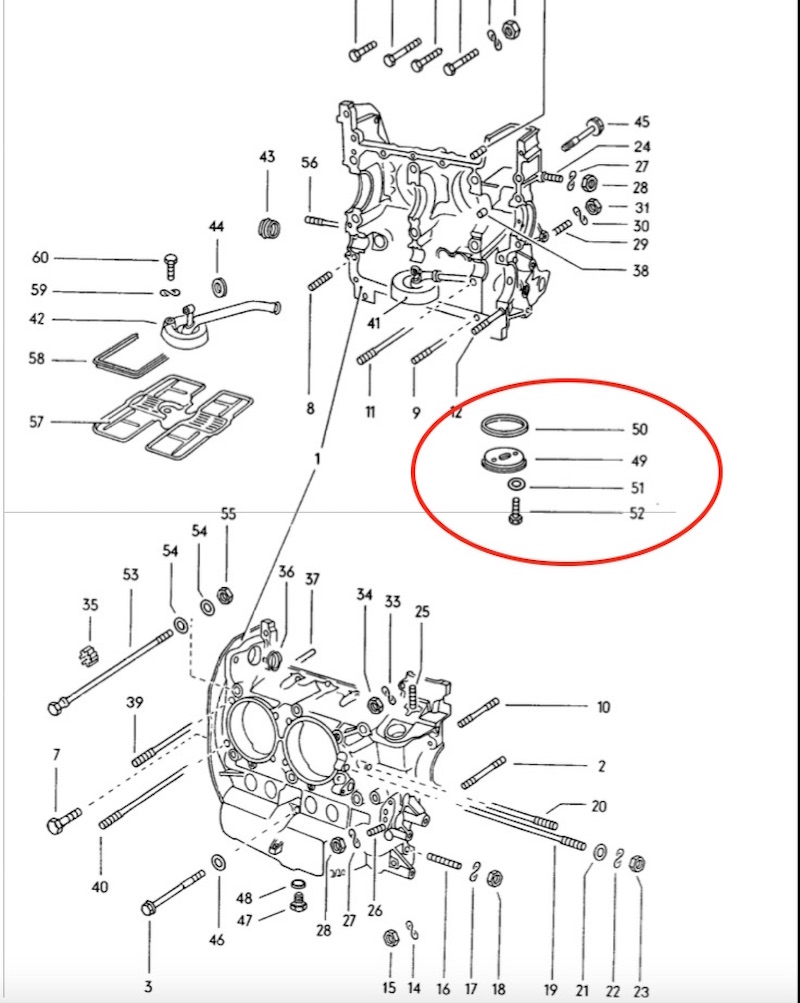  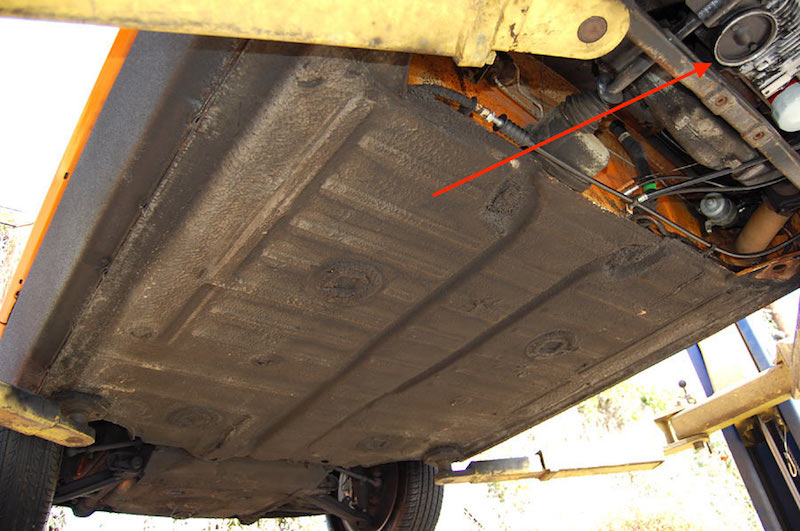 all 2.0 engines came with the different second sump lid with the inbuilt sensor and electrical connection. 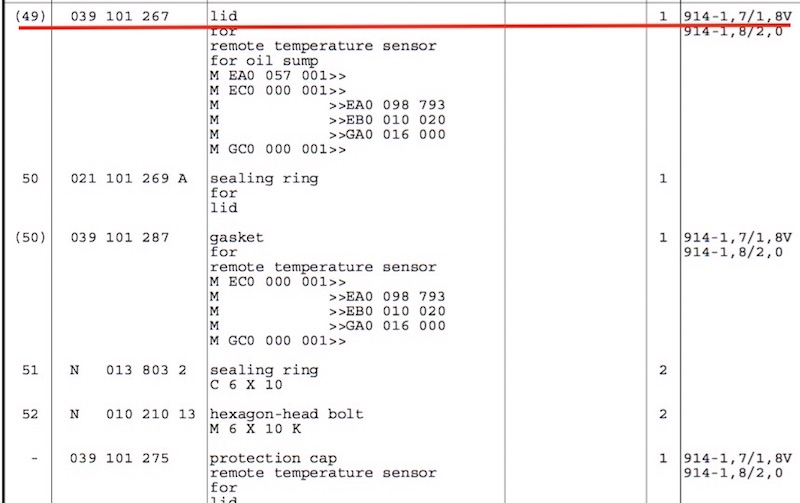 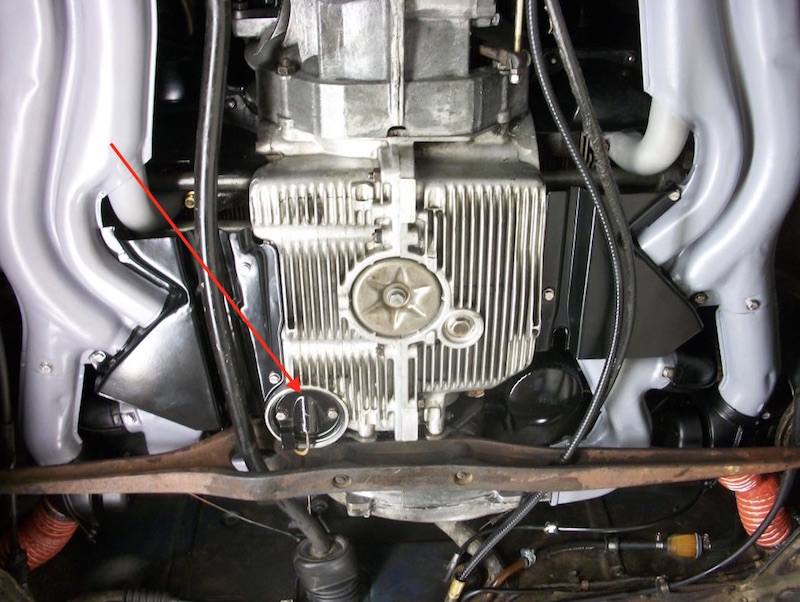 it was a relatively simple matter to incorporate the gauge and console for the 2.0 either on the production line or at the dealer to suit customer preference. it was more complex to incorporate gauges for the 1.8 as removal of the sump plate and opening of the sealed engine component with loss of oil was involved. esp so on the production line. (less so at the dealer). if 1.8s were ordered with the exceptional and unusual option of guage and console this would have to have been allowed for on the production line. this may have necessitated engine code stamps to ensure correct engine installation. example of 74 1.8, no gauges/console. second sump lid plate is simple type. 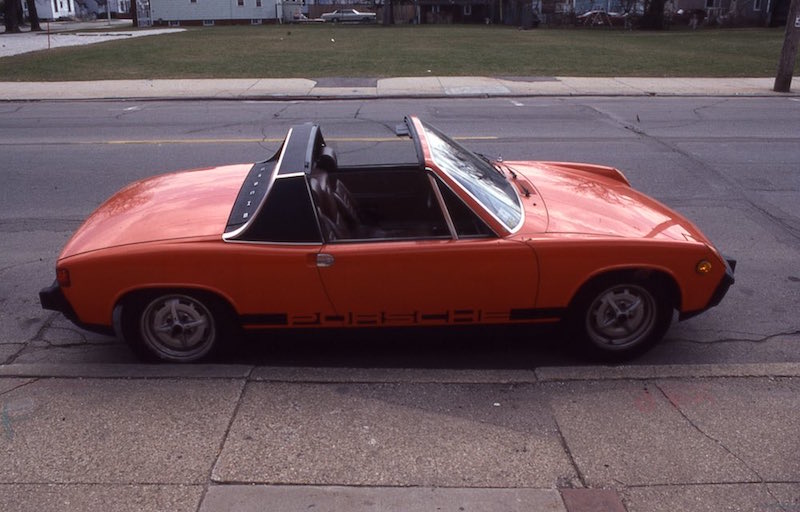 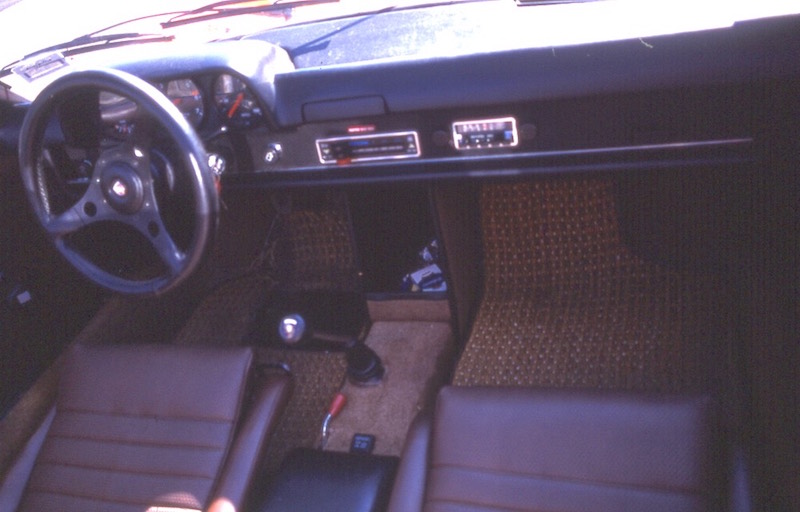 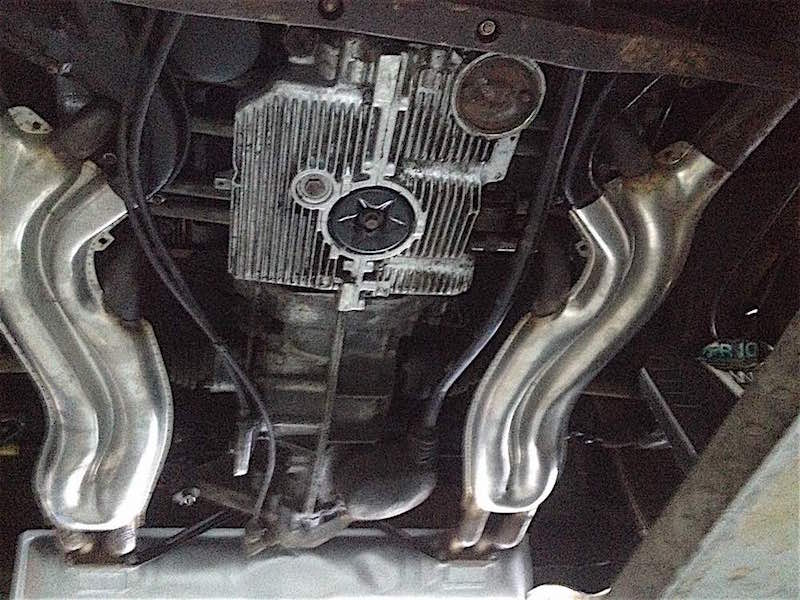 example of 74 2.0, without appearance group option of guages/console. second sump lid plate is temp sensor type even though gauges not fitted. 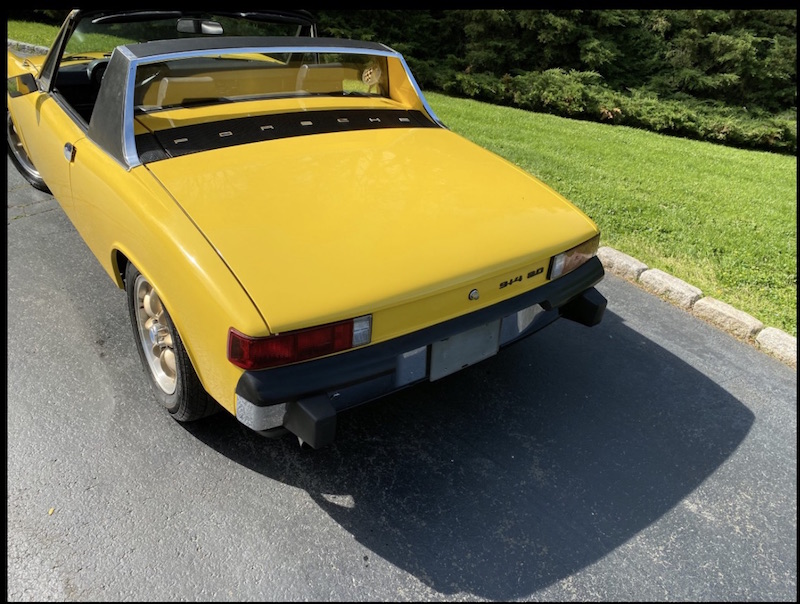 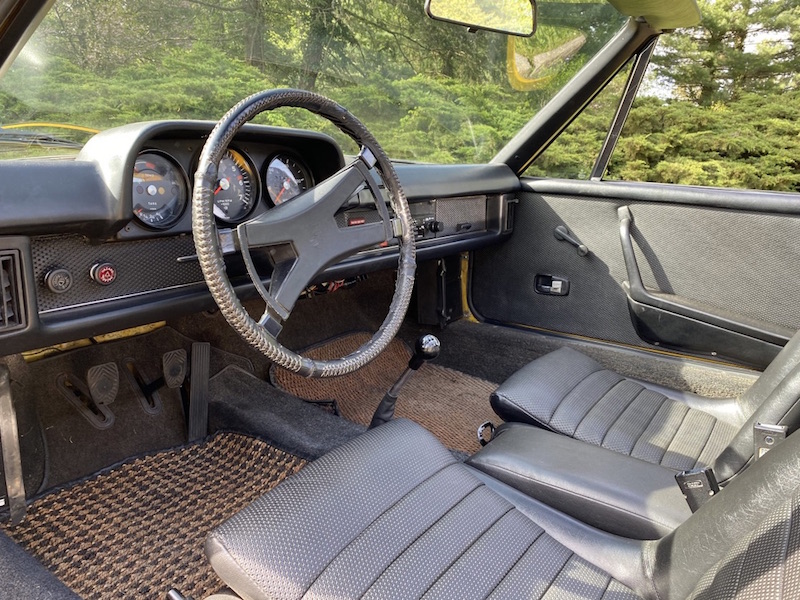 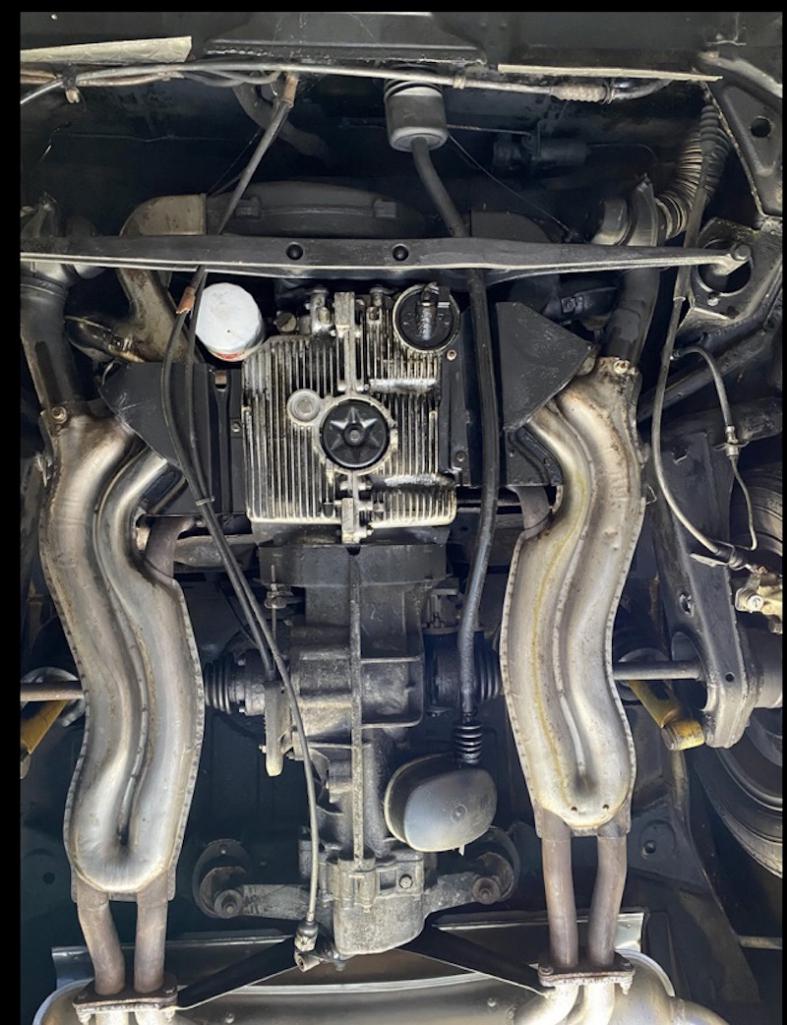 this pattern appears to continue for the 1975 MY example of 75 1.8, no gauges/console. second sump lid plate is simple type. 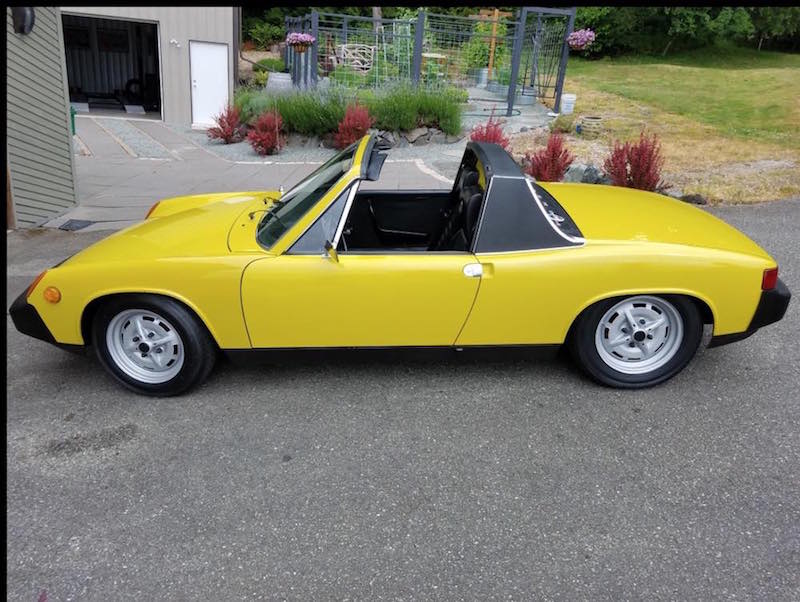 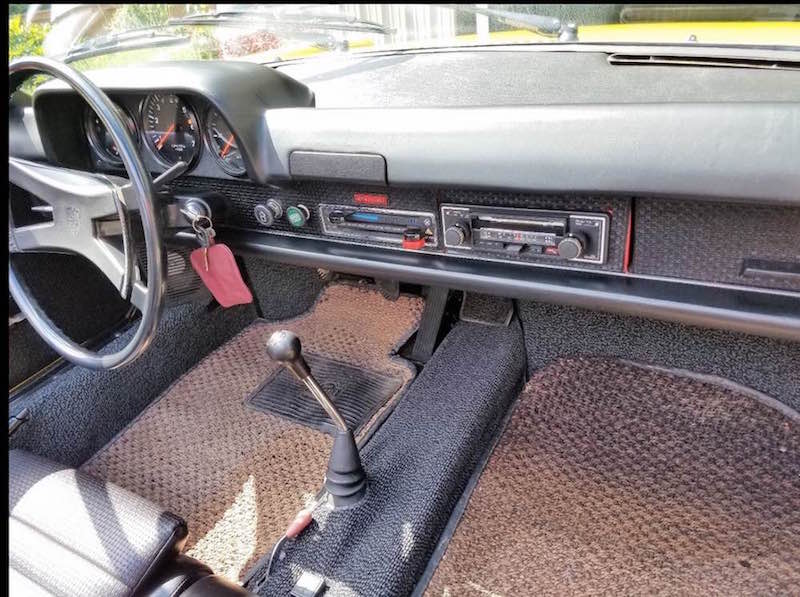 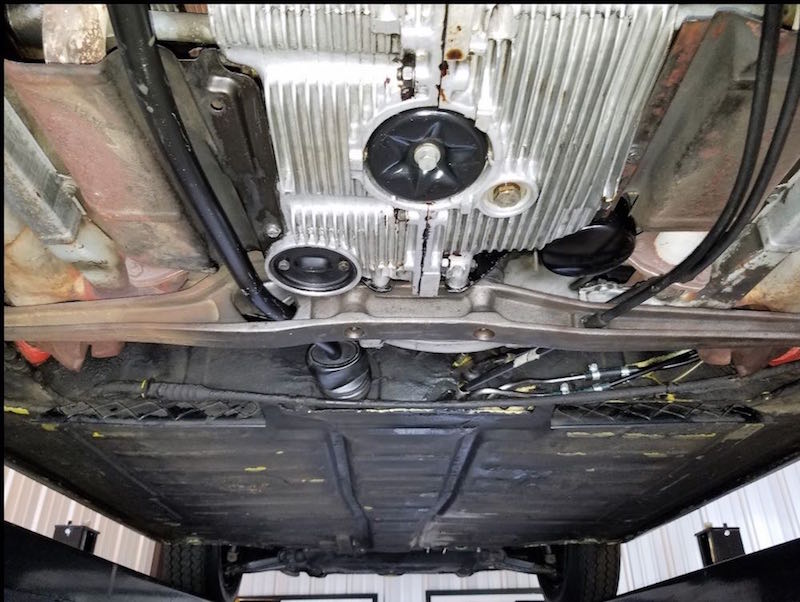 example of 75 2.0, without appearance group option of gauges/console. second sump lid plate is temp sensor type even though gauges not fitted. 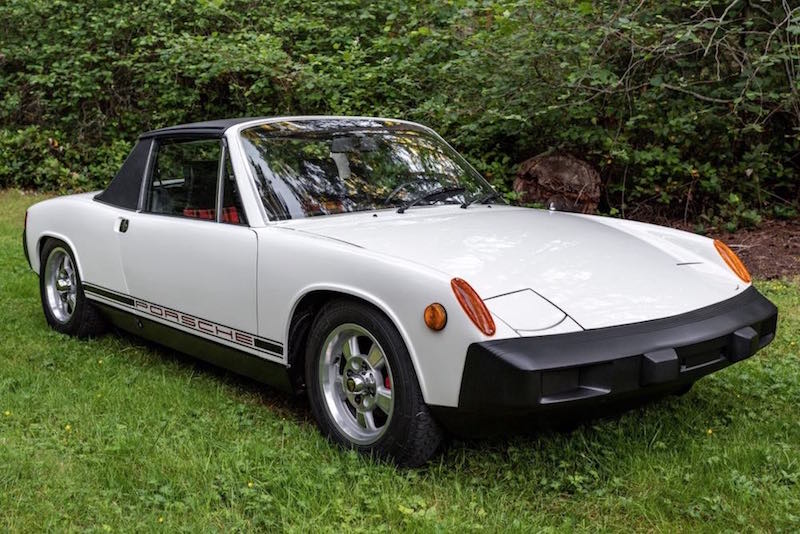 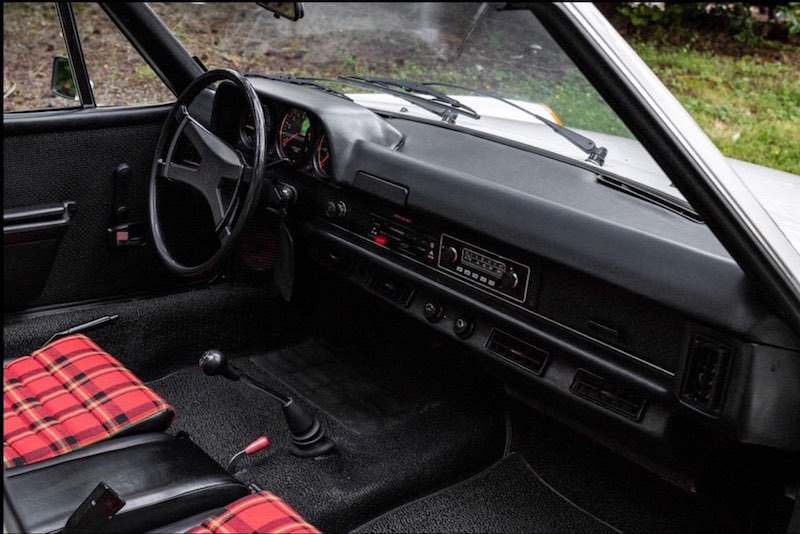 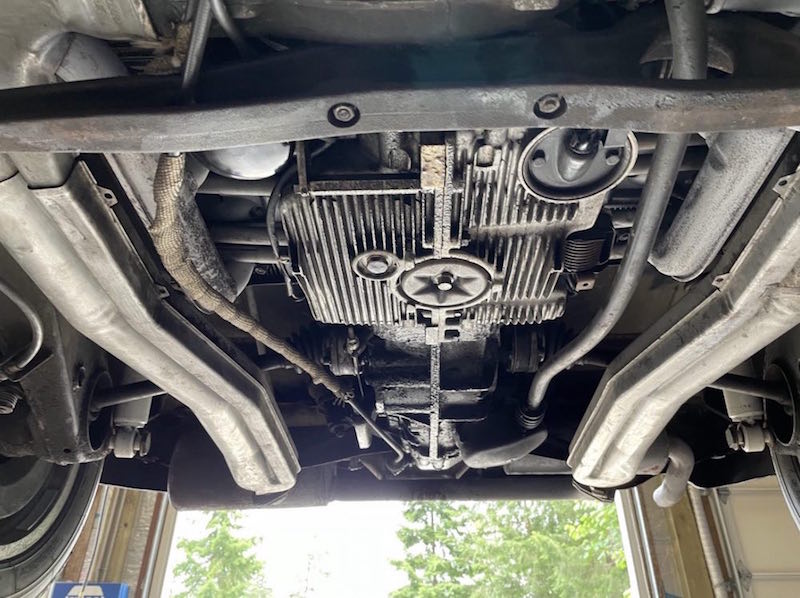 the above examples are vgc and appear to be original cars. there are two possible ways to test the hypothesis of paint stamp engine numbers further. 1. collect more data on 74 1.8 engines to get a greater statistical sample. 2, expand data collection to 75 1.8 L cars. if the hypothesis is correct there will be 4 stamped numbers for 75 1.8 cars. a number for 49 state cars (no gauges). a number for 49 state cars (gauges) a number for calif cars (no gauges) a number for calif cars (gauges) -------- further, if members with 73 cars were interested. the guage/console option was on offer in 73. a possibility is - for EA engines. a number for no guage cars. a number for cars fitted with guages (from new from factory). for EB engines a number for no guage cars. a number for cars fitted with guages (from new from factory). = 4 numbers in total. --------- for 2.0 L cars for 75/76 model years. it looks to me like the only difference in the cars is whether 49 states or californian. if the hypothesis is correct (and the only difference between 75/76 2.0 L engines is pollution equipment/specification) there will be two numbers for engine paint stamps for each of the the years. one for 49 states. one for california. 73/74 2.0 L cars will have one number for 49 states and california, no difference in emissions spec for those two years? ----------- the exceptions to the above will be engines stamped with EA370 or possibly some other identifying stamp. those stamps appear to identify those engines with the early stage of an engine program connected with cars 73 and beyond. ie the discontinuation of the porsche 6 cylinder engine and the revamping of the engine range towards the 2.0 L and 1.8 L cars. EA370 is the project development # covering that program? ------------ EDIT MAY 2022 further information that has come to light. for a standard 74 1.8 to be fitted with a console and temp gauge option, in addition to the temp sensor sump lid plate the fully assembled engine would require 3 metal brackets with a crimped end to locate and support the temp sensor wiring clear of the crankcase and oil cooler. these are shown listed 1, 2 & 3 in images below. 1 was incorporated into the original factory sump lid temp sensor housing. 2 was fixed using one of the oil filter housing bolts. 3 was fixed using one of the oil cooler support bracket bolts. all were not easy to access/fit with the cast fan housing on the assembled engine. only 914/2.0L engines came with the sump lid plate, temp sensor wire supports and temp sensor wire in place on the assembled engine. all 914/2.0 L cars were fitted with a temp gauge, either a standard temp gauge in the left hand combo gauge in the instrument binnacle or optioned with the centre console and gauge pack. all 2.0 L engines came with the necessary lid, temp sensor wire and support brackets already fitted. standard 914/1.8s were not fitted with a temp gauge as standard, but were fitted with a standard wiring loom with provision for a temp gauge. they lacked the temp sensor sump lid, temp sensor wire and support brackets on the assembled engine to make fitting the console a simple plug and play into the wiring loom in the upper engine bay. 914/1.8s could be special ordered with the centre console and gauge pack. this would have required that the engine was assembled at the VW engine plant with the temp lid, temp sensor wire and brackets in place. it seems highly likely that the pattern found in existing original cars of: 604 = EC-B engine/car without gauge console. 605 = EC-B engine/car with gauge console. 606 = EC-A engine/car without gauge console. 607 = EC-A engine/car with gauge console. is the reason for the two different paint stamp engine tin numbers for each of the EC-A or EC-B variants. 608 has been established as the paint stamp number for the 74 AN european spec 1.8 twin carb engine. the car with the 608 engine was not fitted with gauge console. it is highly likely that a 609 engine existed and this would have been the AN engine fitted to european 1.8s with the gauge console option. 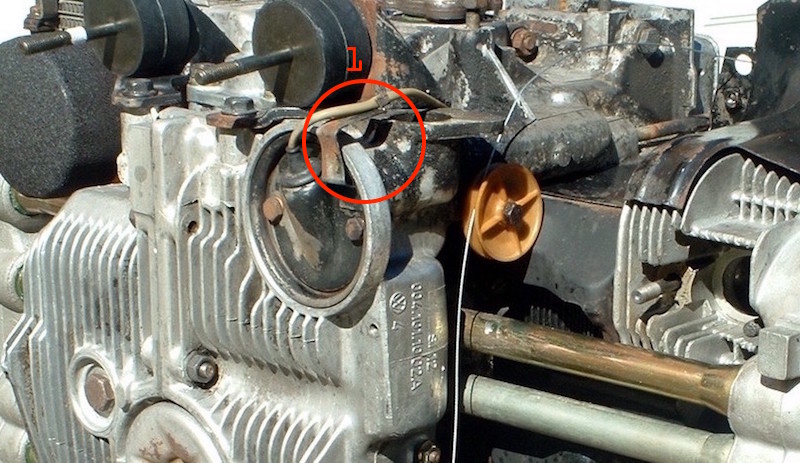 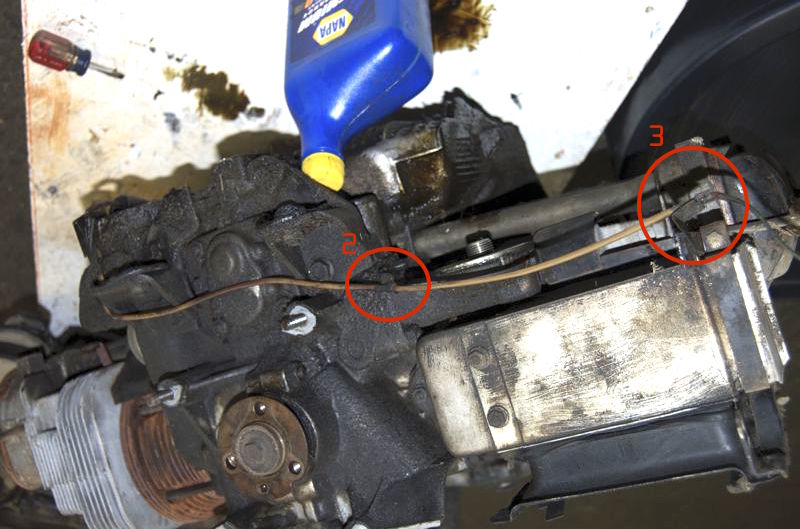 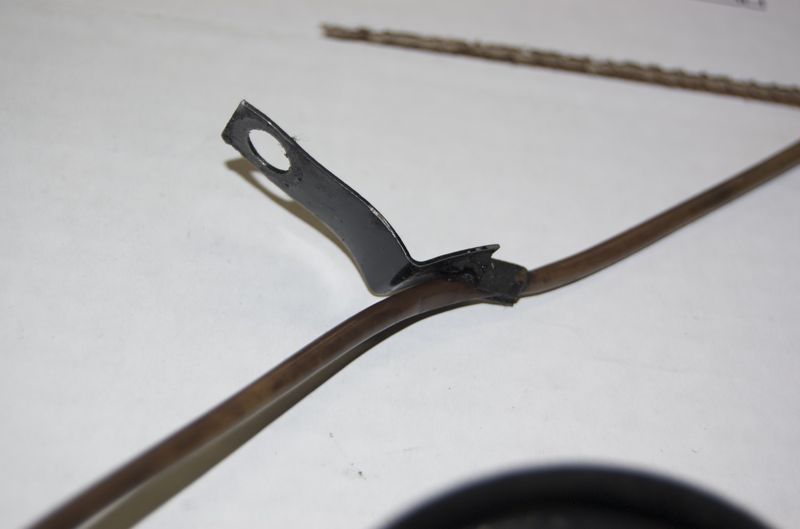 engine tin paint stamp. 1974 1.8 / european spec AN. held in the collection of the porsche museum germany. engine stamp # = 608 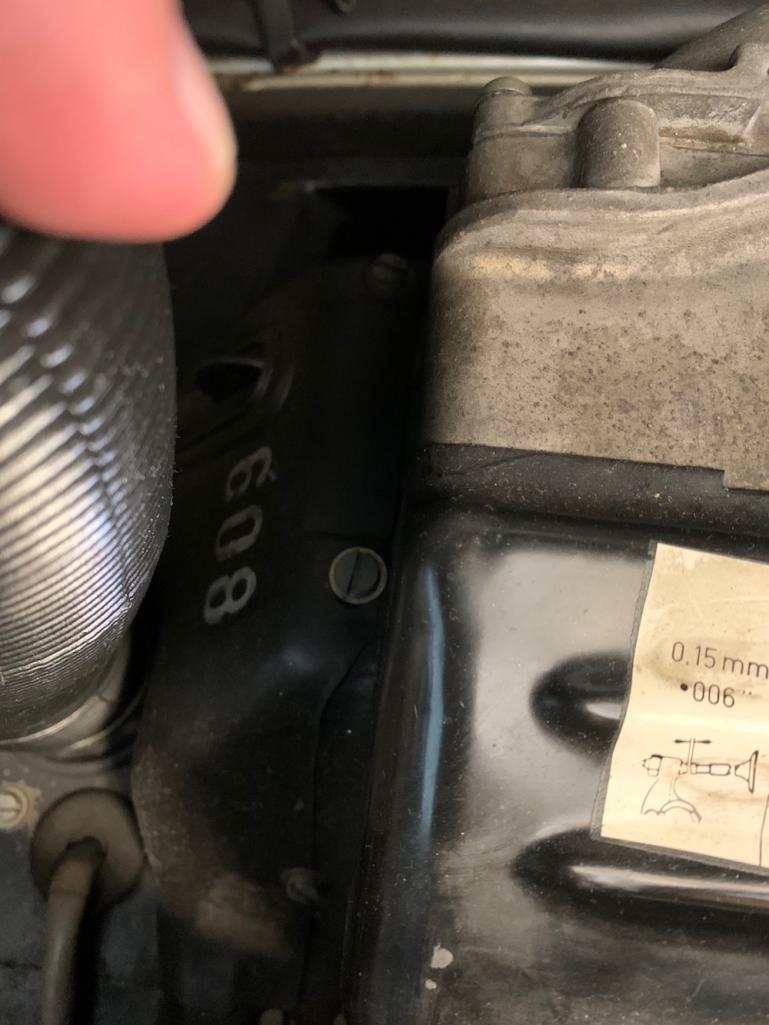 |
| wonkipop |
 Dec 25 2021, 11:21 PM Dec 25 2021, 11:21 PM
Post
#14
|
|
Advanced Member     Group: Members Posts: 4,670 Joined: 6-May 20 From: north antarctica Member No.: 24,231 Region Association: NineFourteenerVille 
|
POST SCRIPT
A TROUBLED BIRTH FOR L - JET / THE FIRST EPA EMISSION CHEAT DEBACLE / THE FAILURE OF D-JET. ? there was a lot going down in 1973. none of it good news for VW. primary background documents follow. ----------------- 1. looking through factory workshop manual to find differences between EC-A/EC-B - i came across the inception date of L jet. Nov 73. 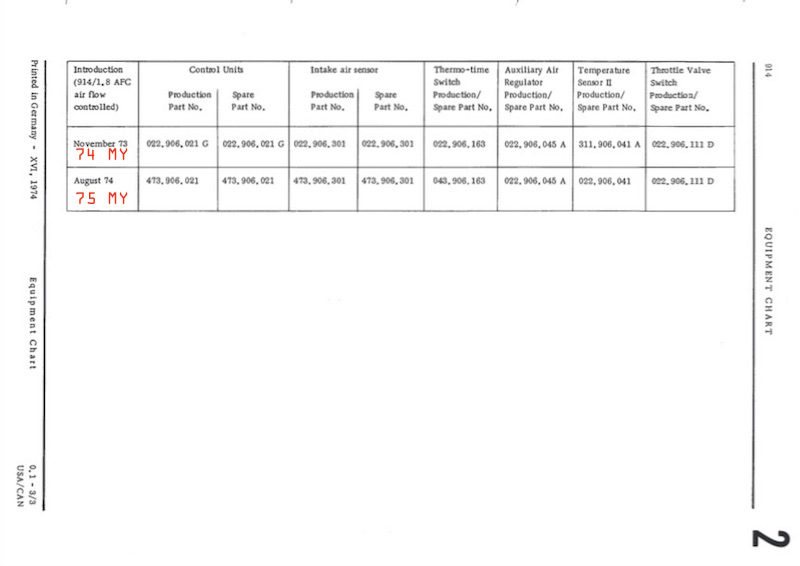 L jet experts in the USA already knew this? i didn't. the introduction of the 914 1.8 did not co-incide with the start of the model year. i read over the VIN# data base on this website. what an asset. whoever decided to start that register - buy them a beer. could not turn up a 74 1.8 before late oct/early nov 73. these are the earliest that appear. 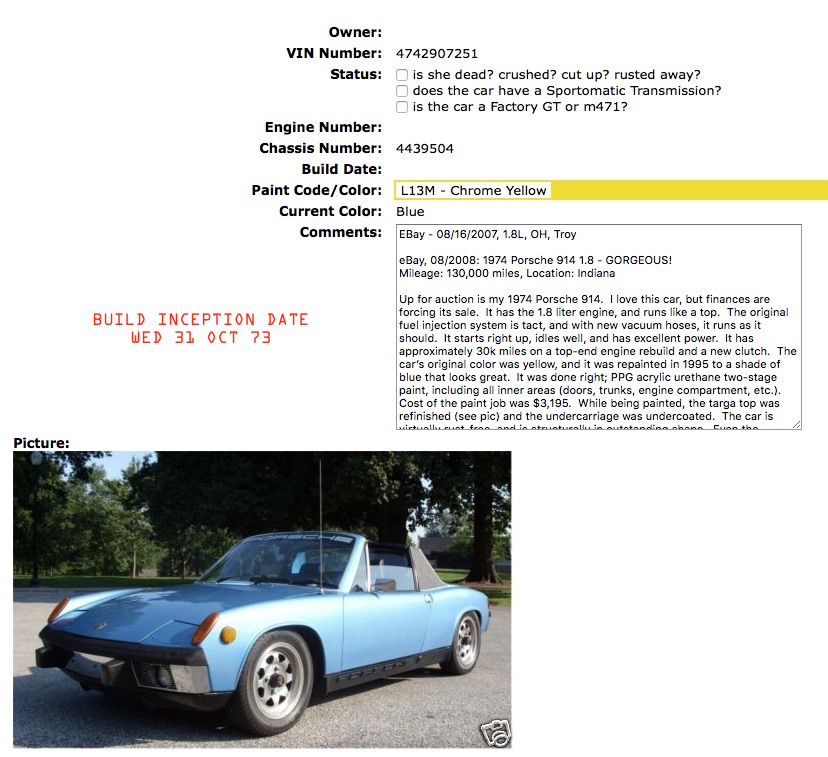 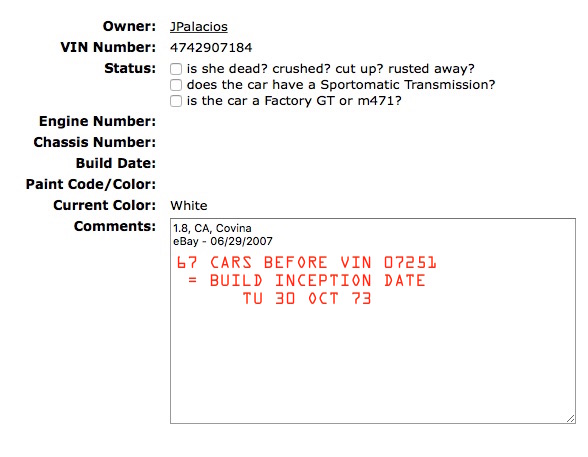 ---------------- 2. The VW emissions cheat of 1973 EPA letter/report to US Justice Department 1973. 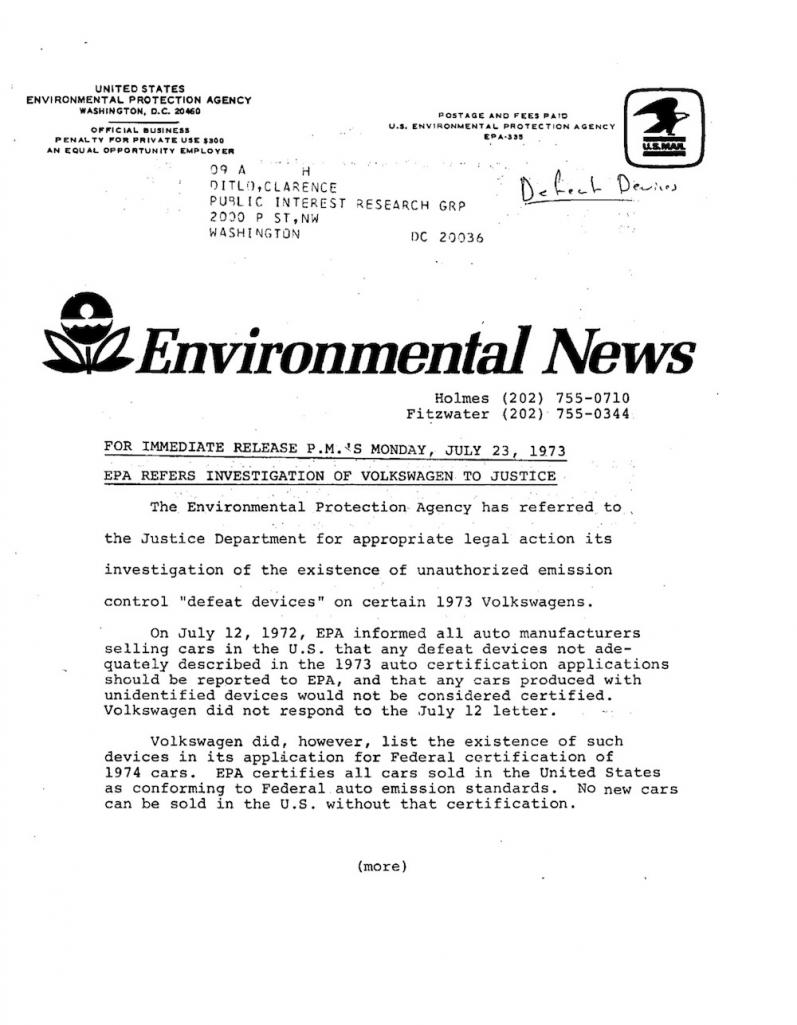 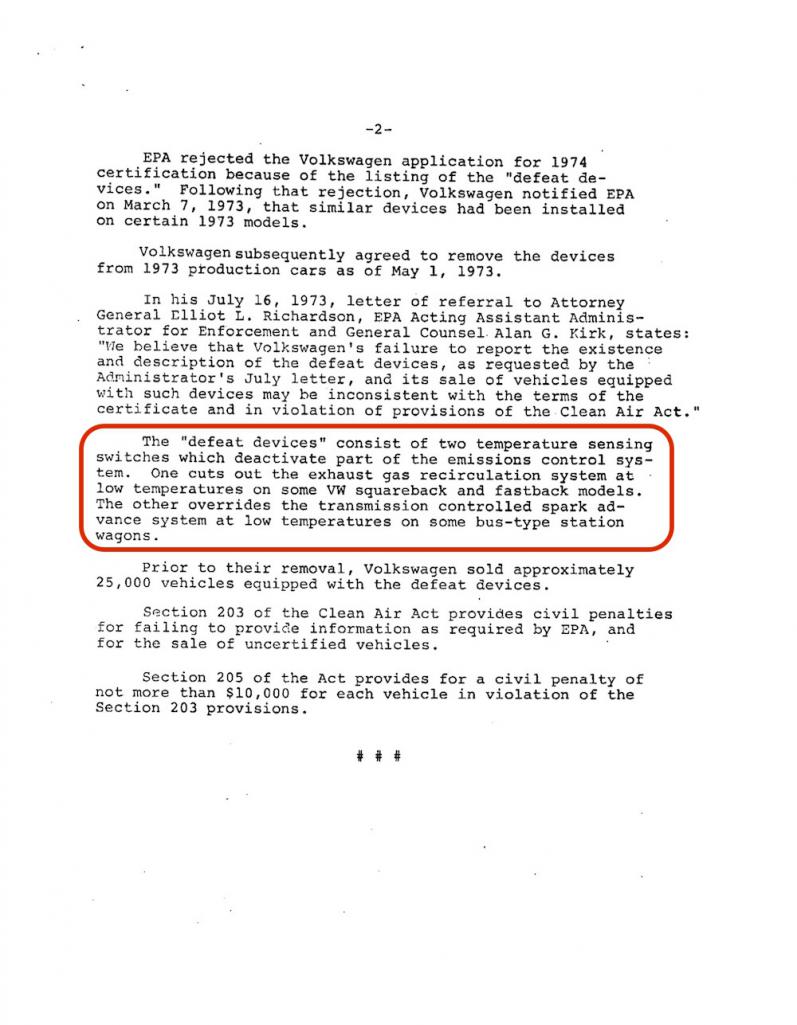 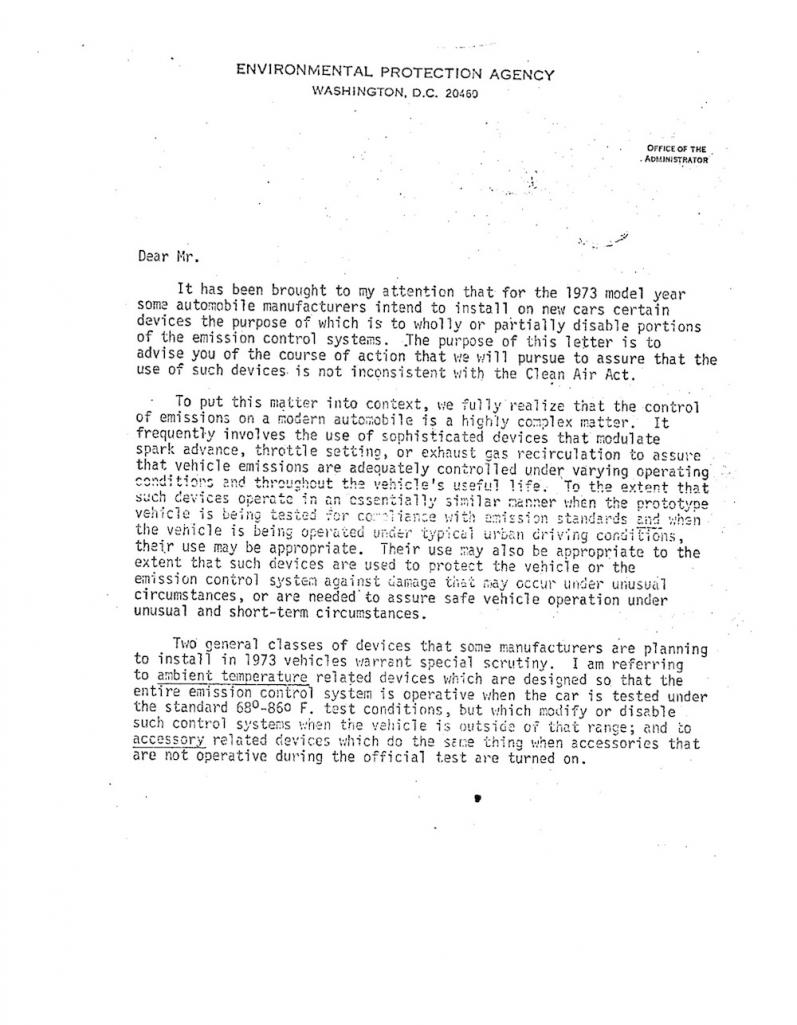 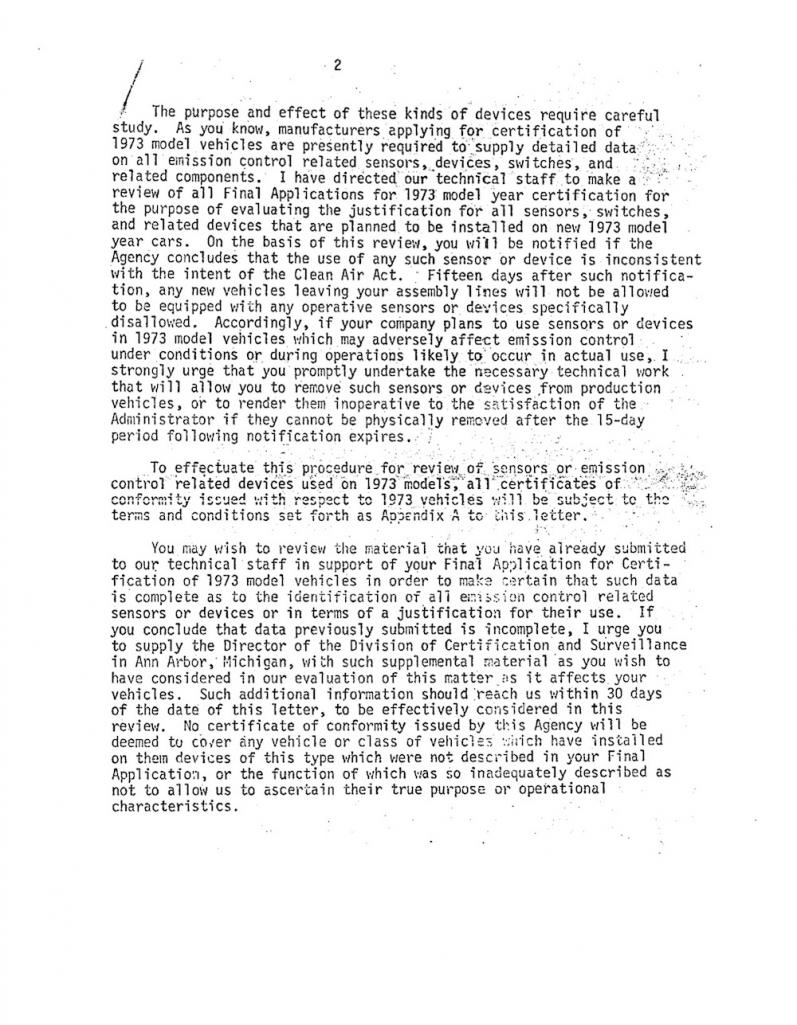 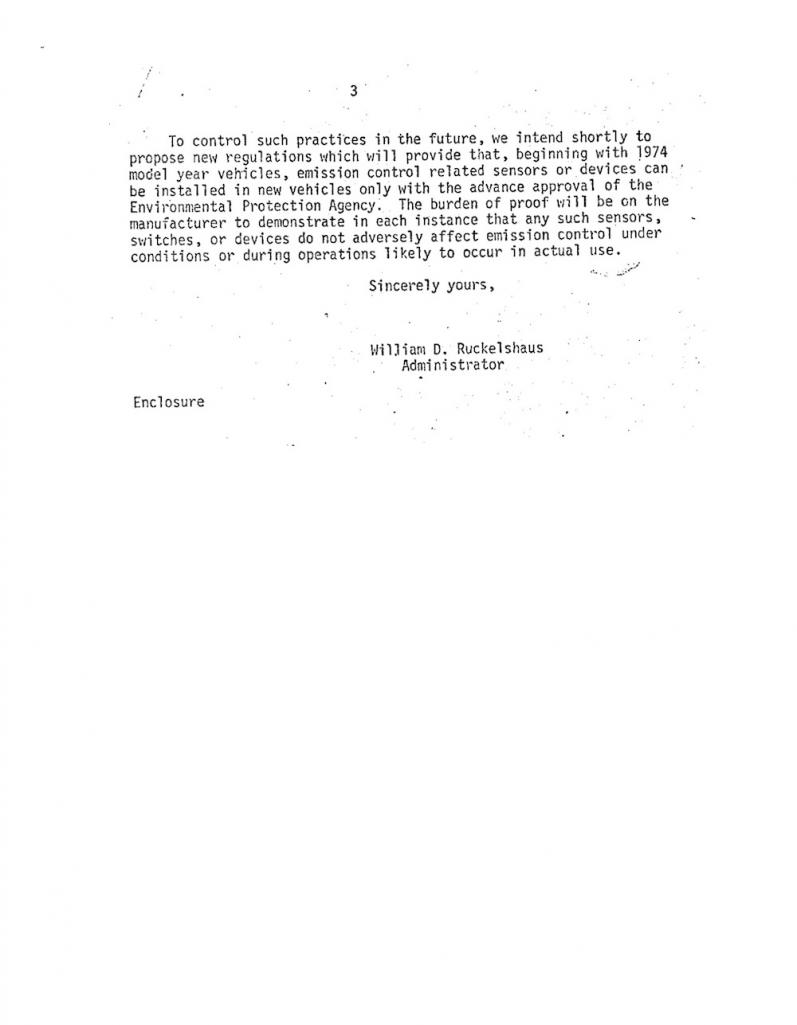 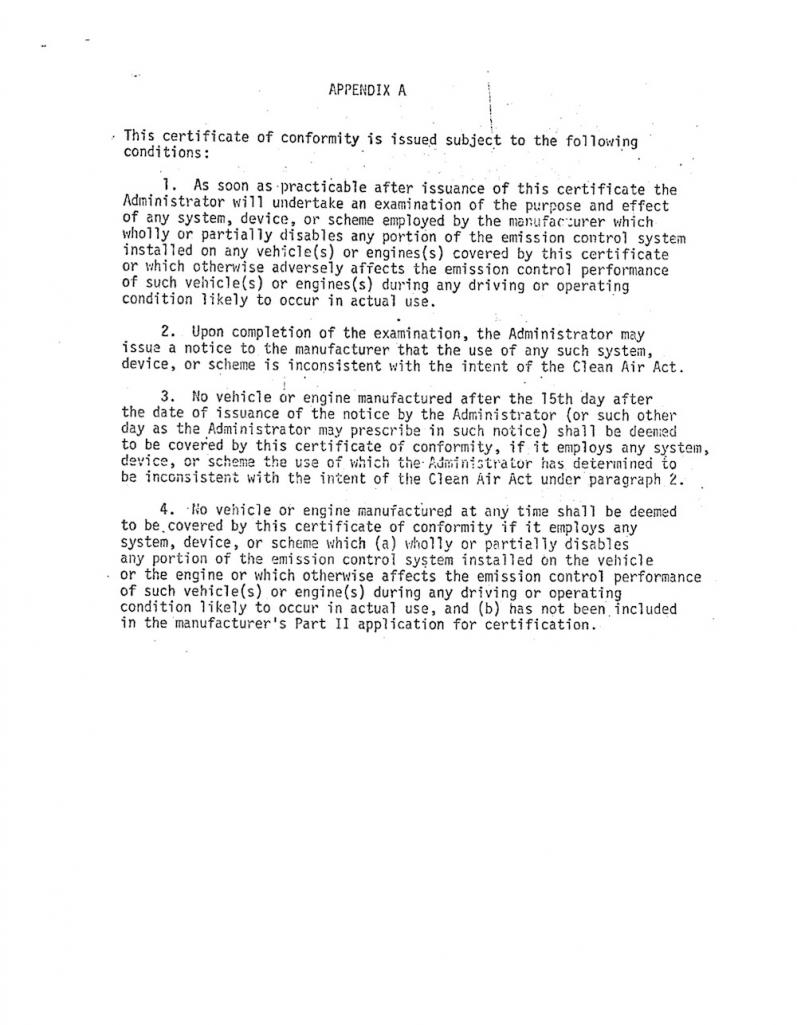 the letter (advisory circular) that was sent to all manufacturer's in 1972 referred to in EPA letter sent to Justice Dept above. 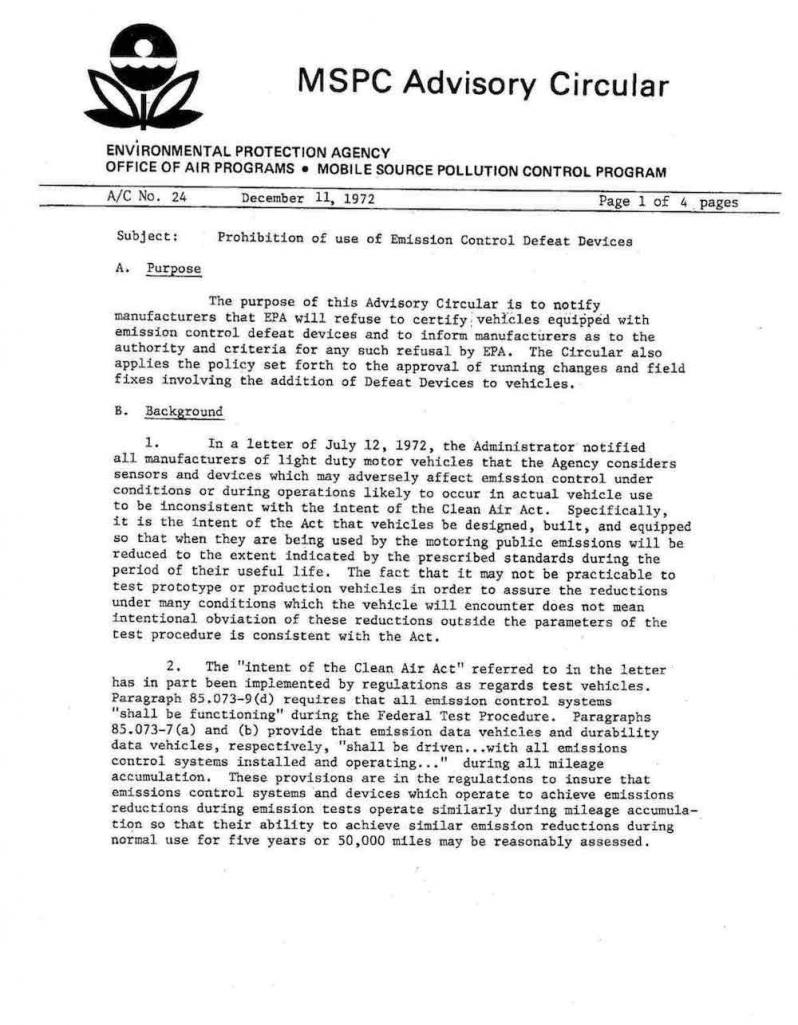 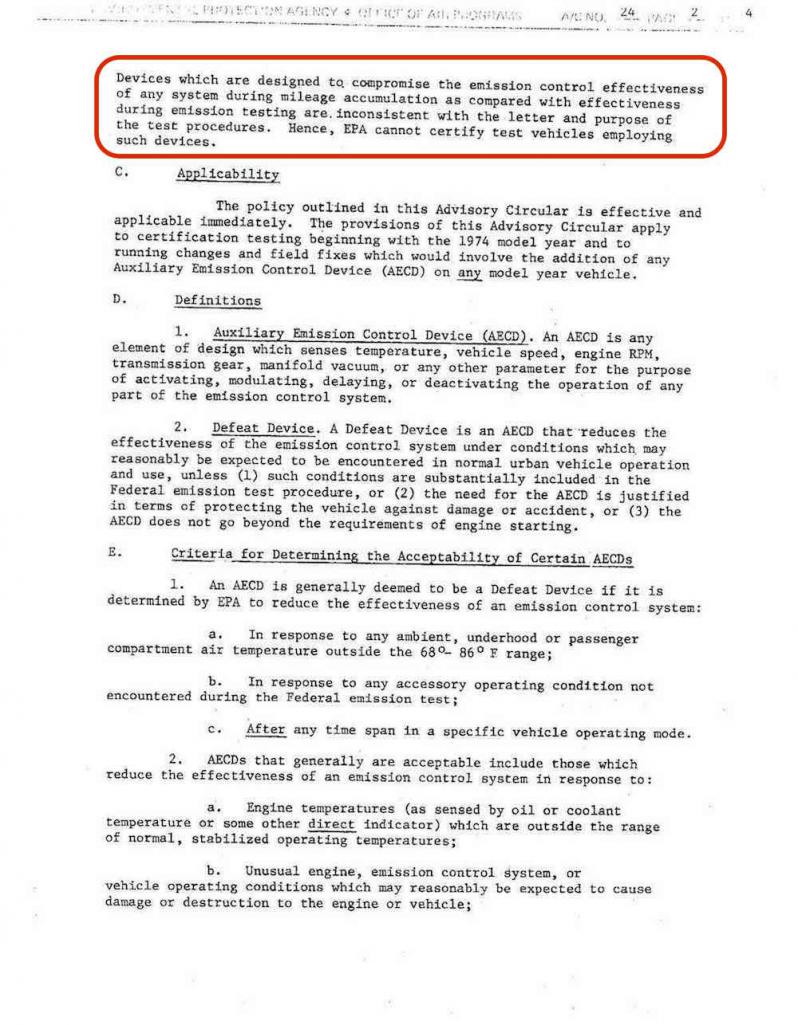 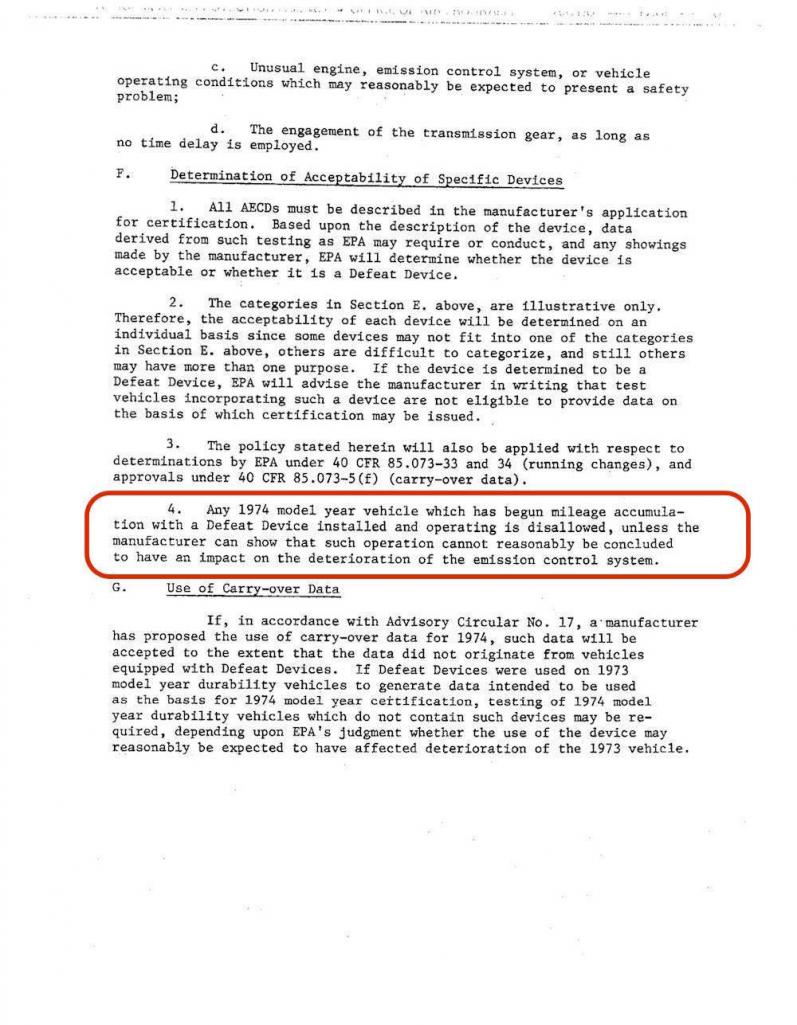 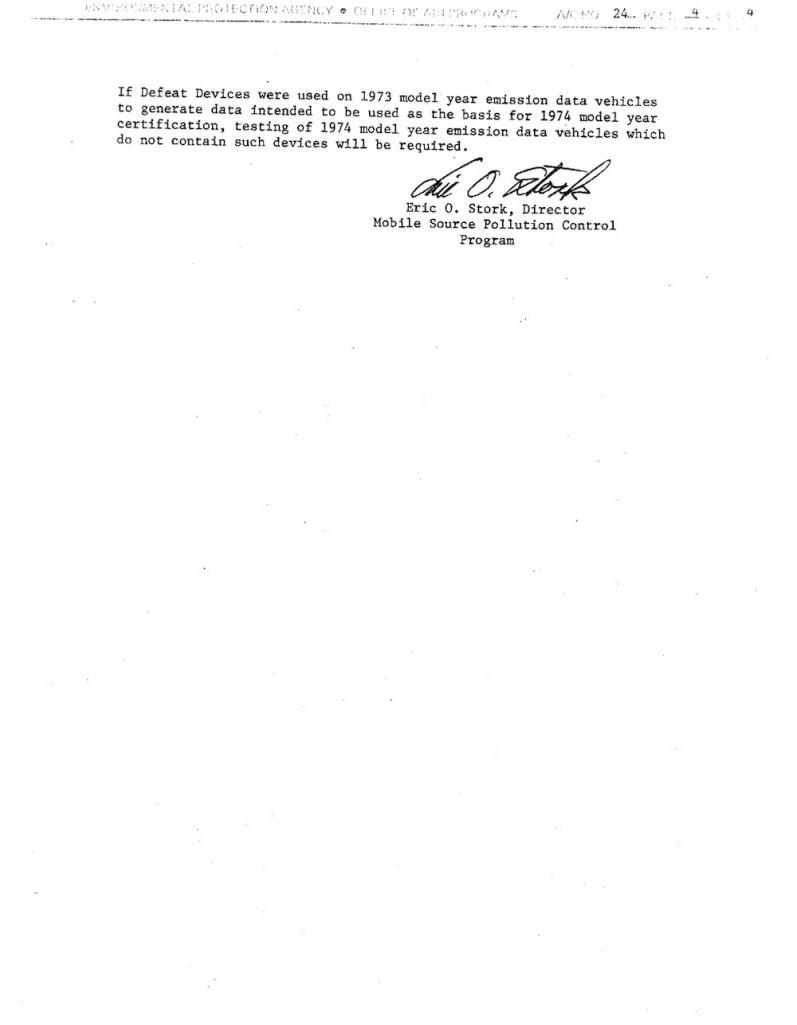 specific devices in question. both cases were only models equipped with full auto transmission. VW type 3 (fastbacks and squarebacks) EGR was turned off by a switch in a VW type 3 when temp was below 68F (according to EPA). VW type 2 (bus) TCS (transmission controlled spark advance) was turned off by a switch below 68F (according to EPA). it is not clear if this applied to only californian models or 49 states models. CARB Executive Orders of 1973 list the type 3 F/A (fully auto) as equipped with EGR and the type 2 F/A as equiped with TCS. extracts from a VW fuel injection manual describing the emissions equipment. 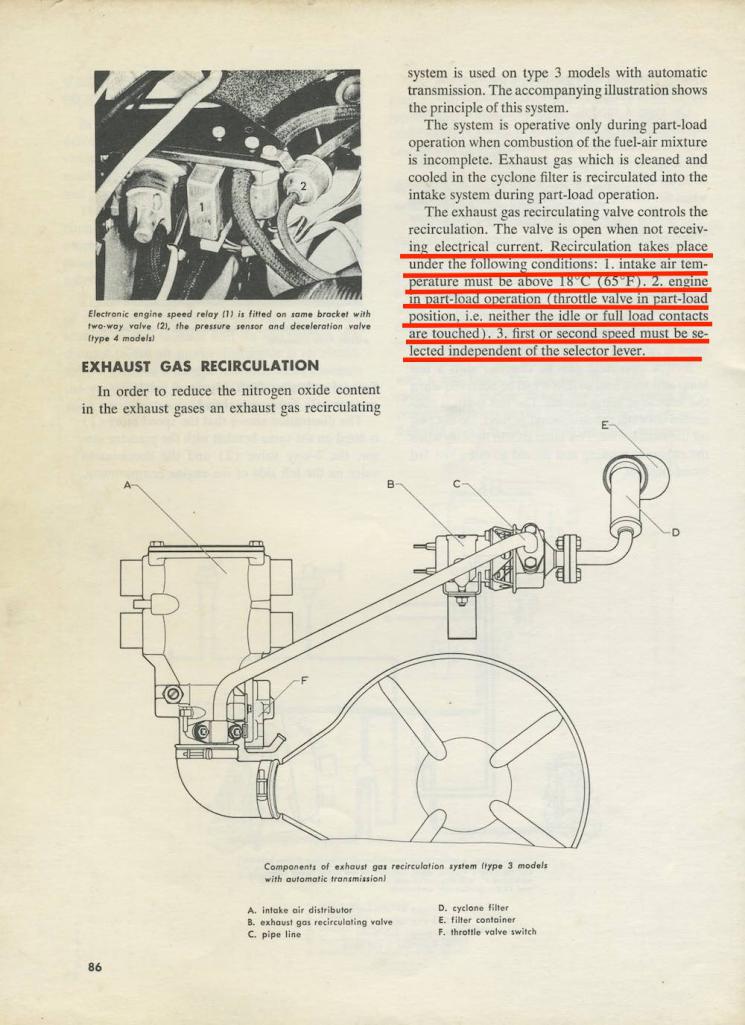 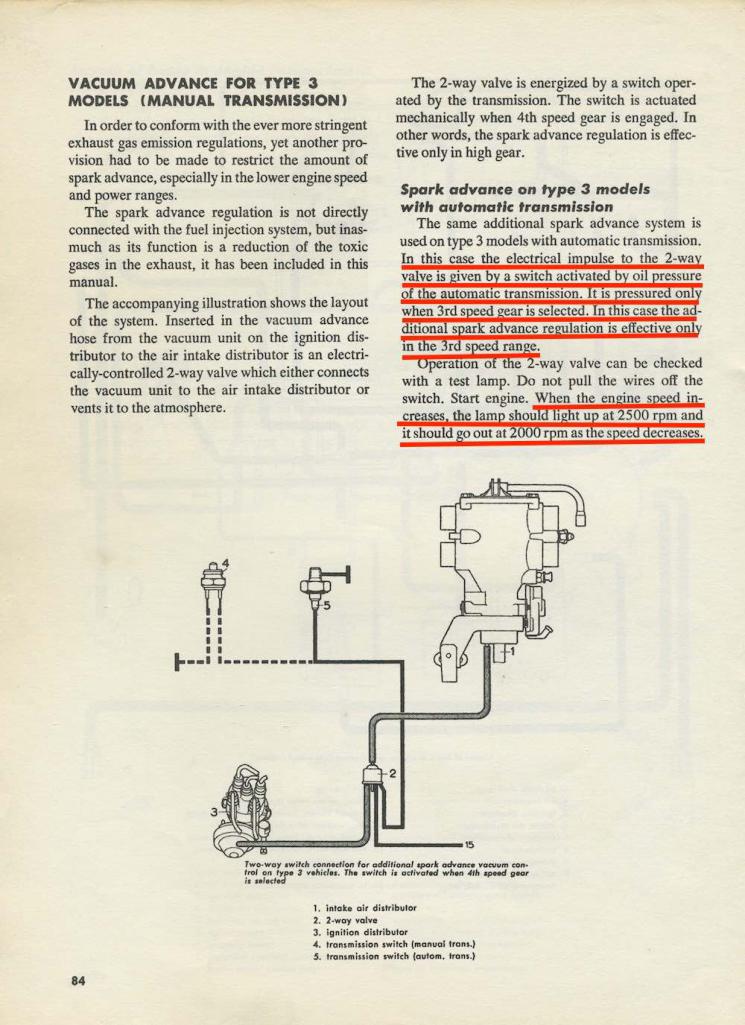 how EGR is controlled and switched off is explicit. EGR is switched on above 65F. car was clean in summer and dirty in winter. how TCS operated is described above in terms of the type 3. the type 3 did not have a temp sensor disconnecting the TCS. the type 2 did. the thermo switch would disconnect the transmission control that retarded spark in all the lower gears unless temp was above 65F. without going into detail ----> basically VW could not make D jet cars work with fully automatic transmissions, pass emissions and be driveable. Aftermath. for 74MY there was only 1 fully automatic VW for sale in california. the 1.8 L-jet engined VW 412. the model arrived in August 73 for start of the MY. VW dropped the F/A version of the bus for 1 year in california. available in 73 and again in 75. its not clear if you could buy a F/A bus in the 49 states. (sales brochures said you could as a special option.) the ED engine (type 4 1.8 L-jet) became available Jan 74 with manual trans. 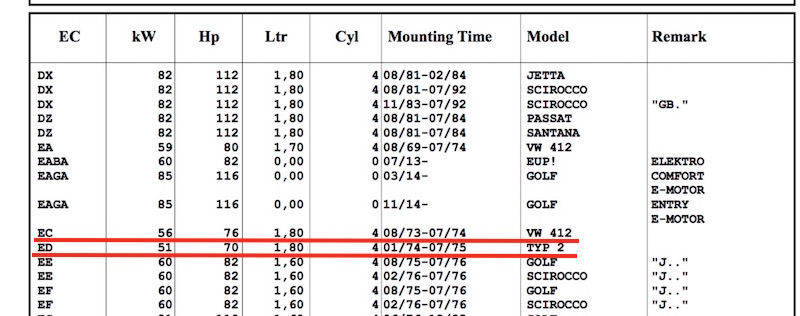 D-jet engines were not used for any VW F/A model. it would also appear no D-jet engines were used for 49 state F/A models. models fitted with semi autos were available. easy to see why. you take your foot off the gas when selecting gears. S/A can be set up similar to a manual in terms of emissions control. not so a slur box? vw needed cars with fully automatic gearboxes for the USA market. ----------- 3. the introduction of L jet engined cars. The VW 412 gets L Jet first - Aug 73. 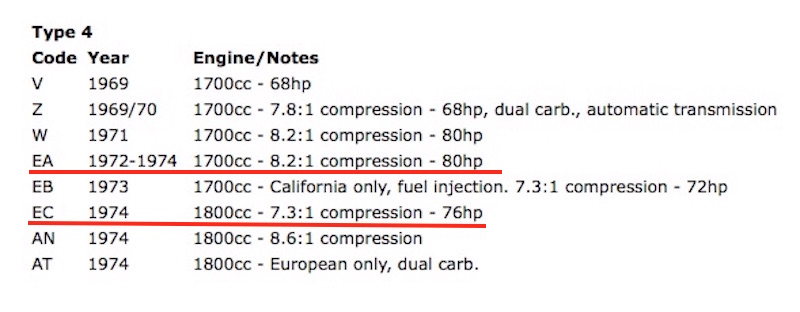 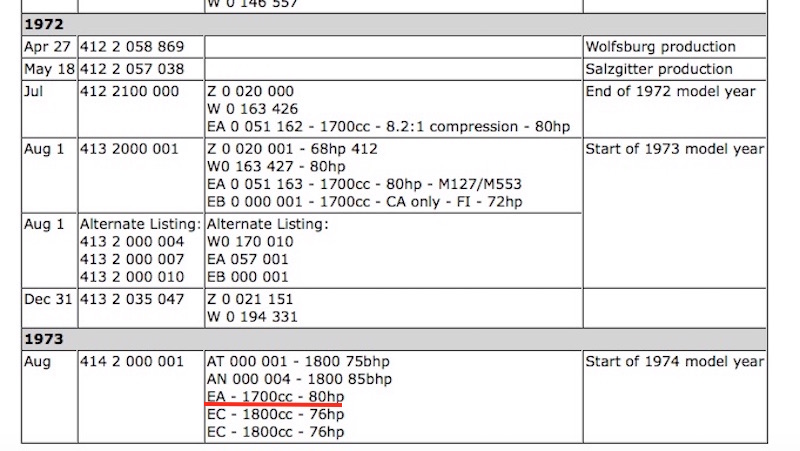 the VW 412 also continued to use the 1.7 EA engine in the 1974 MY (use of the EA was discontinued for the 74 MY 914). 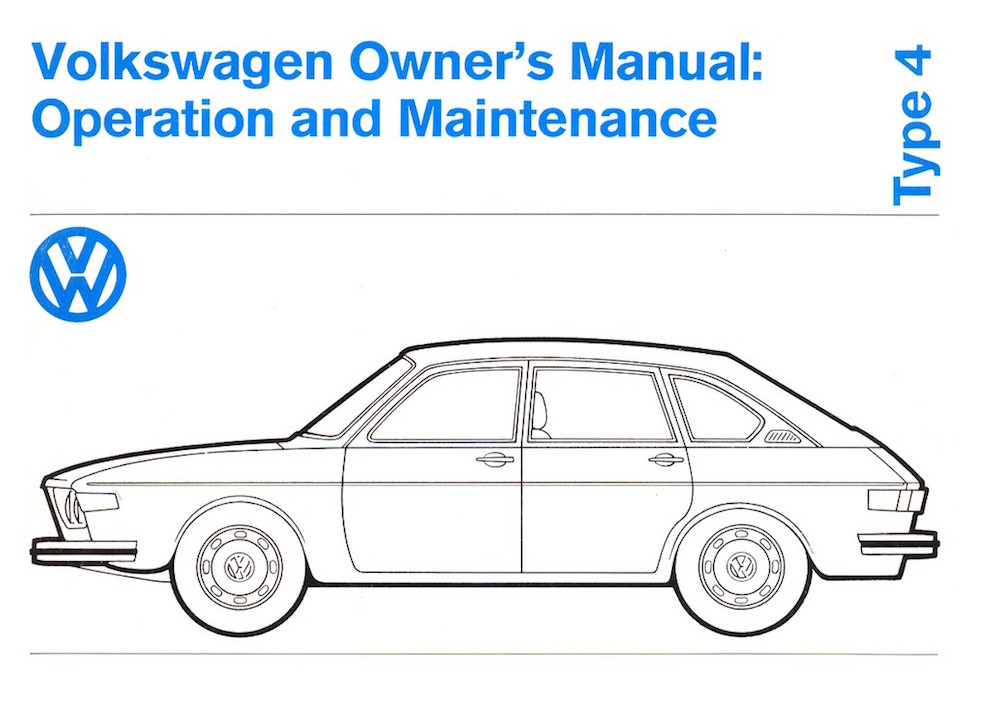 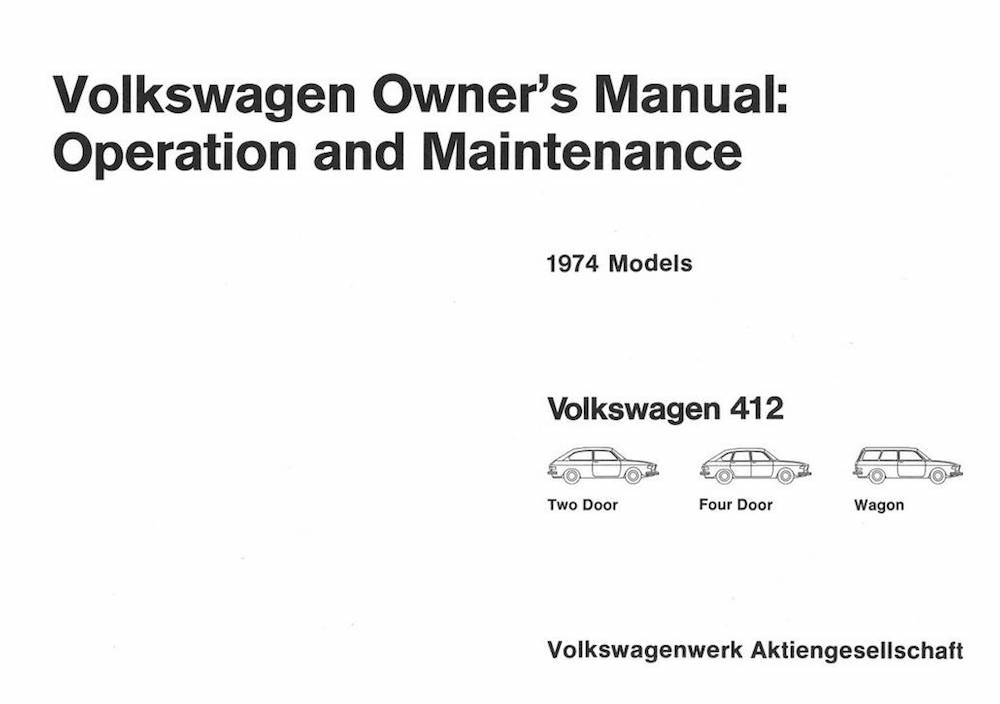 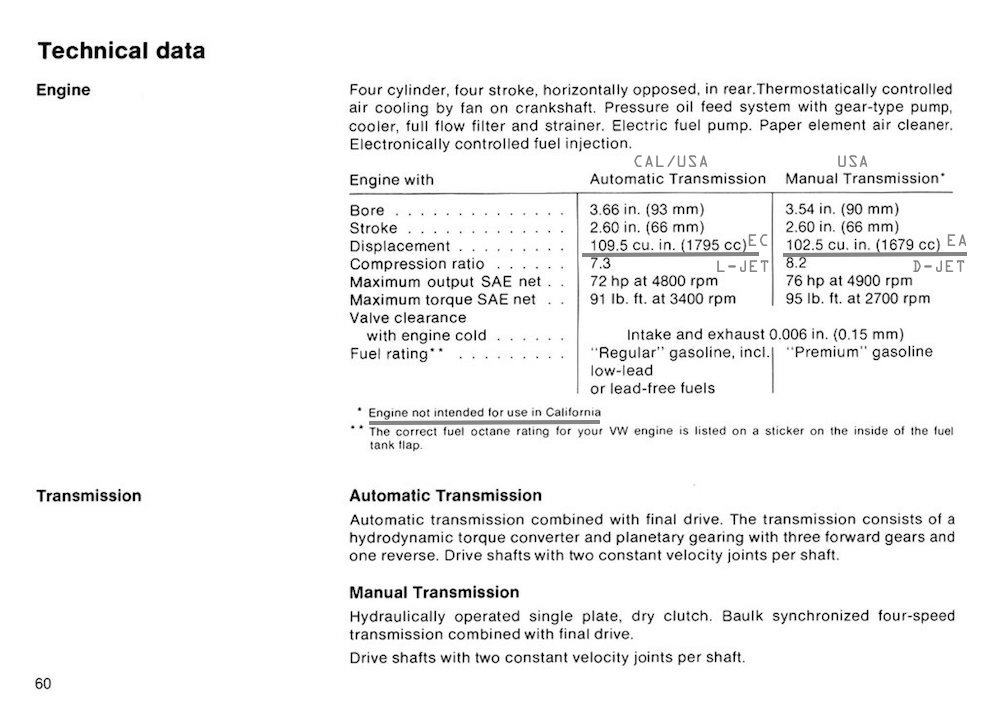 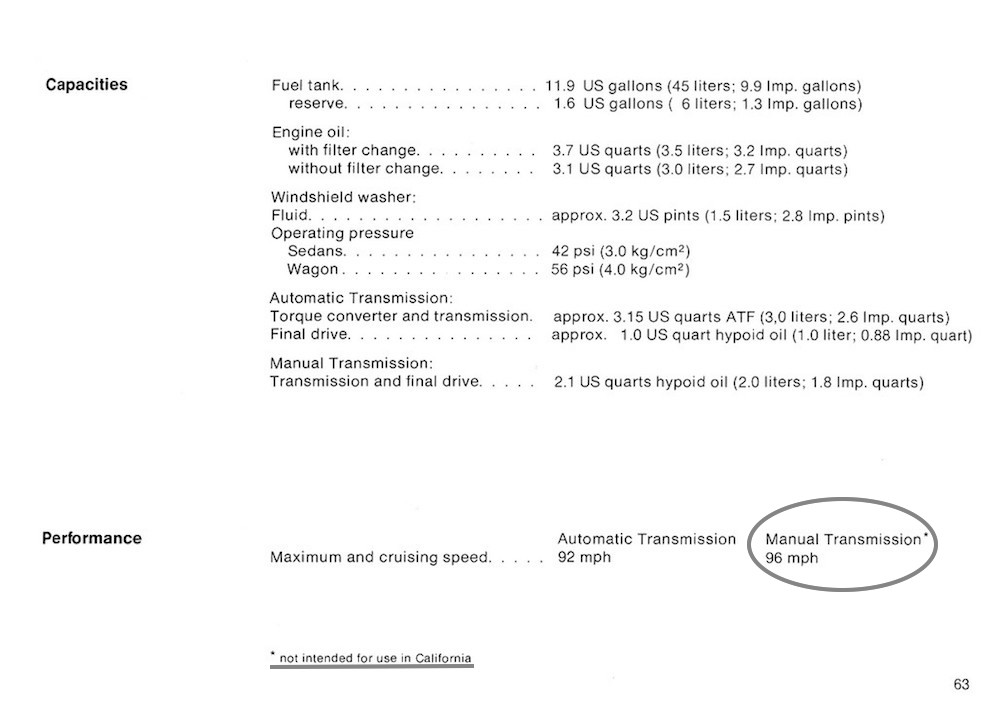 the EA engine was only available with M/T and only in 49 states. the sole model 412 sold in california was the F/A 412 with an EC engine. it is not clear if there were differences between the calif and 49 states F/A version. the calif version was fitted with EGR (ref CARB executive order A-7-5). the california version of the EC engine was called the EC-D. the 49 states version may have been the EC-C (i have found no information on that). VW could make a fully automatic car work with L-Jet EFI. Likely supply of EC L-jet engines was prioritised for the 412 model from the start of MY 74. if not VW had no F/A large sedan or wagon available for sale in california or the 49 states. Engines for 914s, on the information available appear to begin 2-3 months later in late Oct/early Nov 73. The 1.8 cars start rolling of the production line at that time. In Jan 1974, the ED engine - bus version of the 1.8L type 4 fitted with L-jet commenced. the L jet version is sold in california with M/T. In march 1974 the opel manta GT/E fitted with L jet commenced. The introduction of L jet is staged. First across three VW models and then to other manufacturers. The VW EC engine is the first engine to be fitted with L-jet. The 1974 914 1.8 is the second car to be fitted with L-jet. i have been mistaken for 30+ years claiming the 914 1.8 is the first car to be fitted with L jet. though the system on the car is the first version of L jet. (ref part # on AFM). |
| wonkipop |
 Dec 26 2021, 12:38 AM Dec 26 2021, 12:38 AM
Post
#15
|
|
Advanced Member     Group: Members Posts: 4,670 Joined: 6-May 20 From: north antarctica Member No.: 24,231 Region Association: NineFourteenerVille 
|
VAPOR EMISSIONS CONTROL SYSTEM.
(aka the charcoal canister or how it is plumbed). this has been debated previously. refer here. http://www.914world.com/bbs2/index.php?showtopic=347951 in summary owners of original condition 74 1.8s with the engine bay canister know it is plumbed in an arrangement contrary to some hose diagrams that have been published and in a manner contrary to 73 and earlier year 914s. --------------- the events of 1973 concerning the EPA case cast some light on the VECS (vapor emission control system). the design of the system incorporated in the 1970-73 914s is in principle the same as the system used by porsche for 911 models from 1969-73. 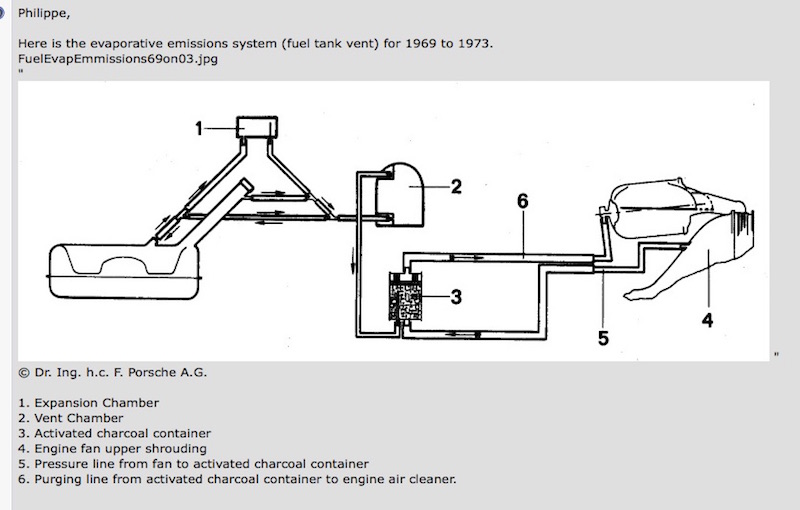 in 1973 for 1974-77 years porsche revised the system for its 911 models. 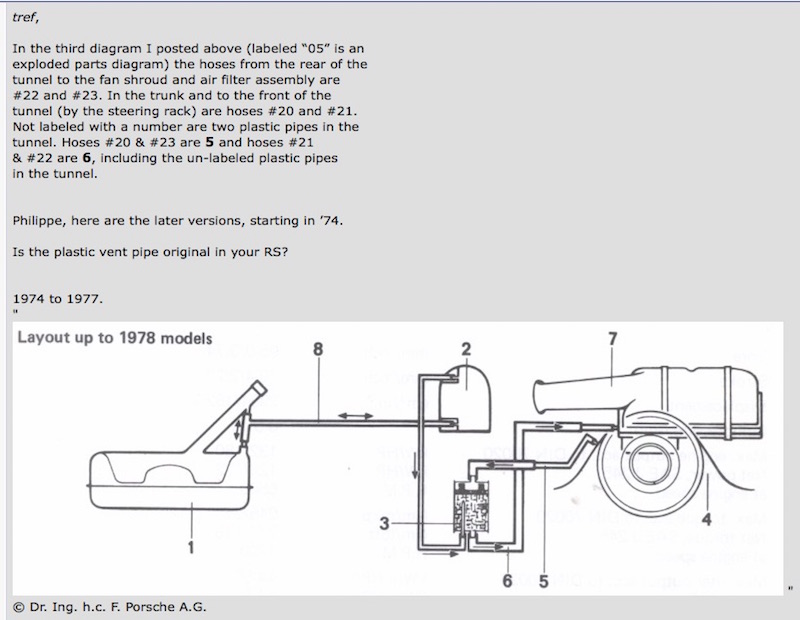 note - the element that is altered is that a different end of the can is connected to the fan feed line. -------------------- the schematic layout of the 1974 VECS is shown in the emissions warranty for the 1974 914 model. this emissions warranty came with a 1974 1.8 model. 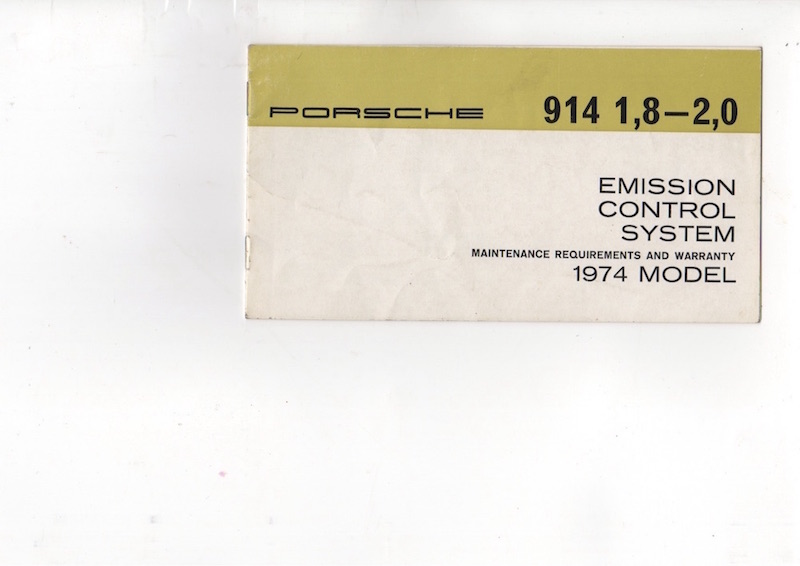 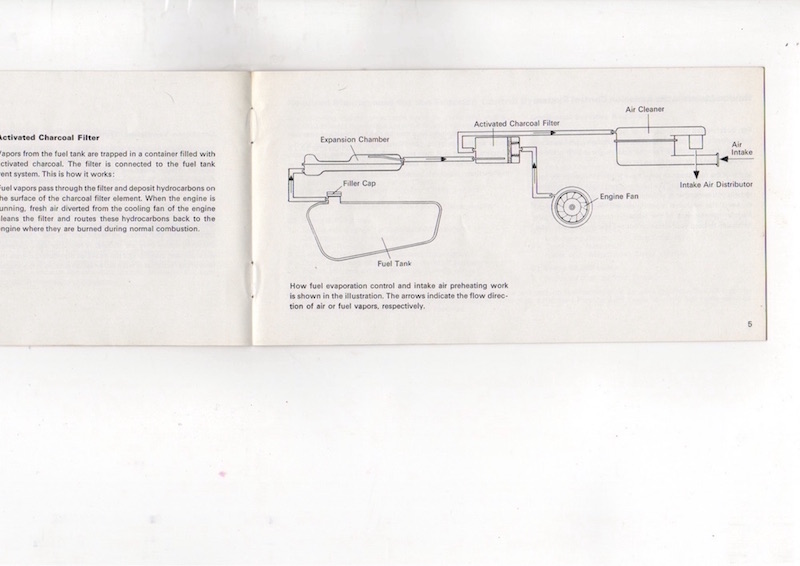 the plumbing of the 914 1.8 hoses is consistent with the update porsche carried out for its 911 models for 74 MY. ----------------------- the changes to the VECS that porsche introduced for the 74 MY across its range brought the system into line with VW designs for the VECS that had been in place since 1969. 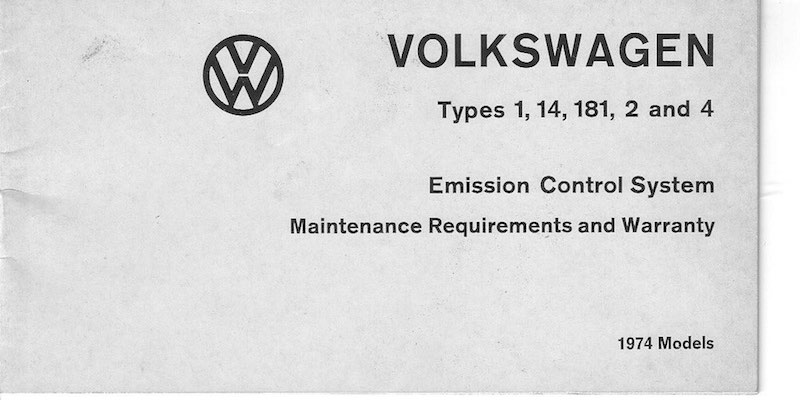 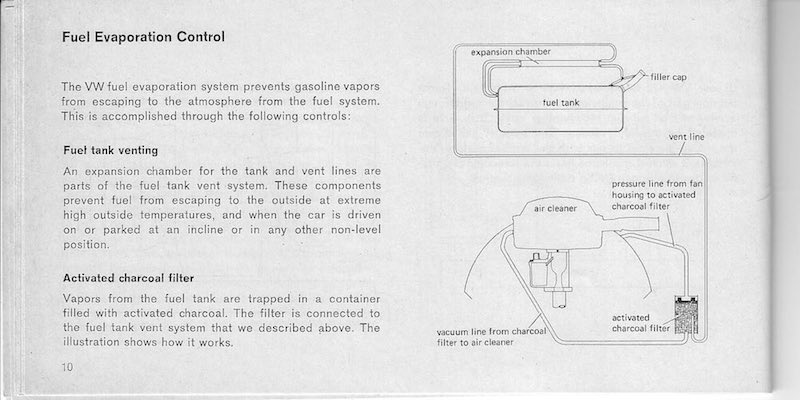 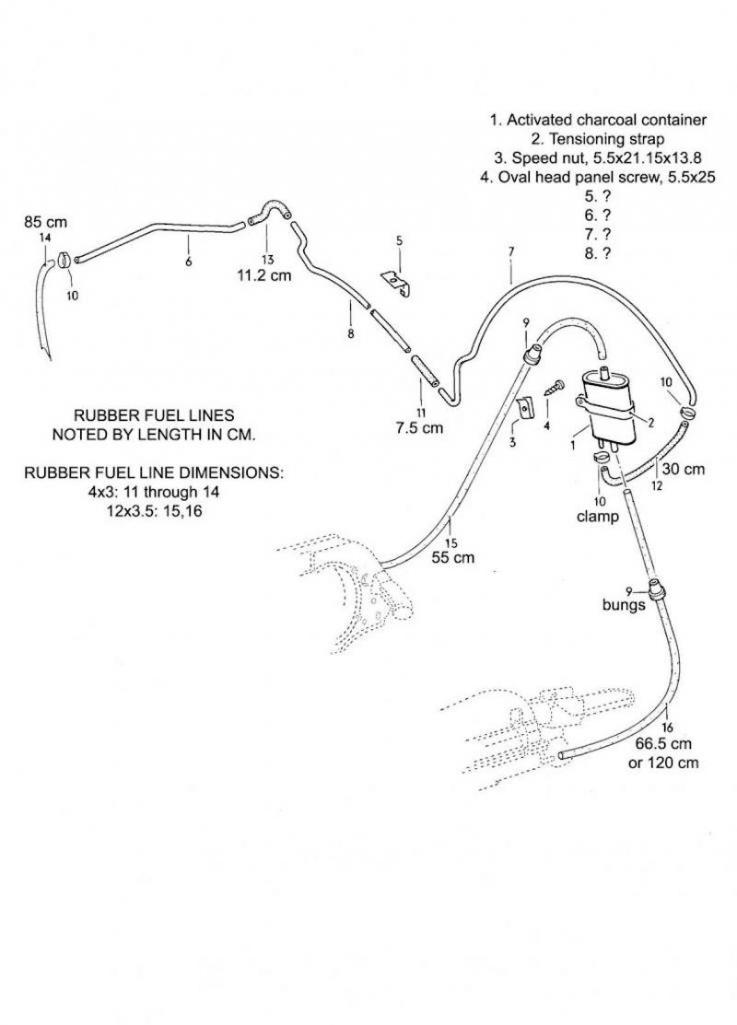 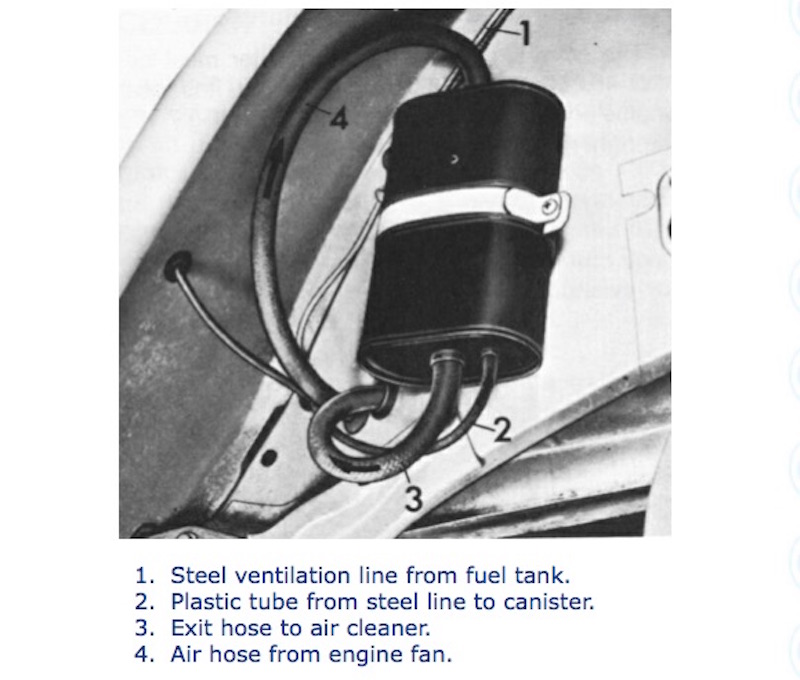 ------------------------- the original factory installed plumbing arrangement of the VECS in a 74 1.8 is characterised by an S-curved hose from the fan feed port on the fan housing to the lhs of the engine bay mounted charcoal canister. the rhs of the can is connected to the hose from the air cleaner and the fuel vapor line. 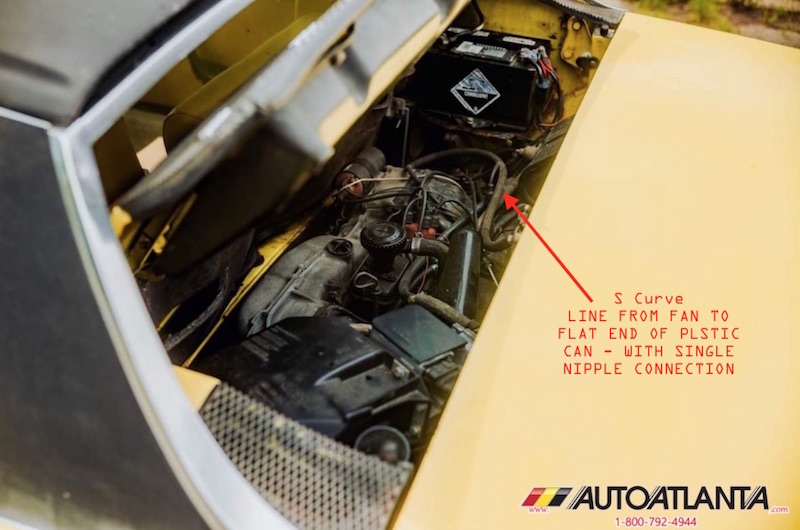 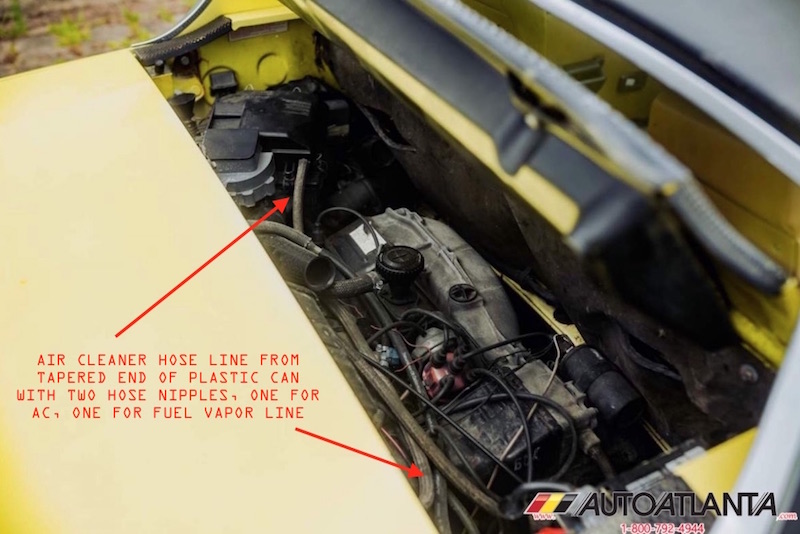 note - this is only known to apply to 1.8 cars with the engine bay canister location update. ---------------------------- the canister location update occurred between 20 Nov 73 and 28 Nov 73. (refer schedule 2 at beginning of thread). EDIT JUNE 2022. further example has come to light indicating changeover is either side of weekend 17/18 Nov 73. refer page 2 of this thread for information/data. cars before the update had the VECS cannister in the front trunk. 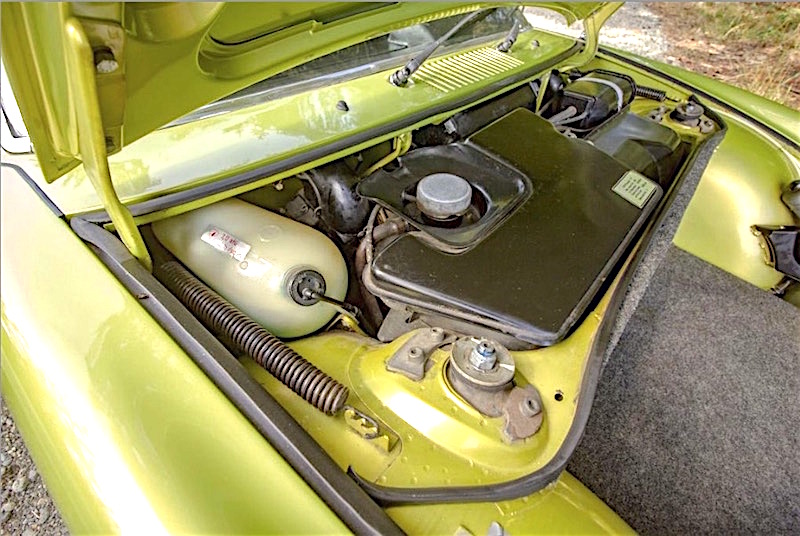 cars after the update had the canister in the engine bay. 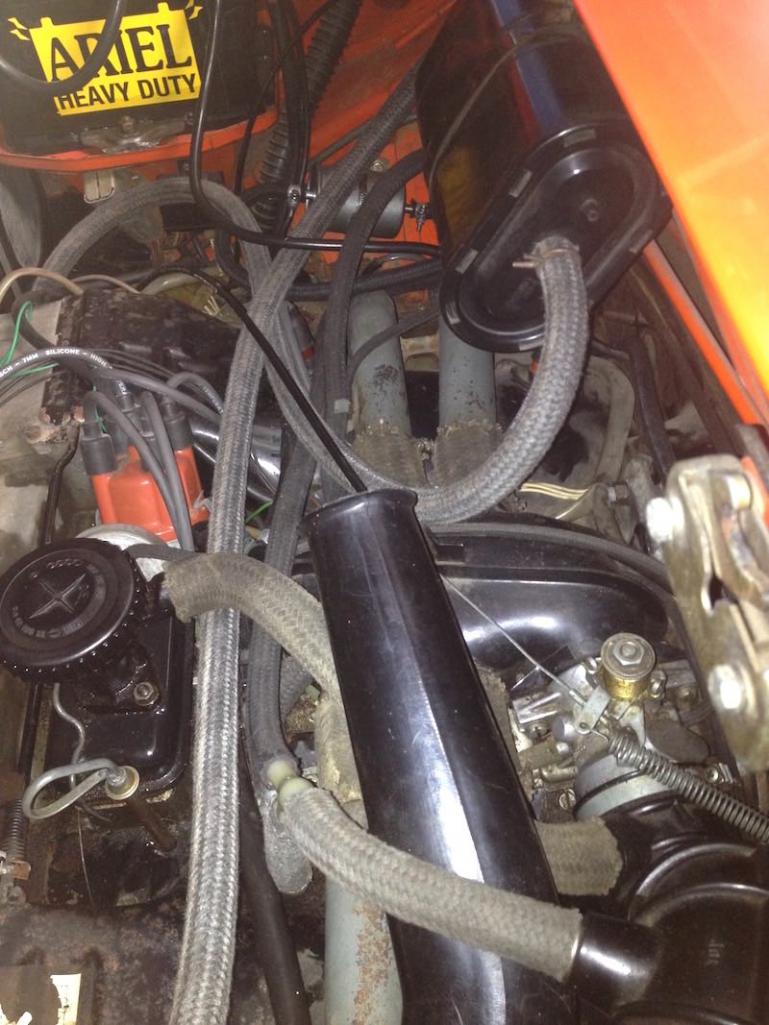 note - it has not been established how the front trunk mounted canisters were plumbed. the system may have conformed to the earlier porsche design for 69-73 MY cars. EDIT MAY 2022 - further data has been obtained which clarifies the plumbing layouts for the front trunk mounted canisters and the engine bay mounted canisters. This data has been entered on page 3 of this thread. the frunk mounted canisters used the Porsche design earlier version of hose hookup dating from 1970 MY on. the engine bay canisters used the VW design for the hose hook up from approx Nov 20 1973 on. ---------------------------- 1974 914 1.8 HOSE LAYOUTS. the engine hose layouts by Pete Klager and published on the Pelican Parts website are the most accurate diagrams. the diagrams are for the 1975 1.8 EC-b (california version). 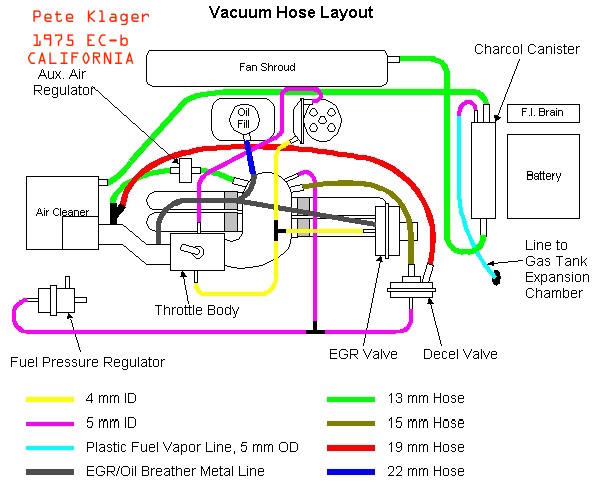 note - for the 1974 EC-B engine the EGR is deleted (along with T connection to dist-T/B vacuum advance line). the position of the charcoal can is on the rear bulkhead of the engine bay instead of next to the battery but with the plumbing arrangement shown. for the 1974 EC-A engine as above for EC-B, but additionally the vacuum line connecting the dist-T/B advance line is disconnected at the T/B. the T/B either does not have a vac advance port or the port is capped with a seal. the hose from the advance port on the distributor is tucked under the distributor and left open. this has also been previously explained by Dave Darling more than 10 years ago. DD noted there were two versions of the hose layout for L-Jets. at that time DD had not made a connection between the layouts and the emission stickers indicating either EC-A or EC-B or that the engines may have been sales market determined variations. EDIT JUNE 2022 final hose layouts for 1974 EC-A/EC-B are posted on page 3 of this thread. ------------- EC-A v EC-B in principle it was (is) very simple to turn an EC-A engine into an EC-B engine. simply connect the vacuum advance hose from the vac advance can on the distributor to the vac advance port on the throttle body (assuming the throttle body has a port). and in reverse to alter an EC-B into an EC-A. this may have been porsche and vw intention with the ambiguous emission sticker that stated both versions were USEPA and California conforming. the adjustment may have been an easy matter for dealers to carry out (if the EC-A was fitted with a throttle body that had only a cap seal on the port). it may have been a strategy to provide flexibility in terms of stocks of cars available for sale across the USA including California. given the delayed introduction of the 1.8 which did not it appears commence production until Nov 1973. it is unclear how this would have worked in terms of annual emissions tests on vehicles. CARB documentation implies that testers would technically have only had approval for EC-A stickered cars. ? |
| wonkipop |
 Dec 26 2021, 04:02 PM Dec 26 2021, 04:02 PM
Post
#16
|
|
Advanced Member     Group: Members Posts: 4,670 Joined: 6-May 20 From: north antarctica Member No.: 24,231 Region Association: NineFourteenerVille 
|
revising comments welcome.
further documented 1.8 information welcome. esp information re paint stamp numbers on engines. (IMG:style_emoticons/default/beerchug.gif) |
| StarBear |
 Dec 26 2021, 08:07 PM Dec 26 2021, 08:07 PM
Post
#17
|
|
Advanced Member     Group: Members Posts: 2,085 Joined: 2-September 09 From: NJ Member No.: 10,753 Region Association: North East States 
|
Destined to be a classic (though imho it already is)!
Well done mr @wonkipop ! (IMG:style_emoticons/default/first.gif) |
| wonkipop |
 Dec 27 2021, 04:54 PM Dec 27 2021, 04:54 PM
Post
#18
|
|
Advanced Member     Group: Members Posts: 4,670 Joined: 6-May 20 From: north antarctica Member No.: 24,231 Region Association: NineFourteenerVille 
|
post script
@StarBear of course the 1.8 is a classic. the only 4 cylinder 914 in the porsche museum. (IMG:style_emoticons/default/rolleyes.gif) @Arno914 a treat for you. (IMG:style_emoticons/default/beerchug.gif) along the way researching stumbled on a high res image of engine in 74 1.8 in porsche museum. twin carb AN. hoped i might be able to read a paint stamp # on it, but no cigar. other interesting details. tune up sticker = advance hose only/set timing with hose on. oil filler cap as per earlier 1.7 EA engine, not like the L jet cap. might write to the porsche museum and see if i ask nice enough if they can tell us if it does have a painted # on the tin/what it is. if my guess about numbers is right there were 2 for AN in 74. could be either 608/609 or 602/603? its a no gauge/console car. 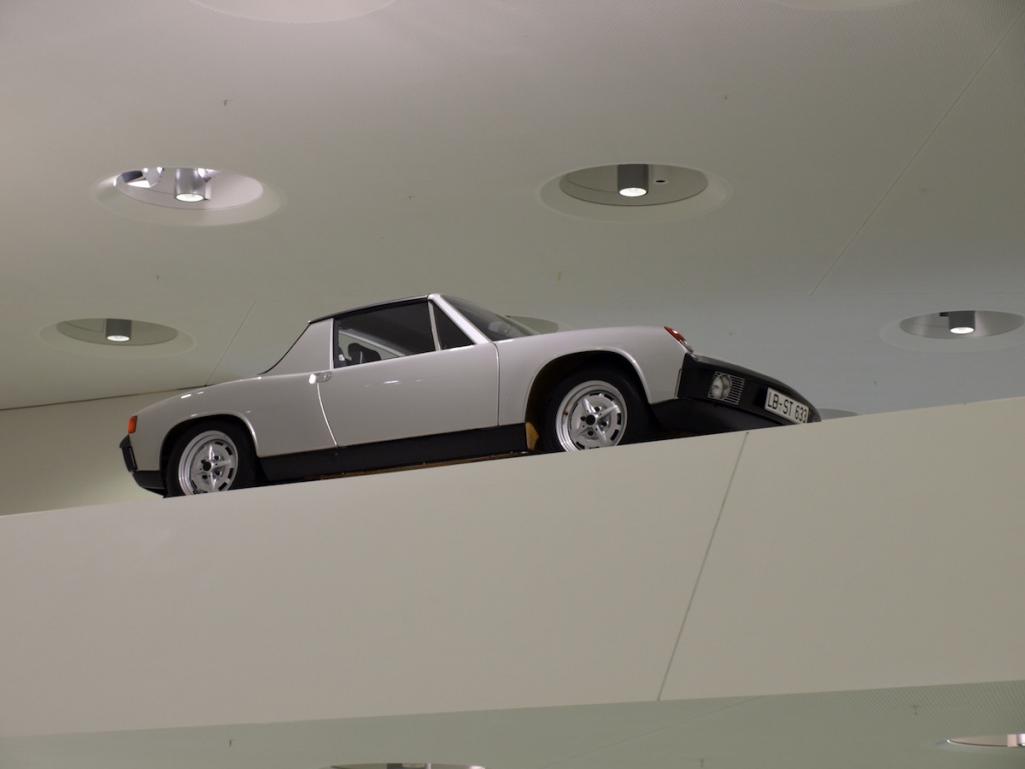 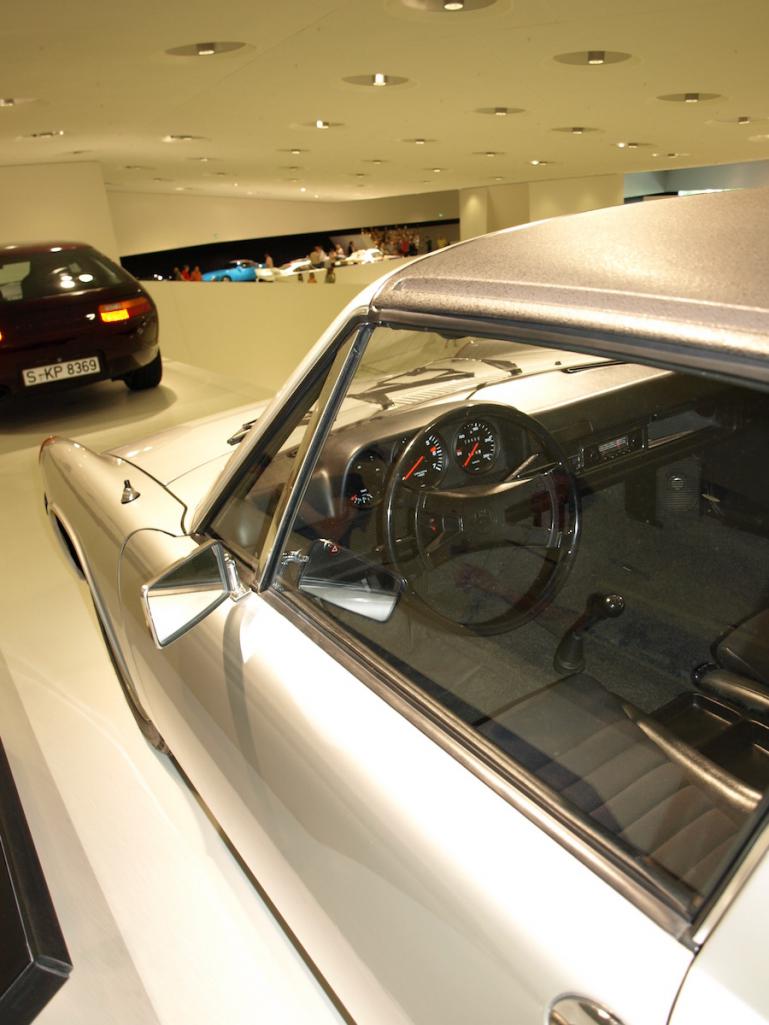 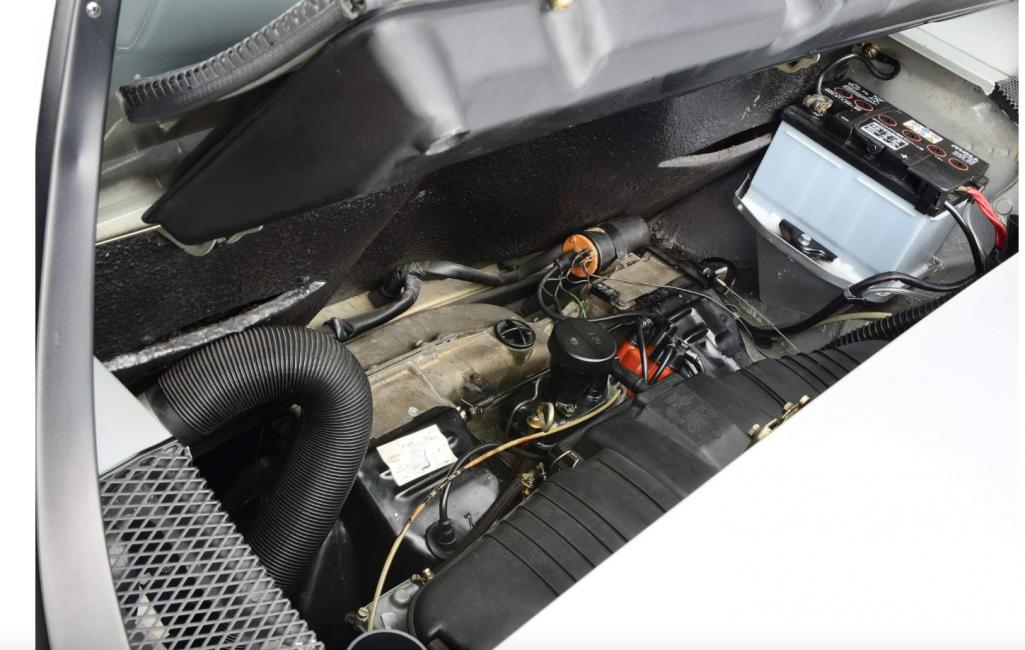 |
| Van B |
 Dec 29 2021, 02:00 PM Dec 29 2021, 02:00 PM
Post
#19
|
|
Senior Member    Group: Members Posts: 1,618 Joined: 20-October 21 From: WR, GA Member No.: 26,011 Region Association: None 
|
Anyone else notice that hellhole rust on the museum car lol?!
I agree that this will be a lasting resource for understanding the peculiarities of this very first L-Jet that defined the next 20yrs of German cars. |
| wonkipop |
 Dec 29 2021, 03:57 PM Dec 29 2021, 03:57 PM
Post
#20
|
|
Advanced Member     Group: Members Posts: 4,670 Joined: 6-May 20 From: north antarctica Member No.: 24,231 Region Association: NineFourteenerVille 
|
Anyone else notice that hellhole rust on the museum car lol?! (IMG:style_emoticons/default/laugh.gif) bubbling up there with no ECU to hide it. ----- did an engine count from parts catalogue for 75 euro 1.8s. 101 made. (engine was not in anything else VW sold that year - easy to do the numbers). couldn't do same for 74 - engine shared with some euro VW 412s. but its maybe not much different. makes a 75 euro 914 1.8 rarer than LEs? (IMG:style_emoticons/default/stirthepot.gif) |
  |
1 User(s) are reading this topic (1 Guests and 0 Anonymous Users)
0 Members:

|
Lo-Fi Version | Time is now: 26th December 2024 - 07:33 PM |
Invision Power Board
v9.1.4 © 2024 IPS, Inc.








